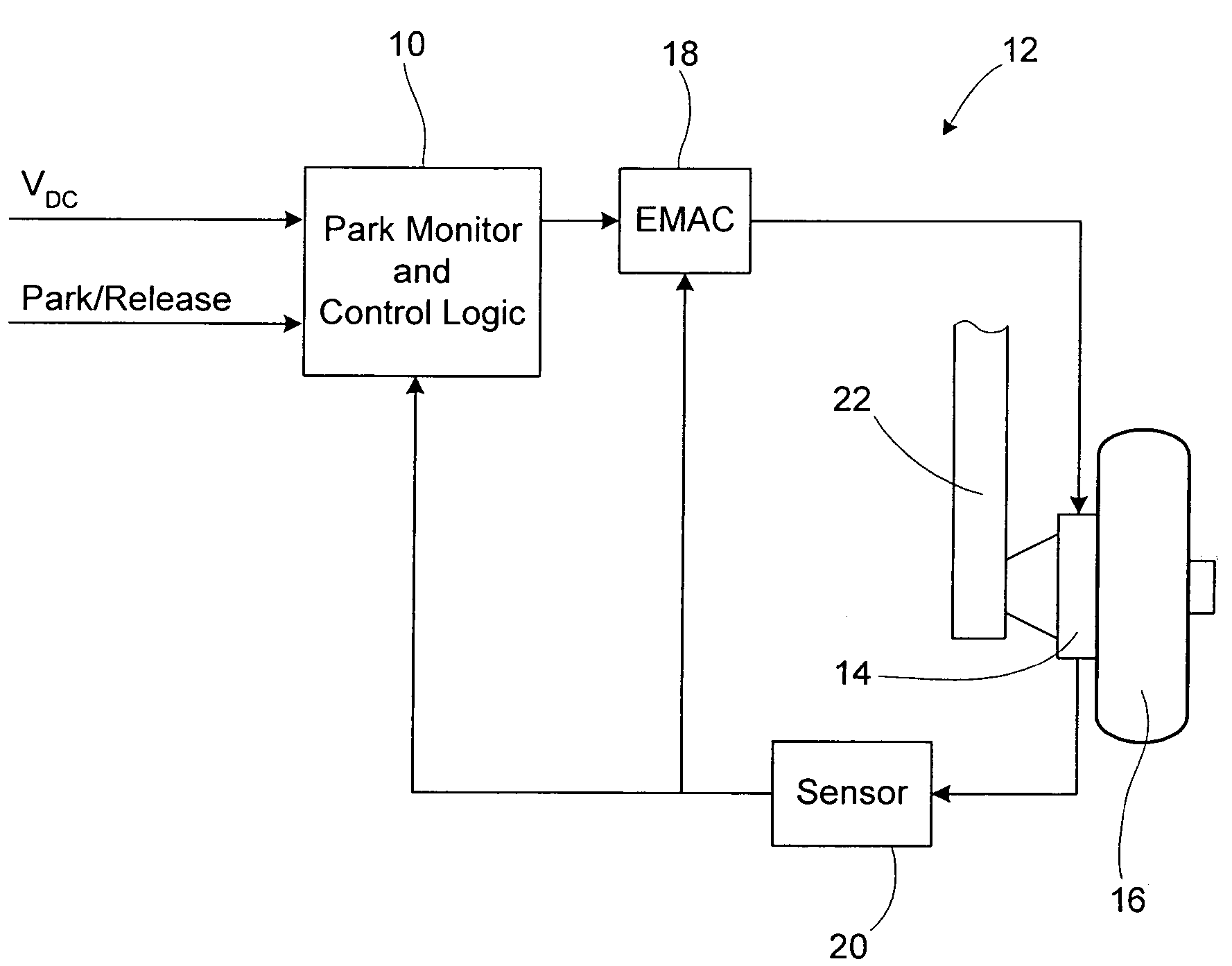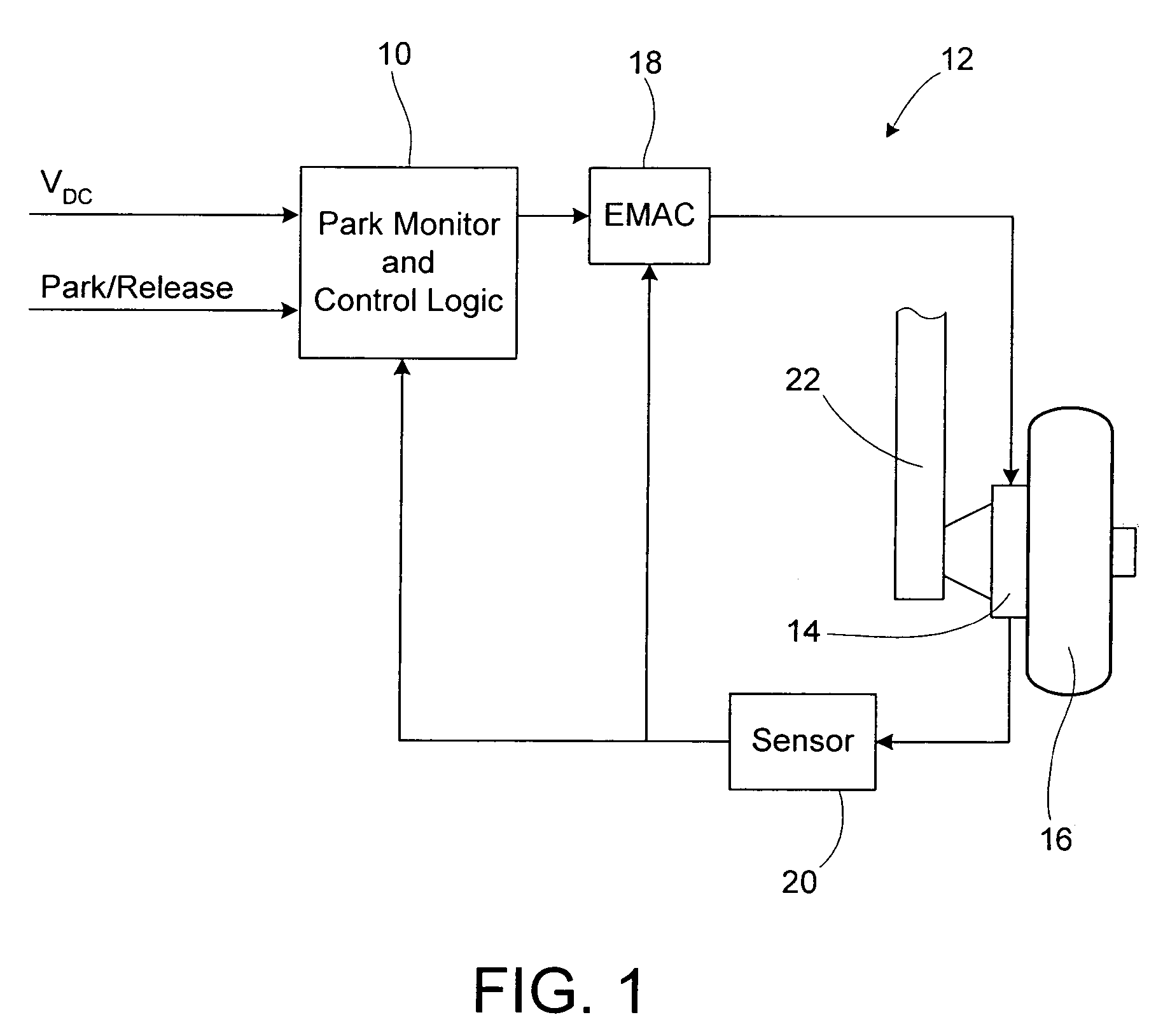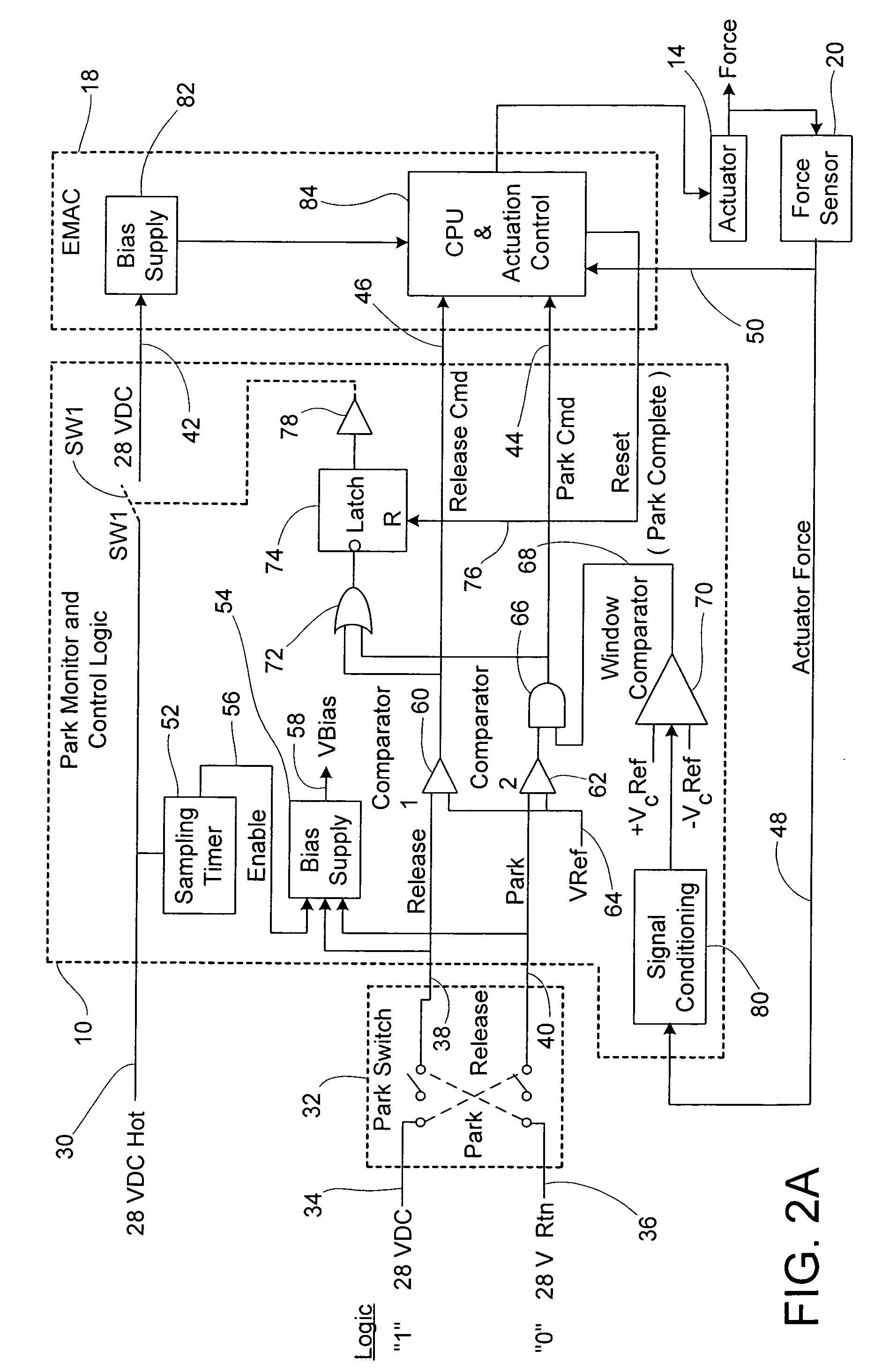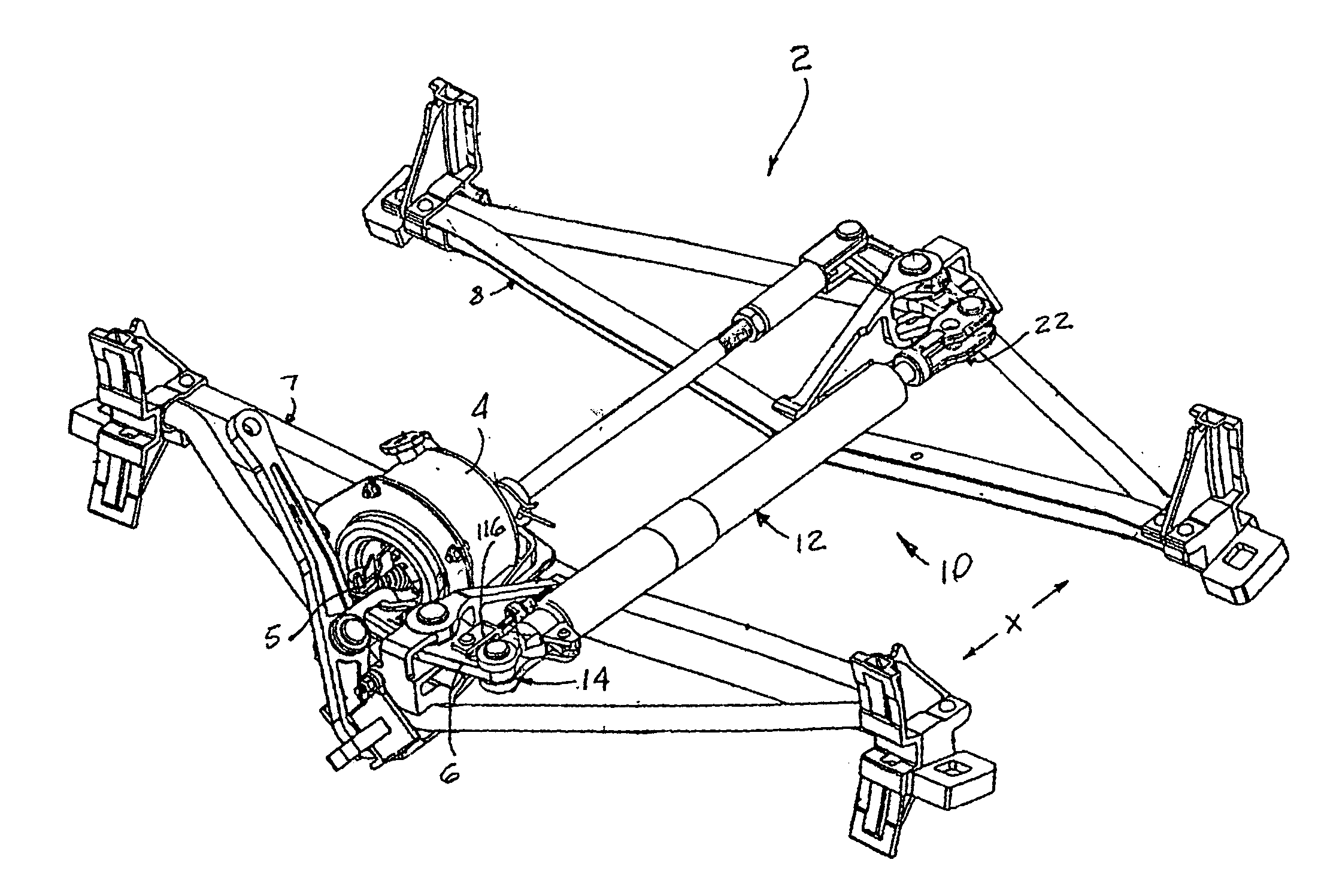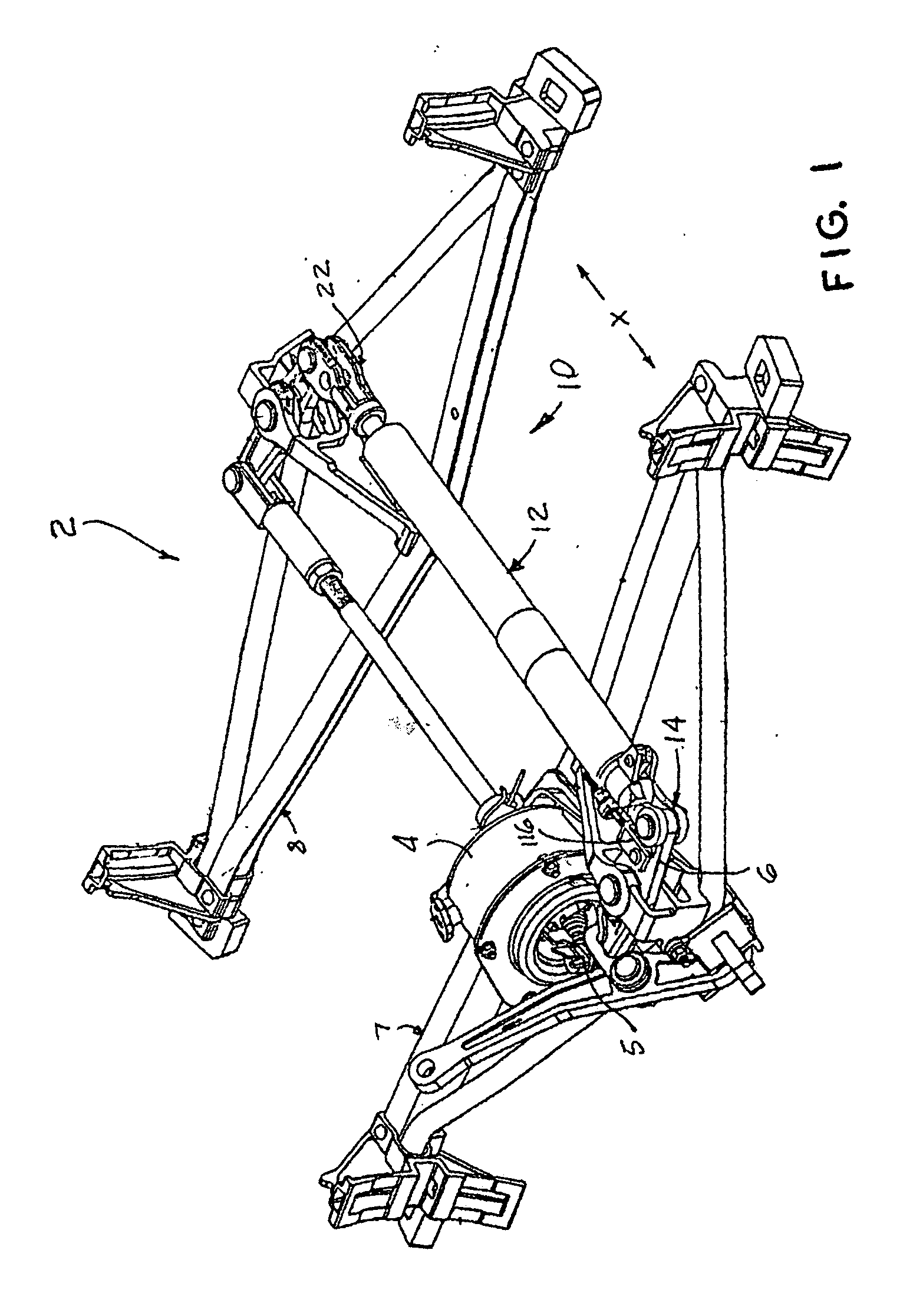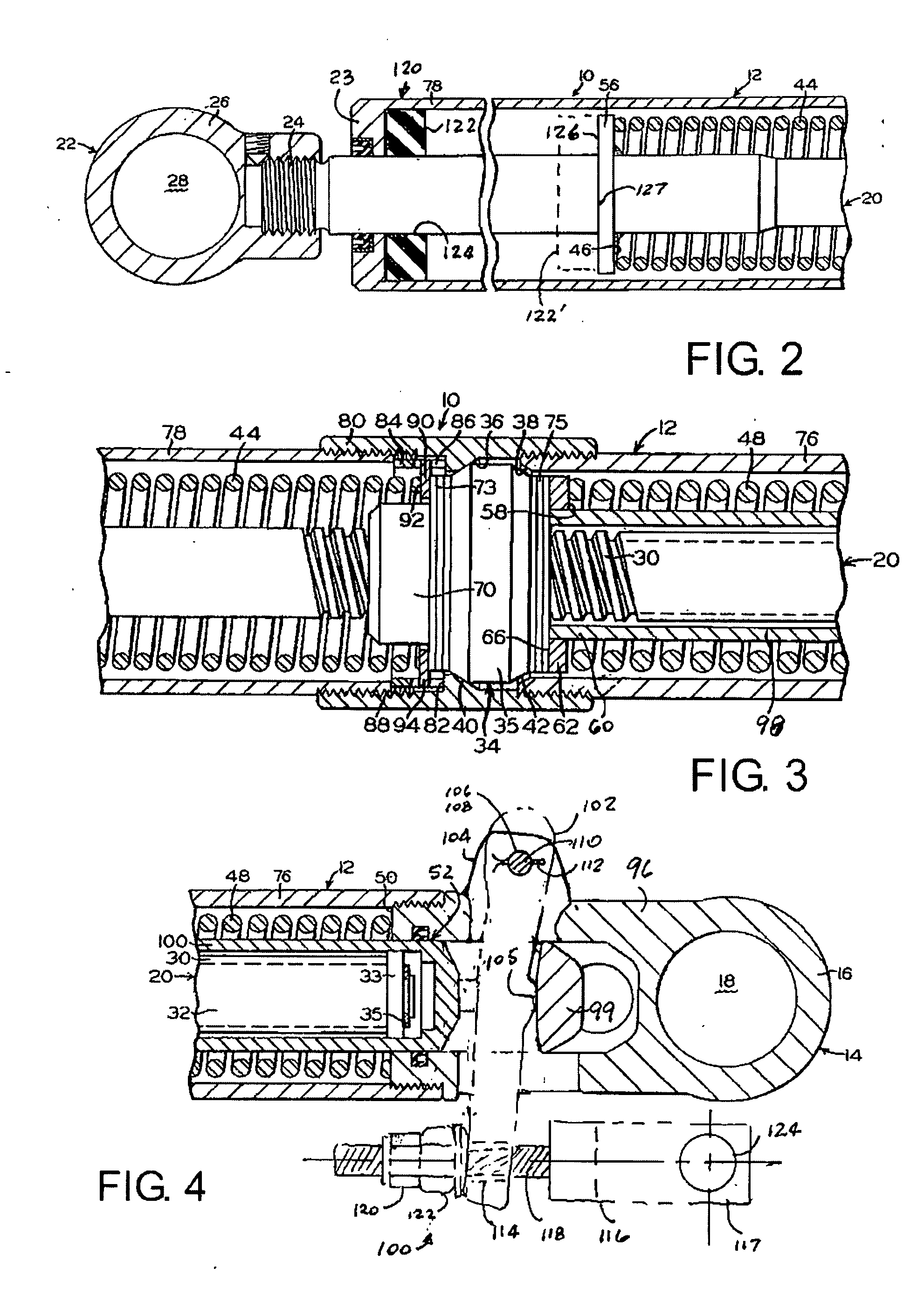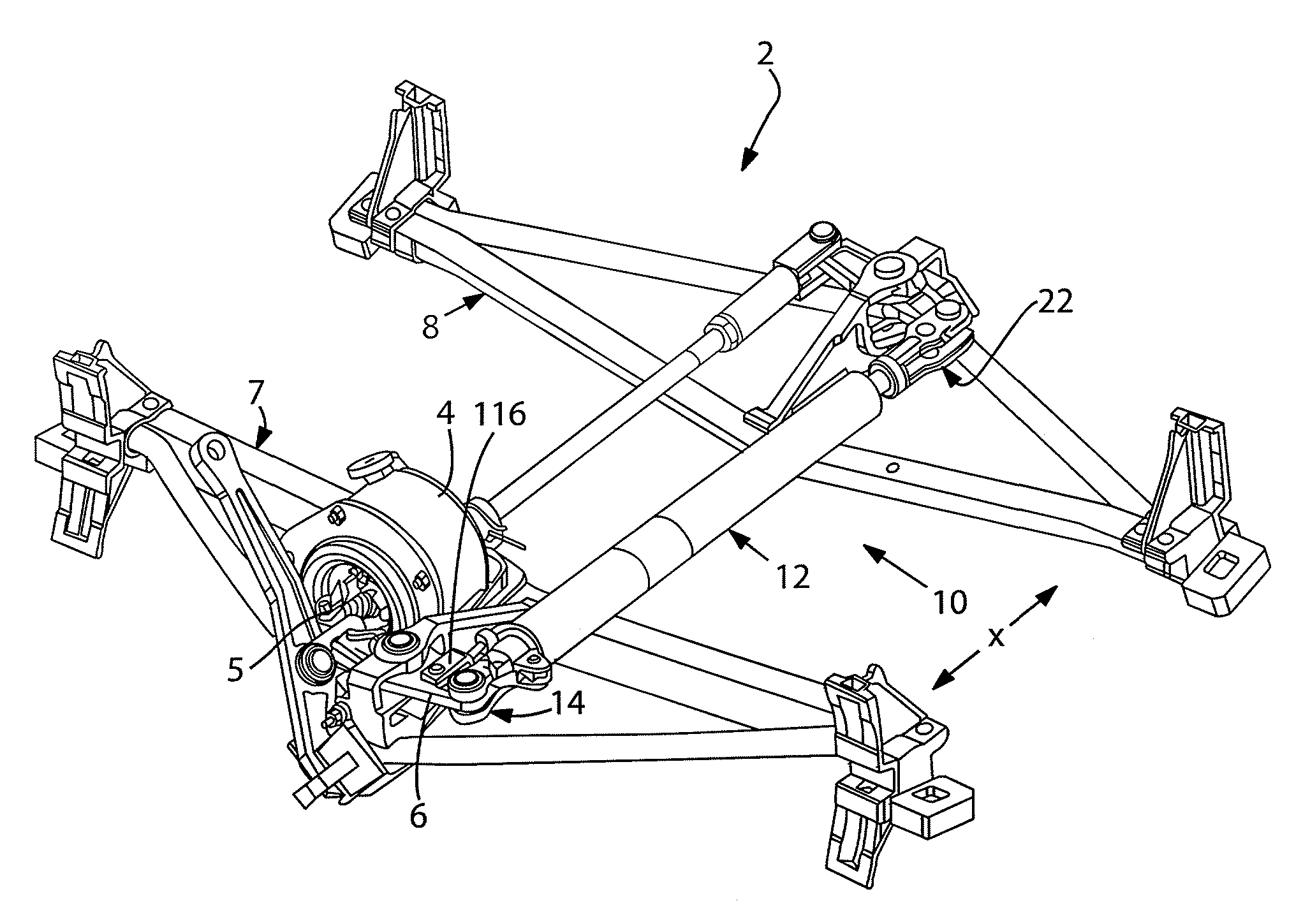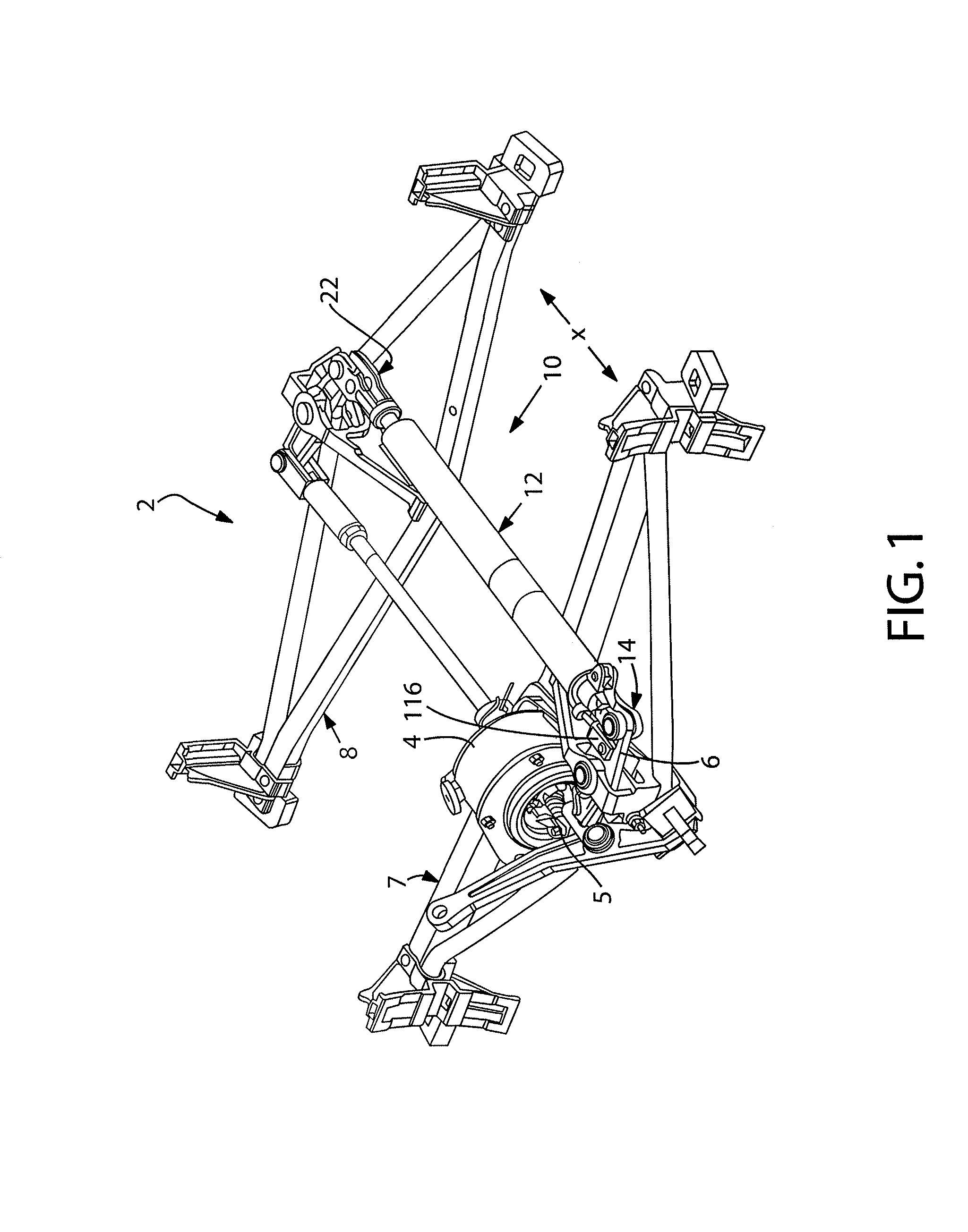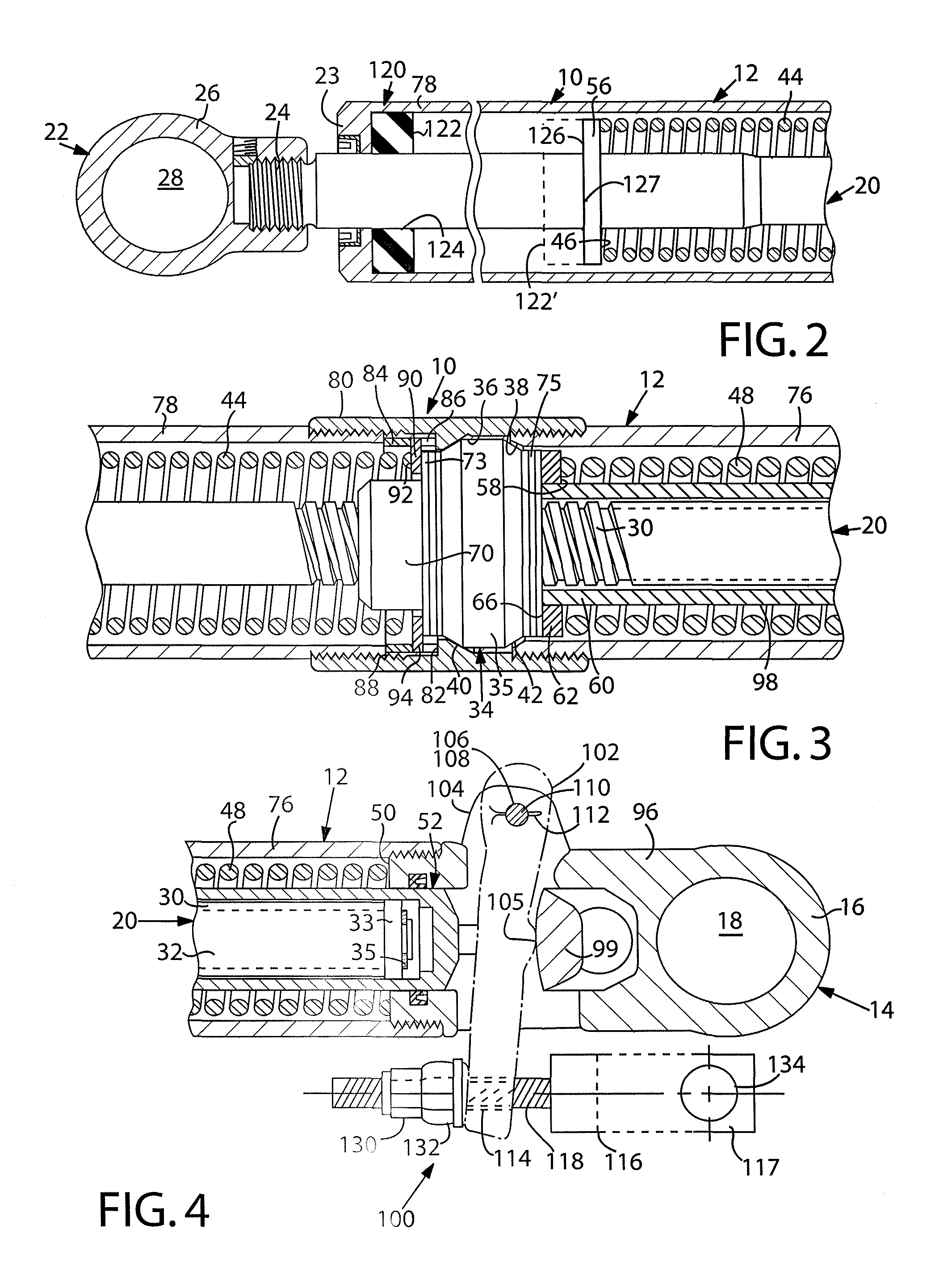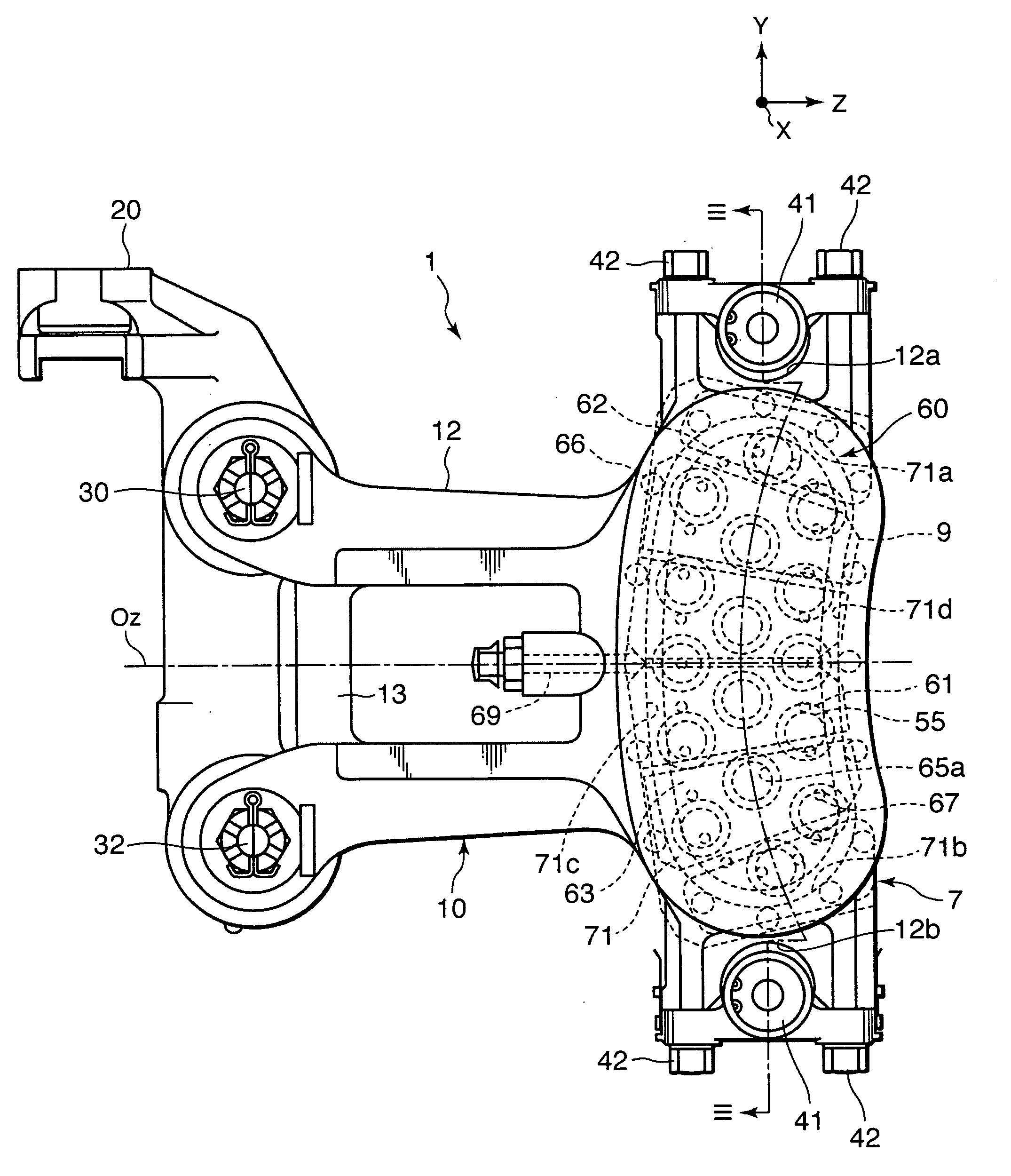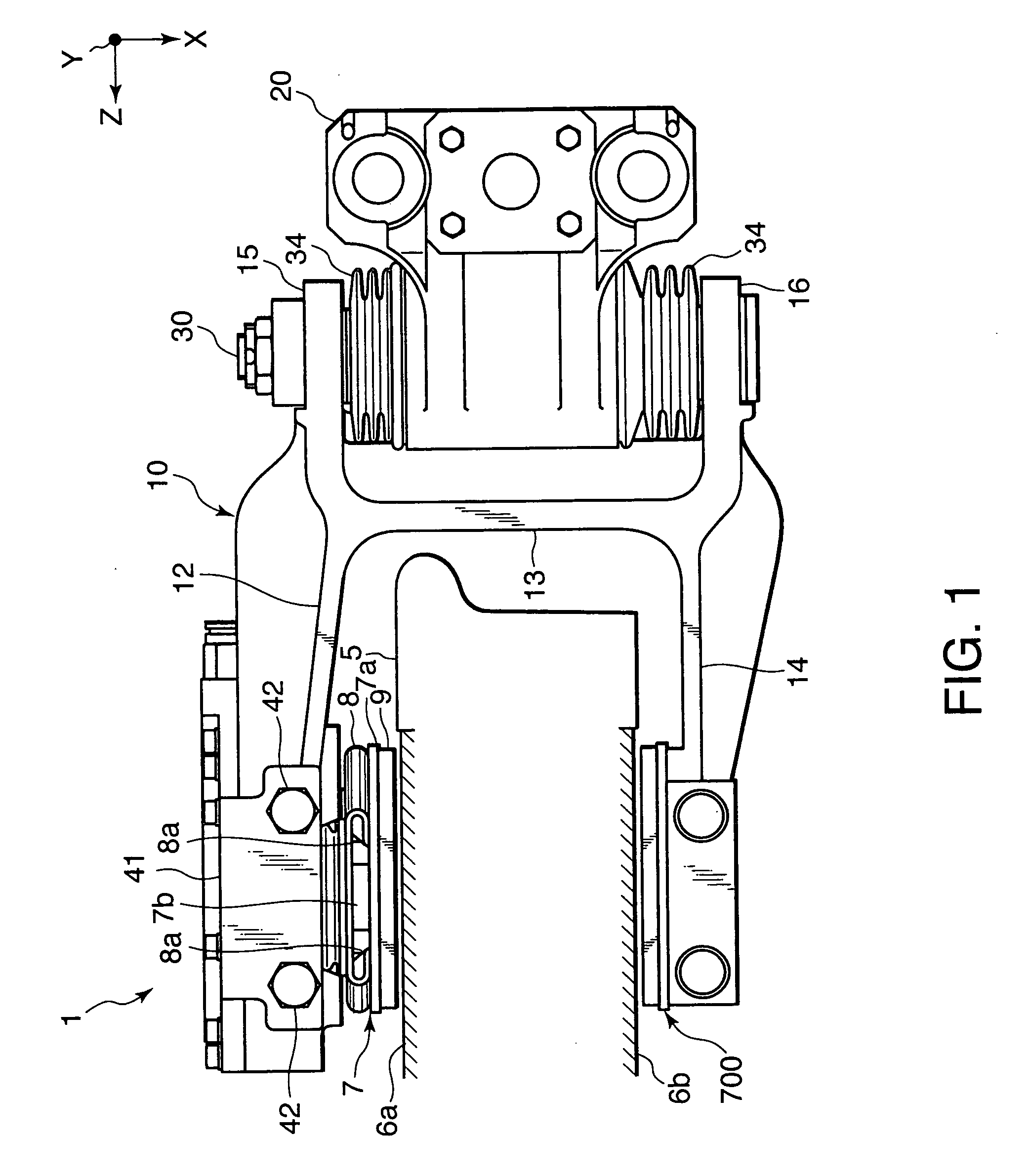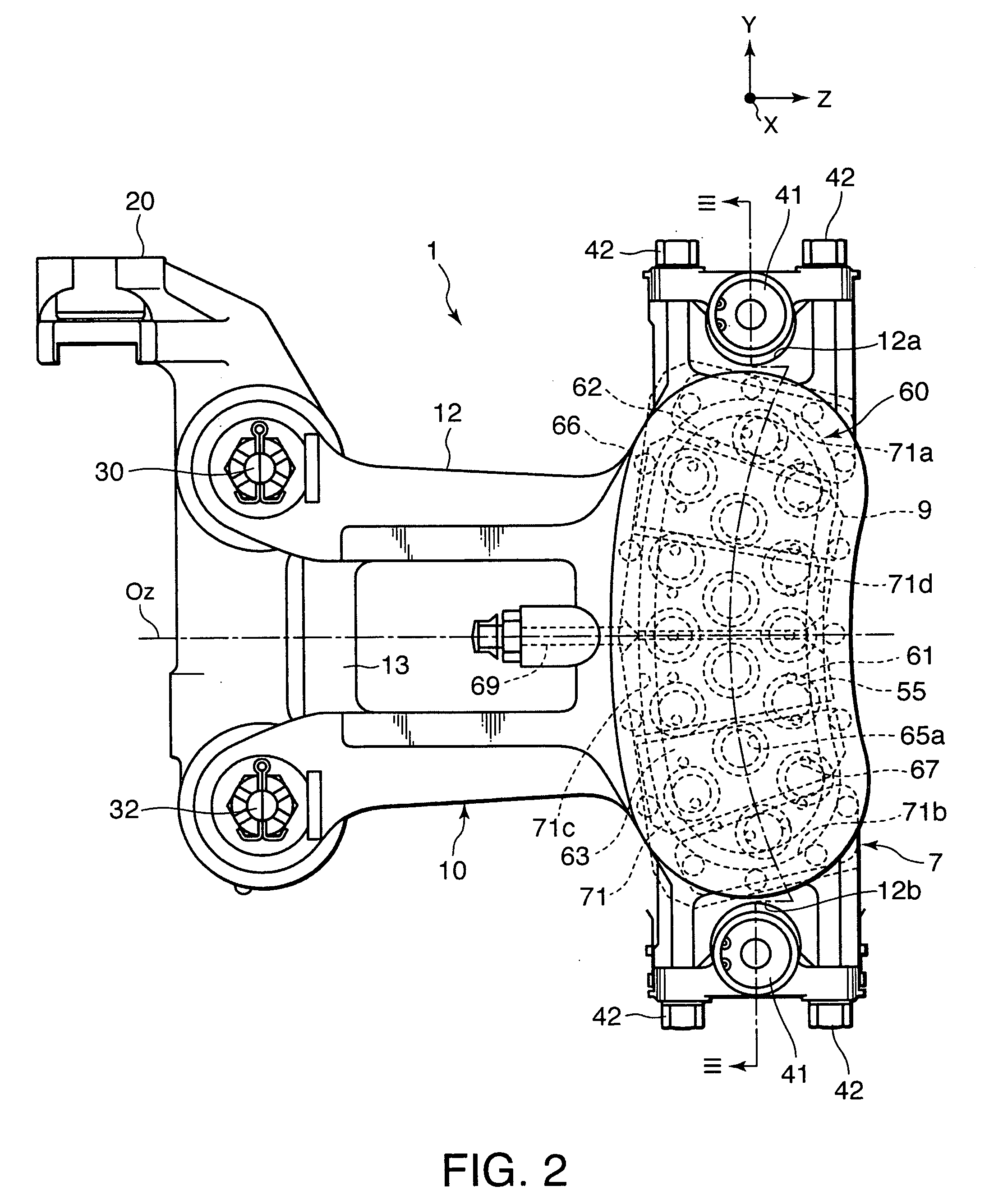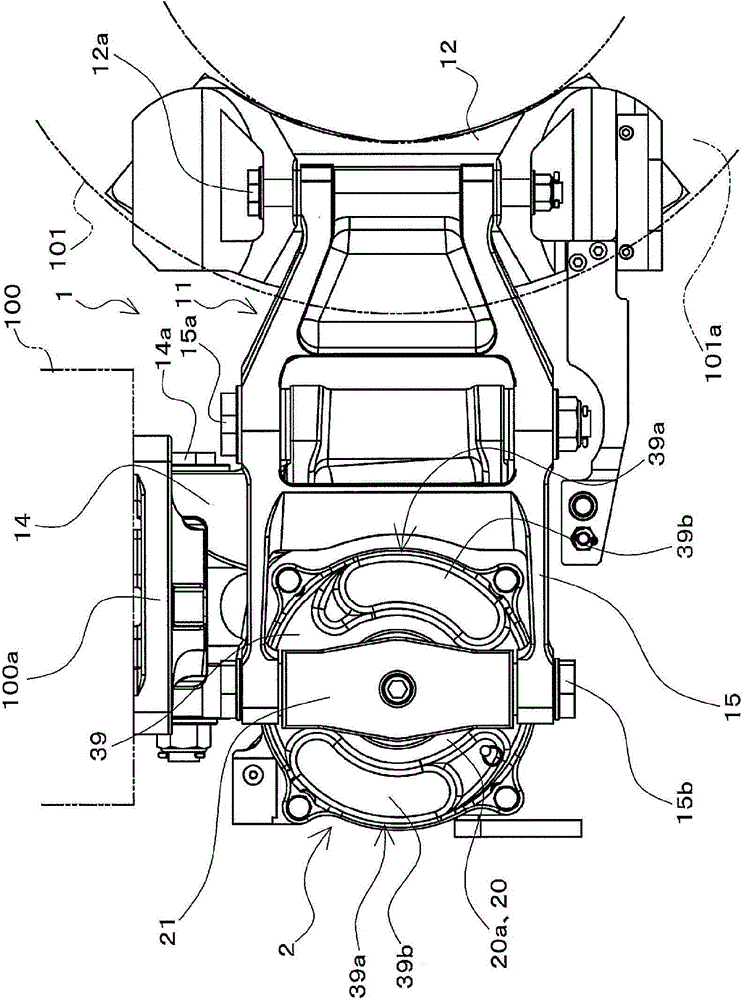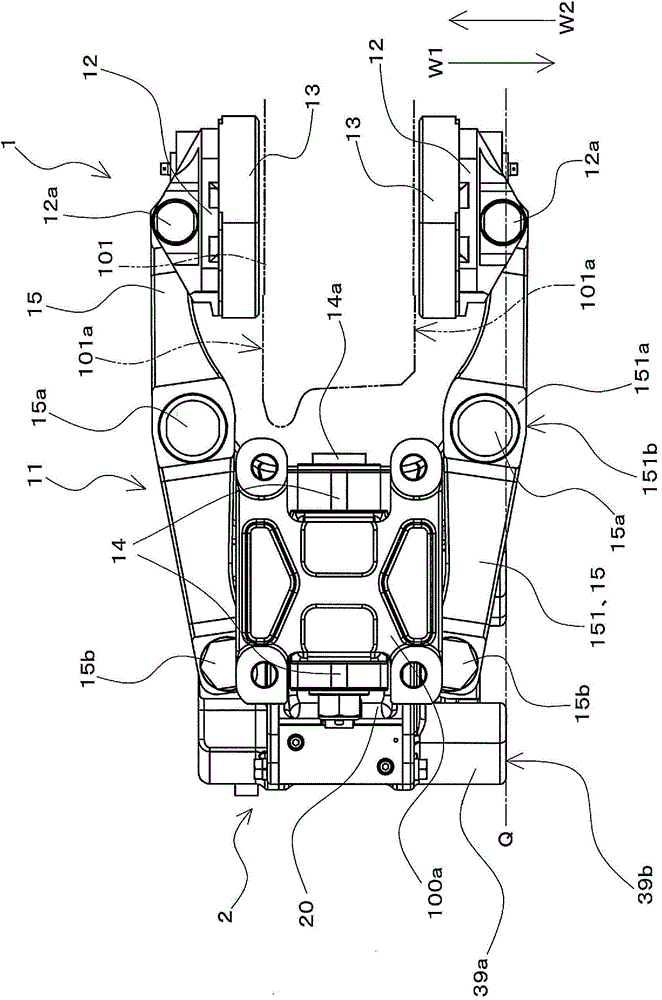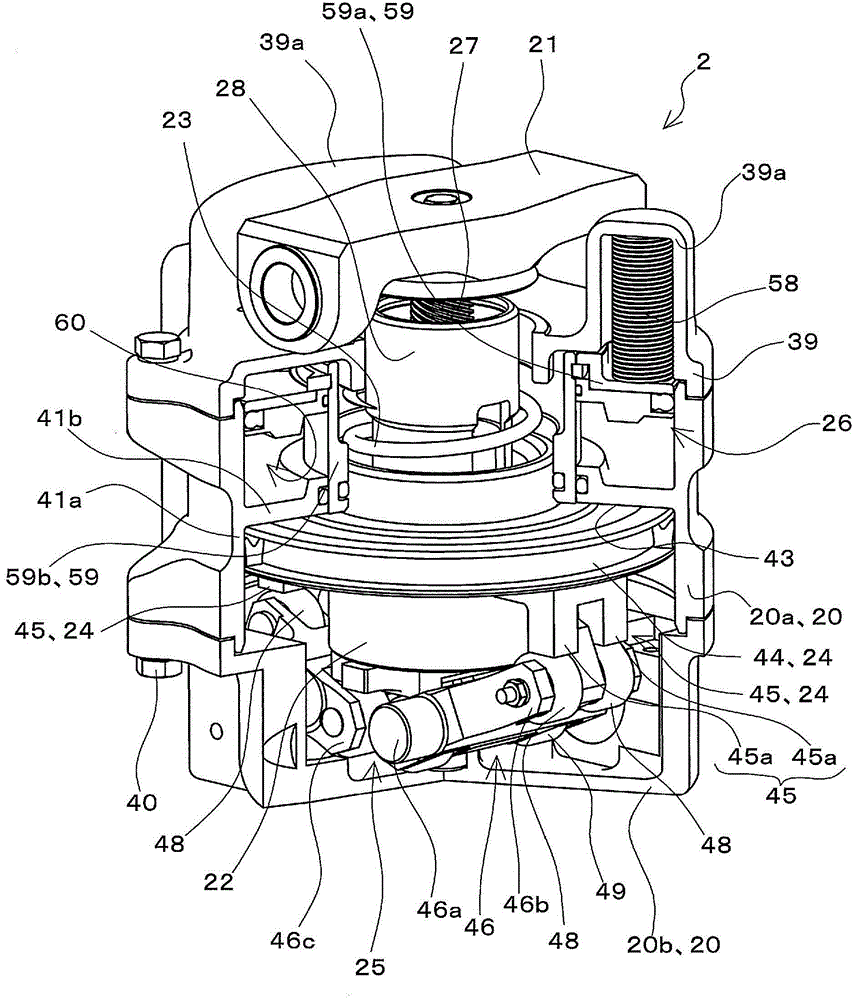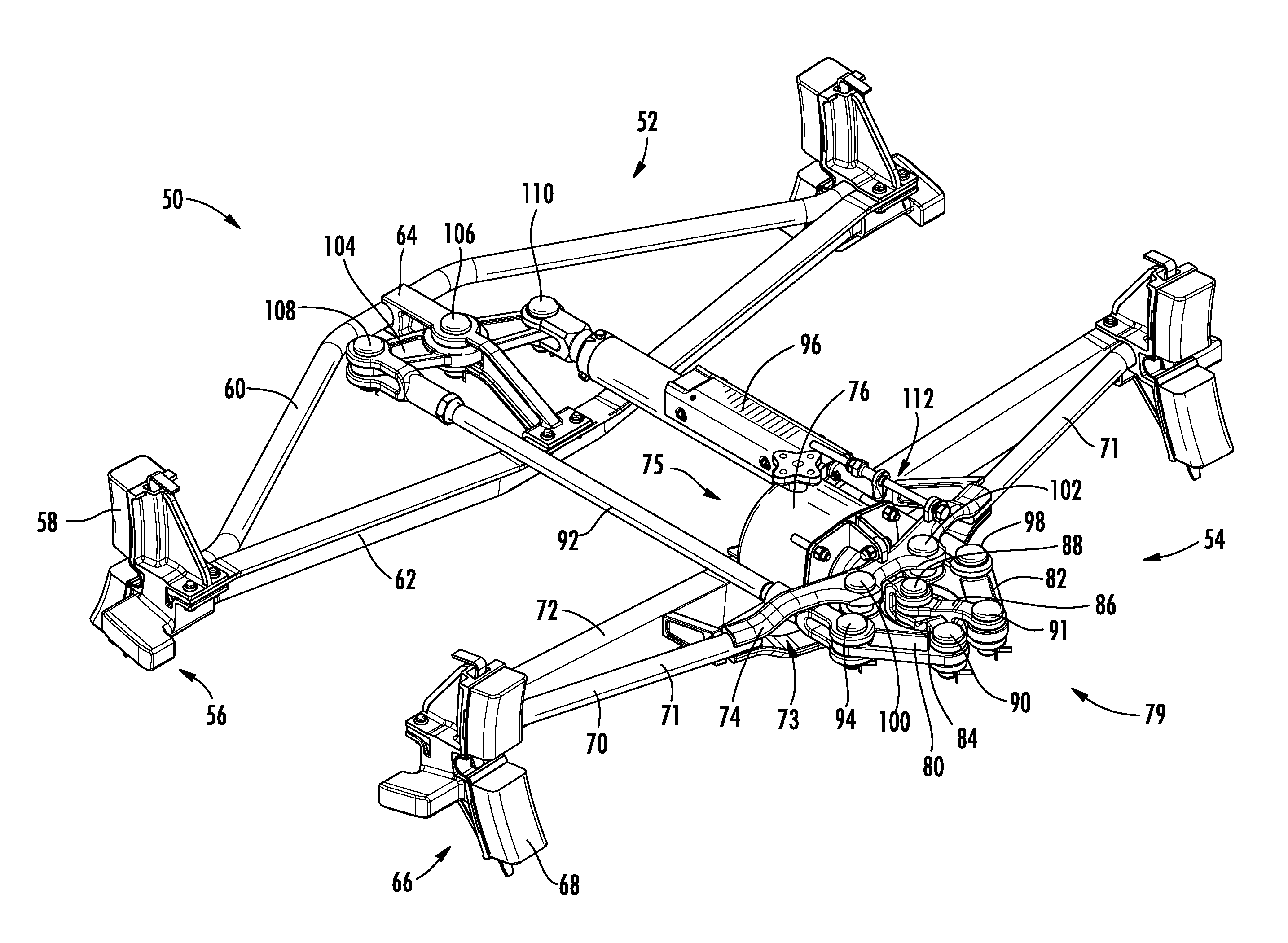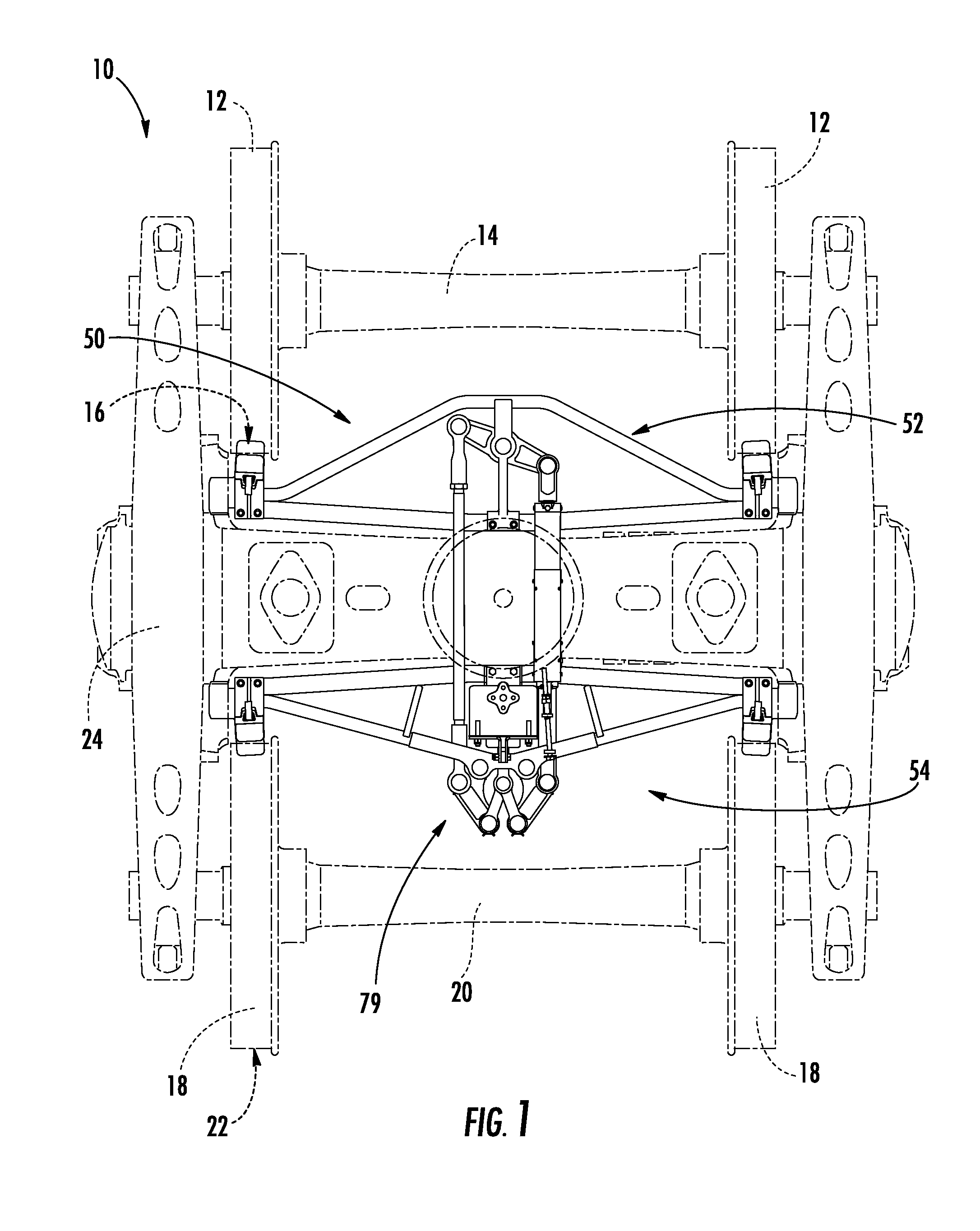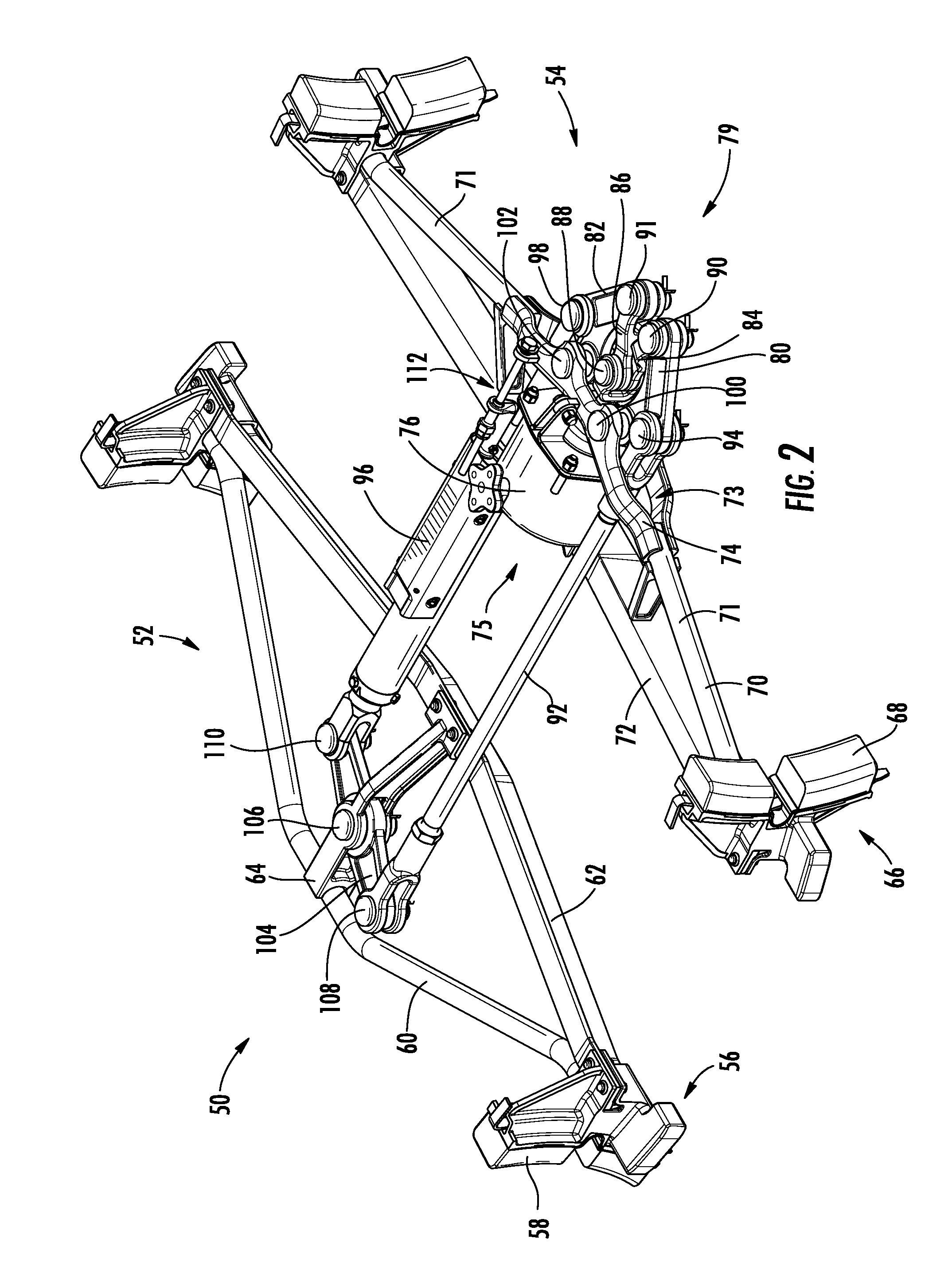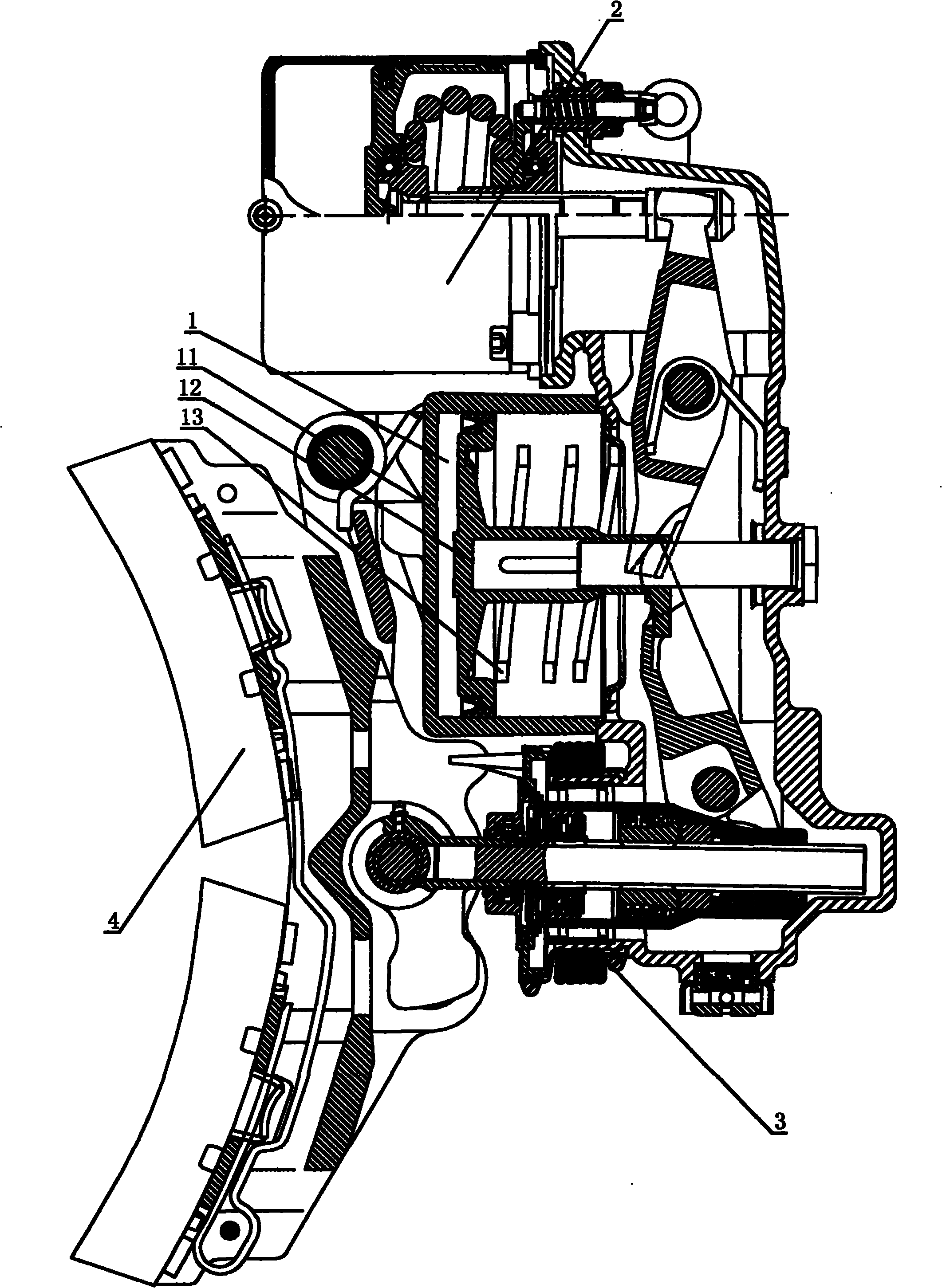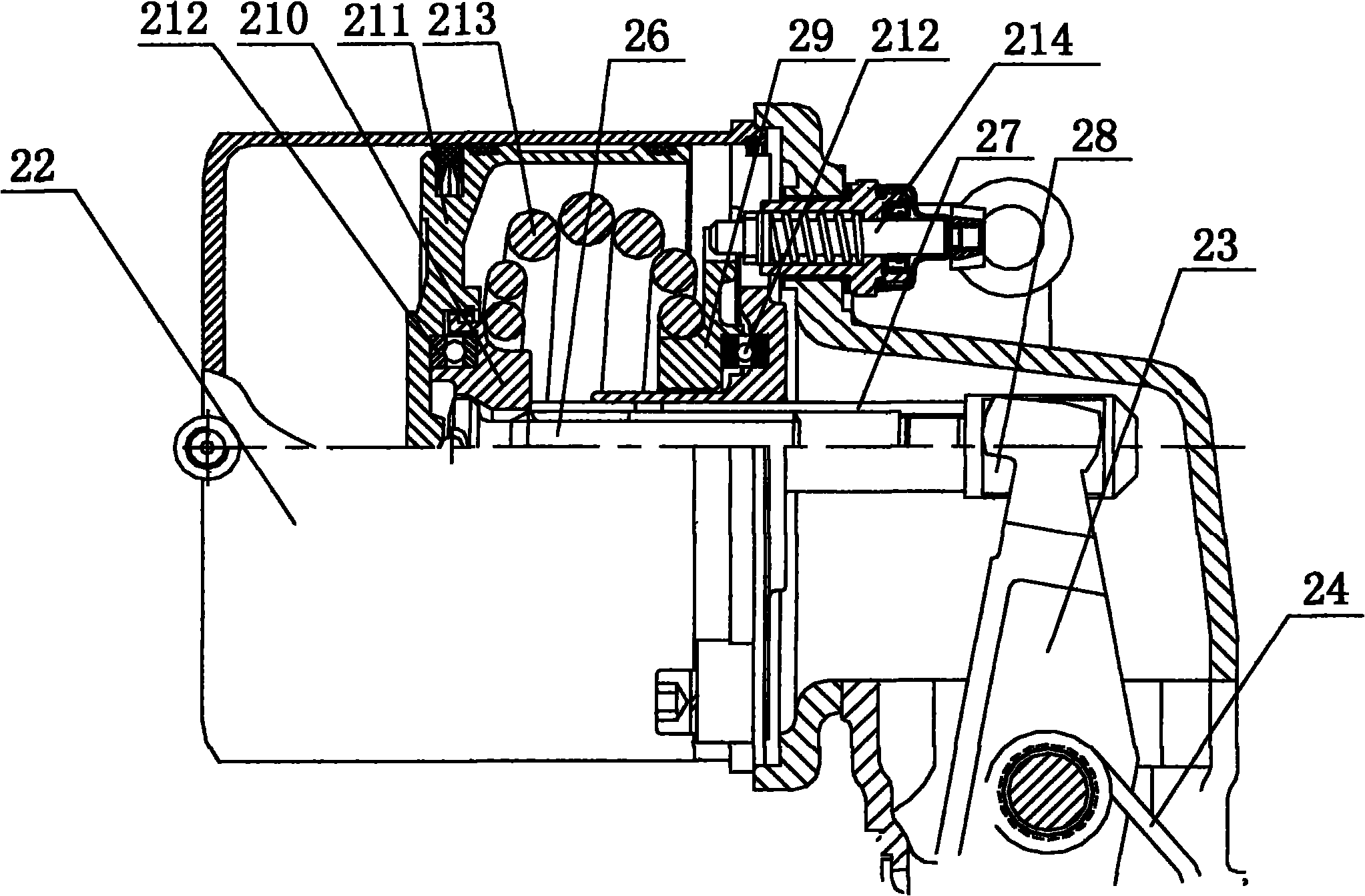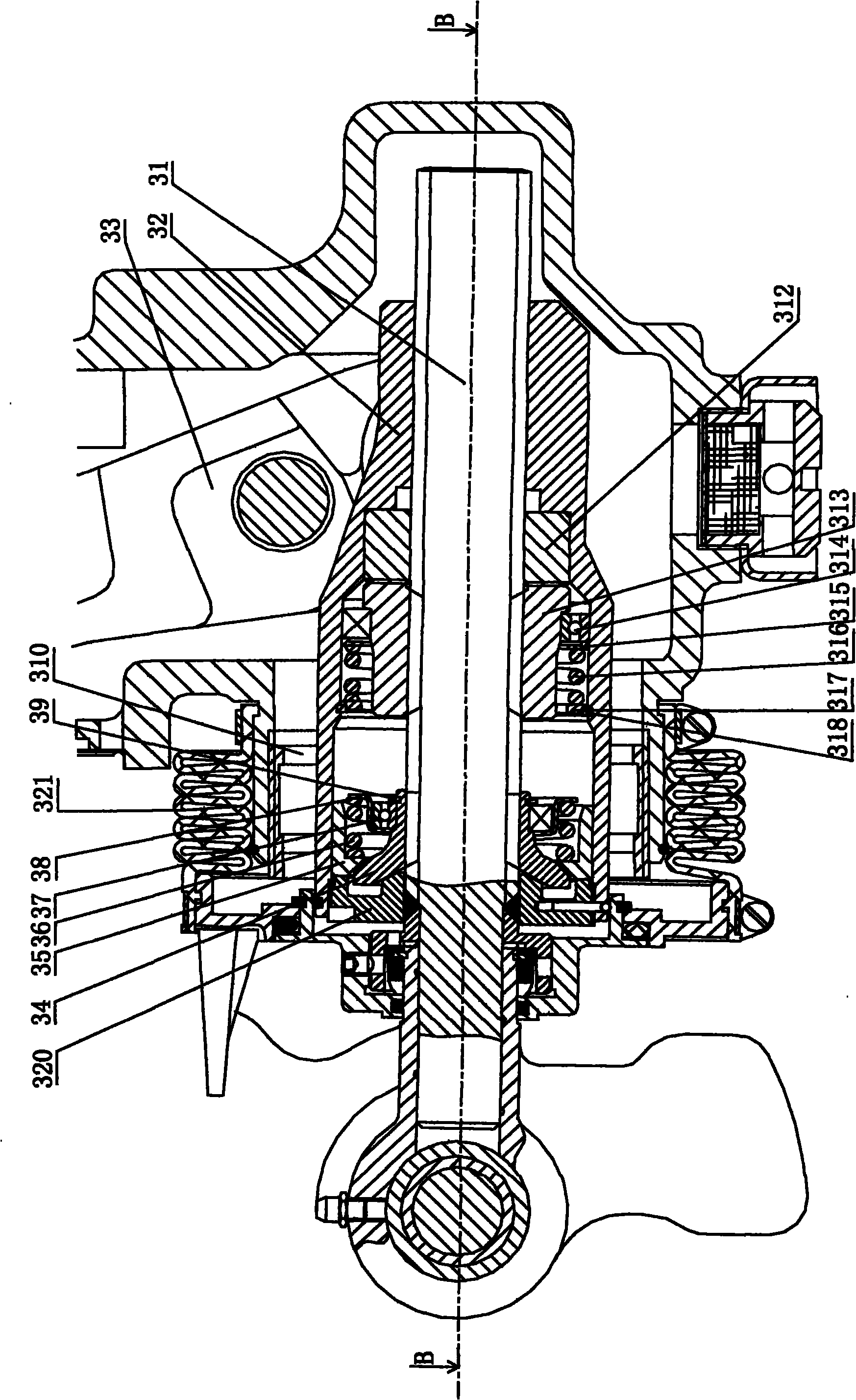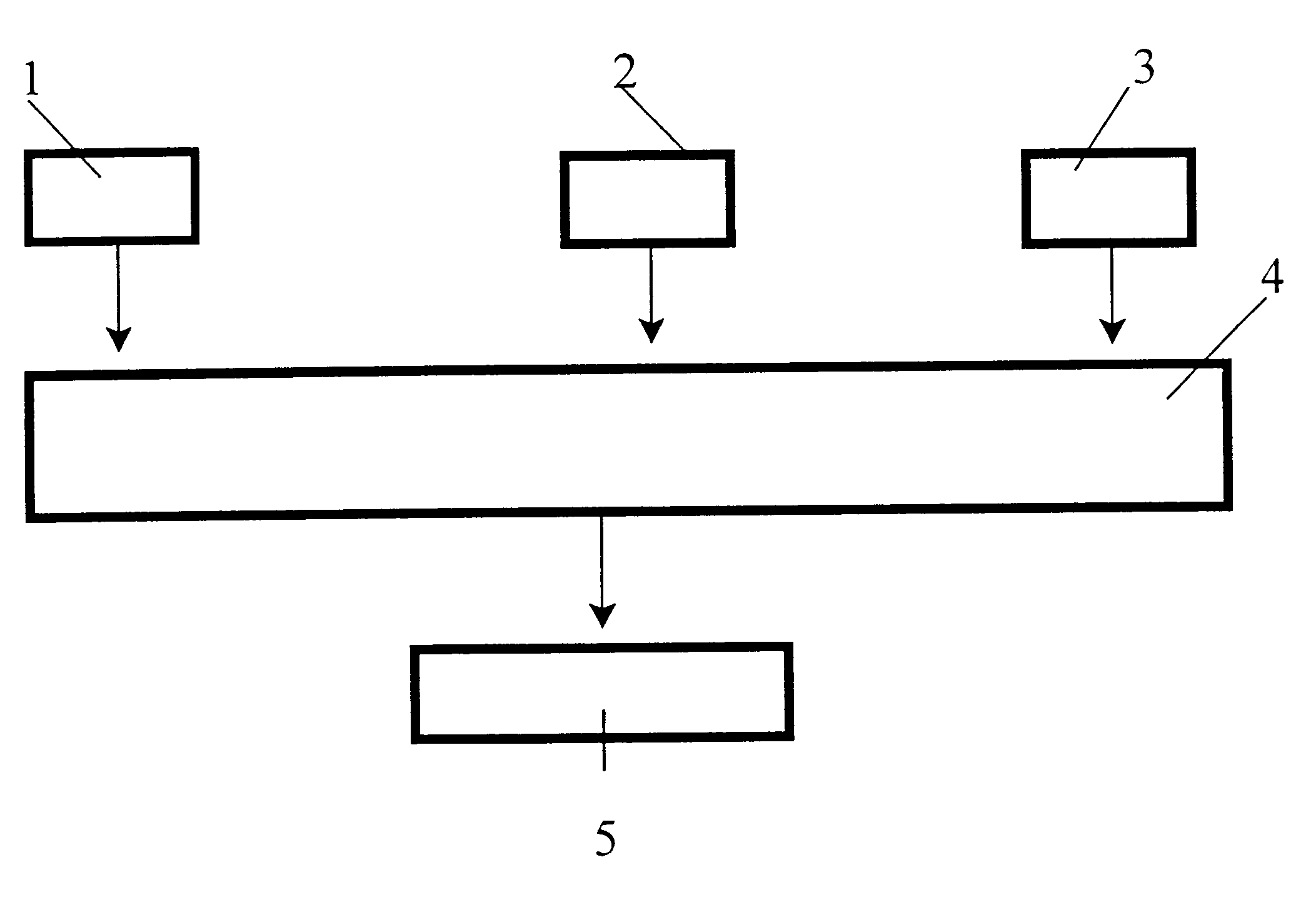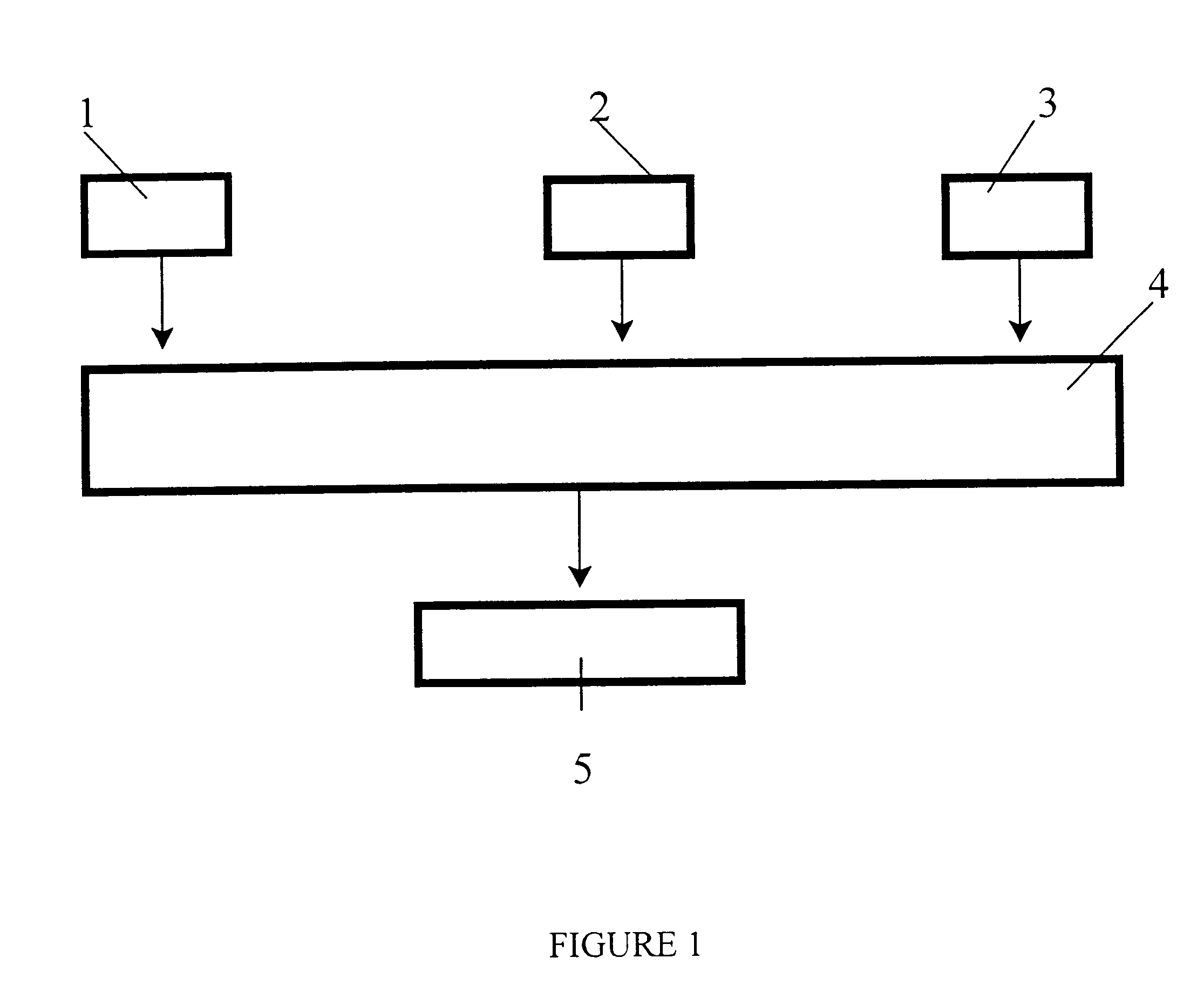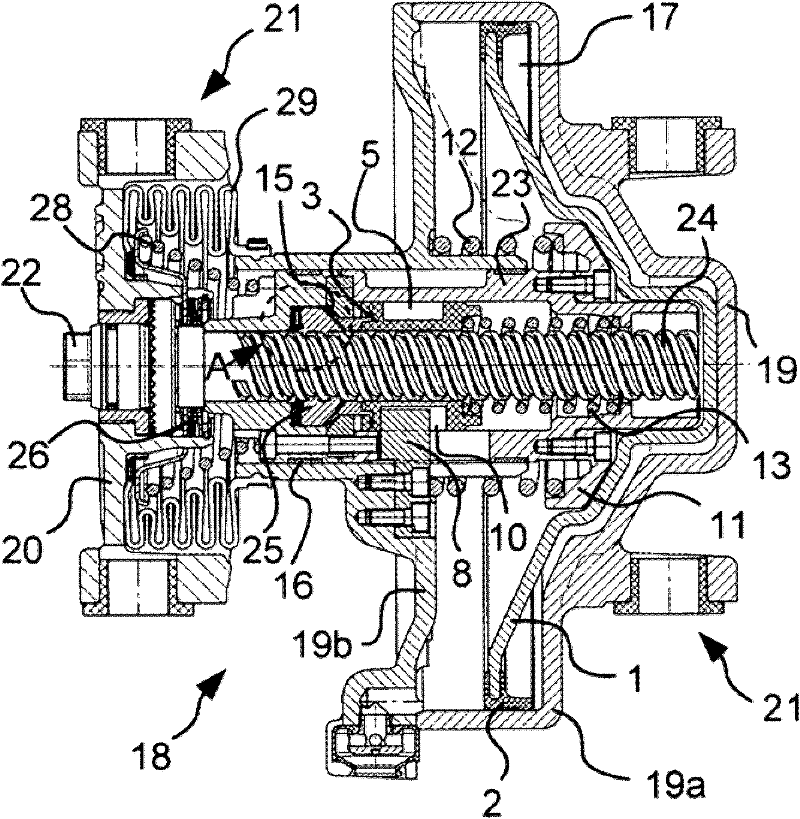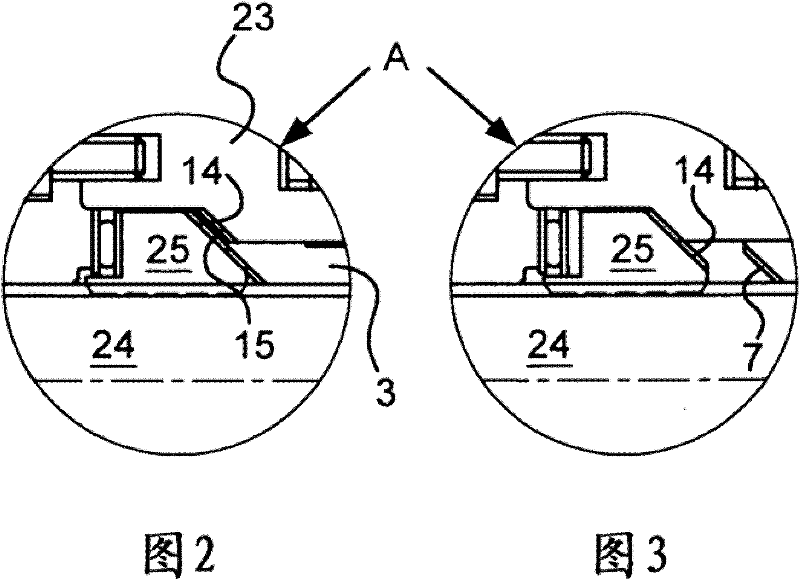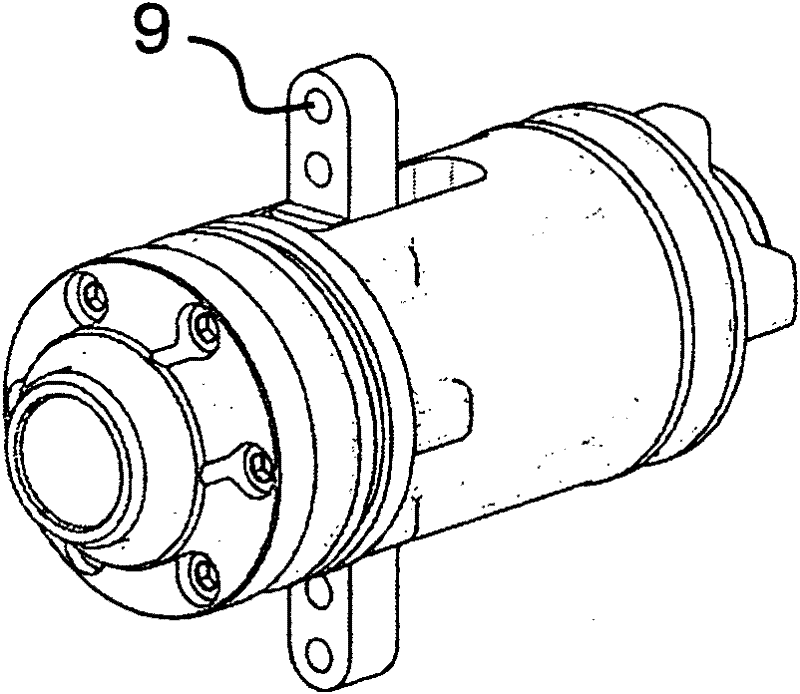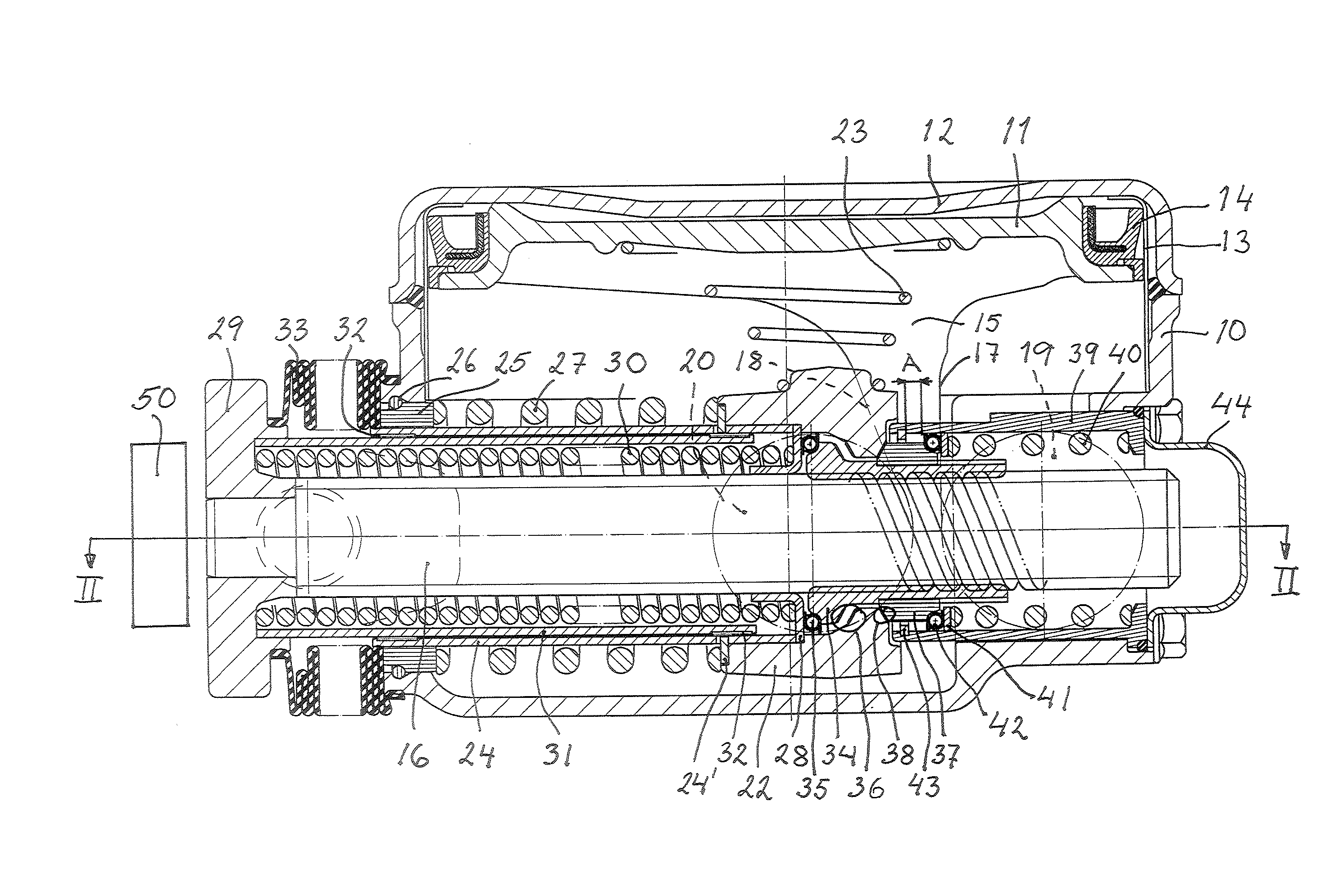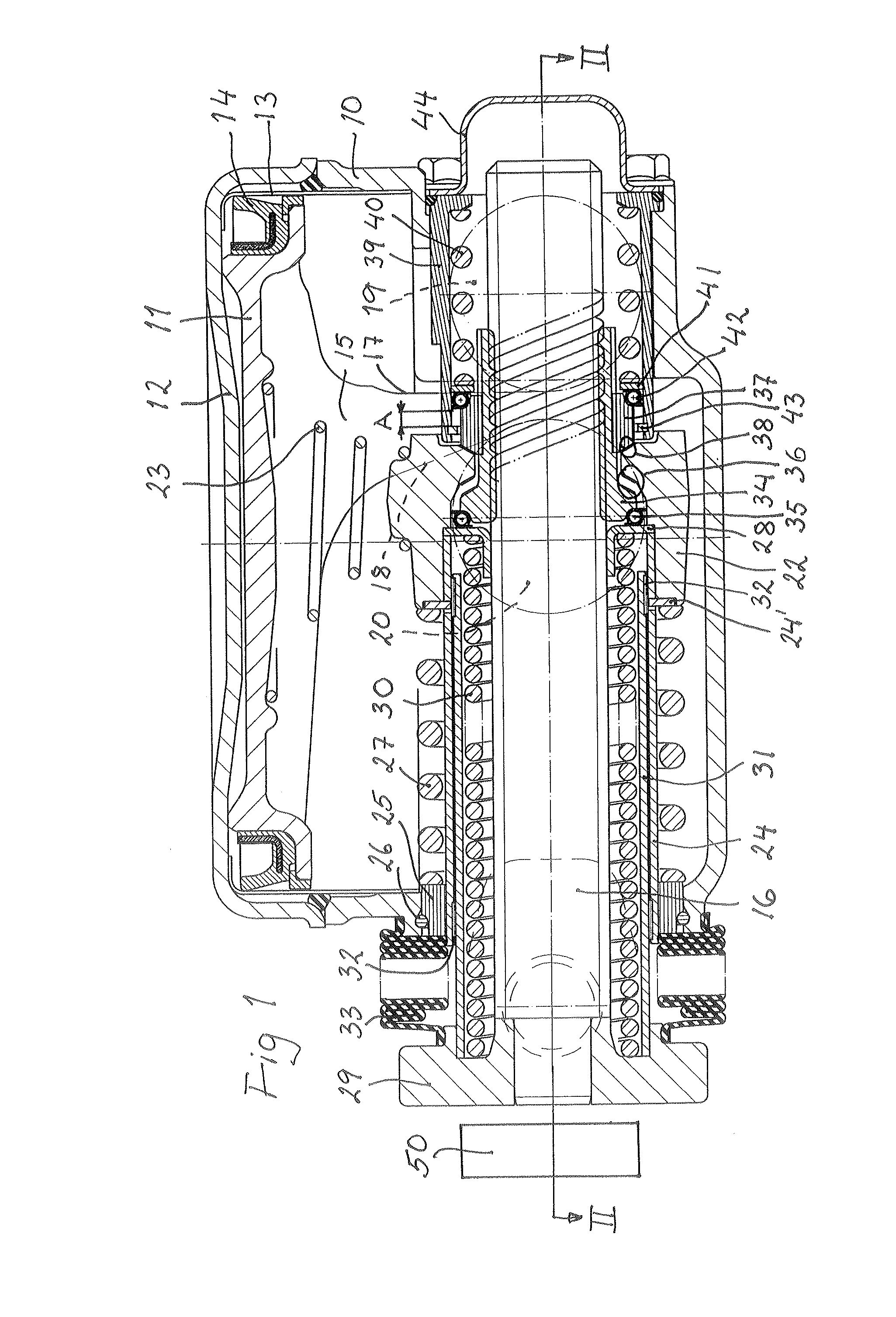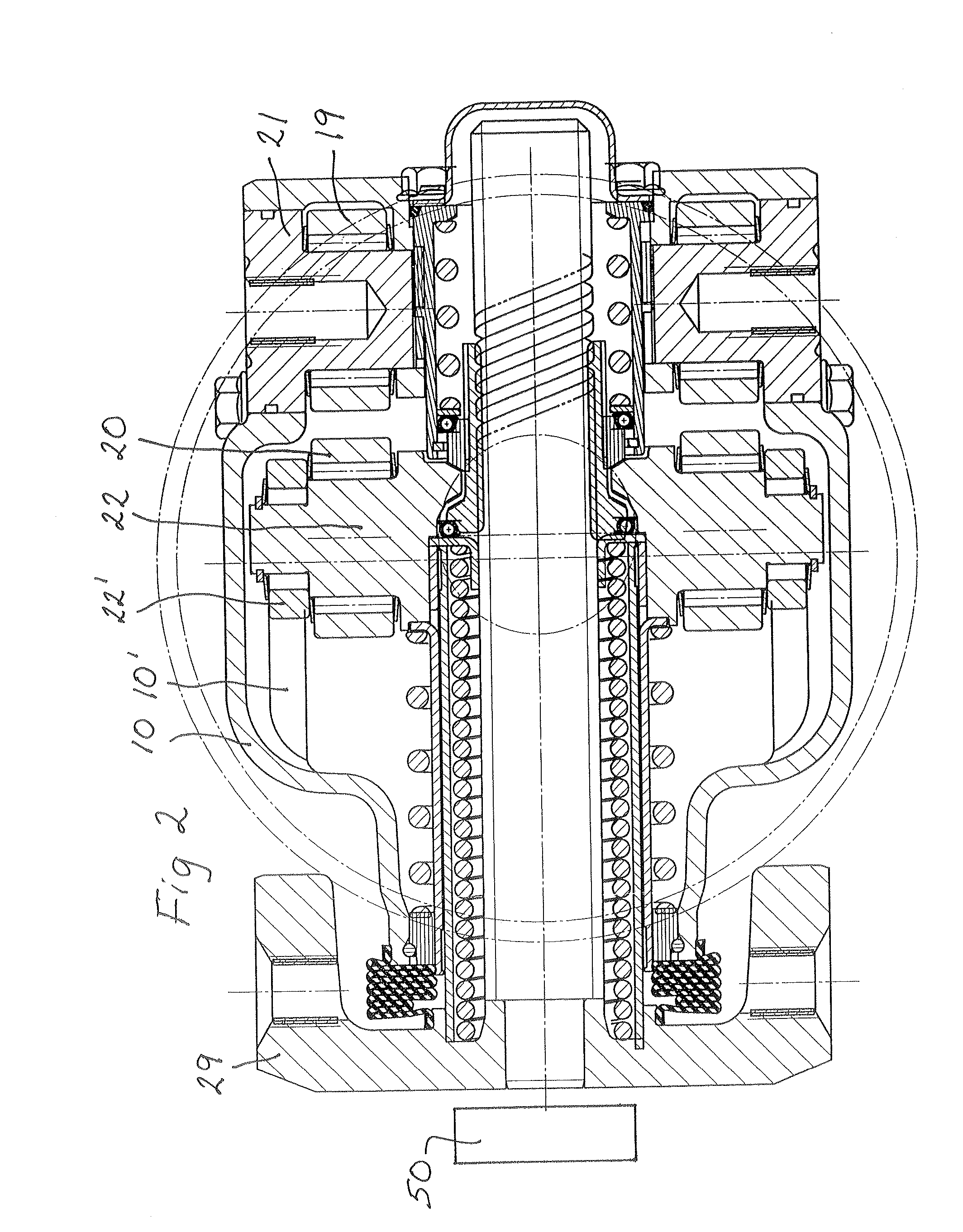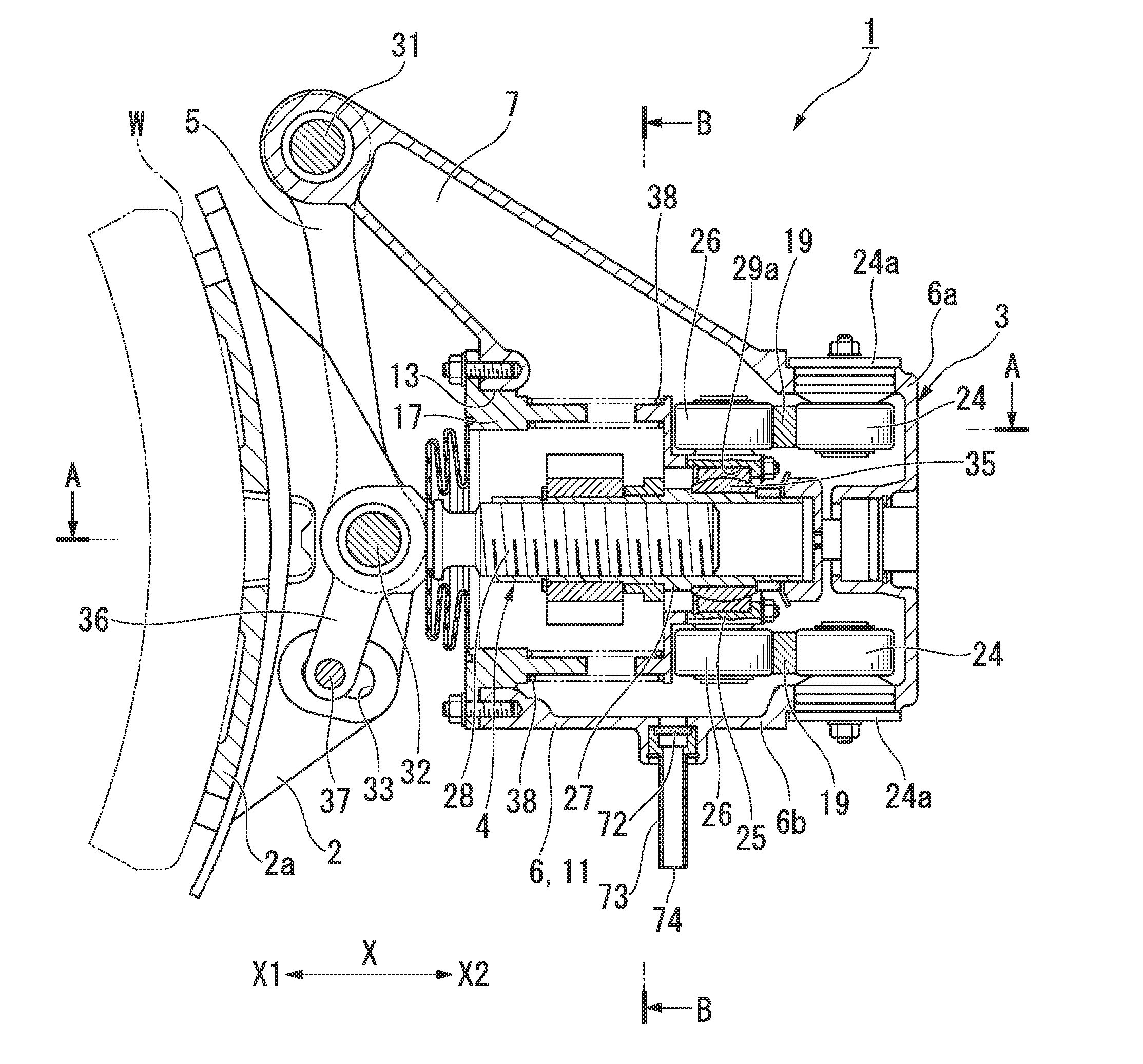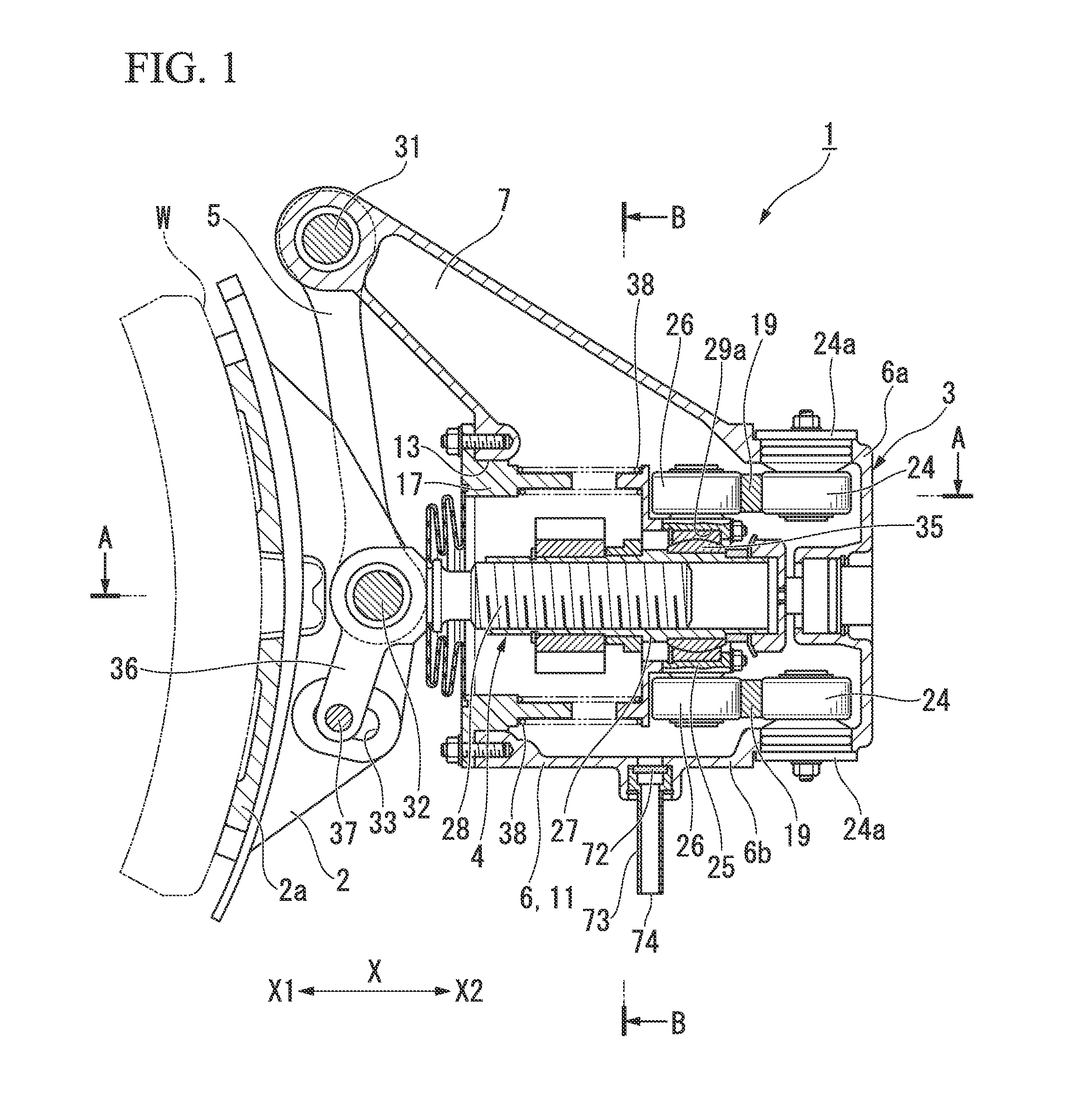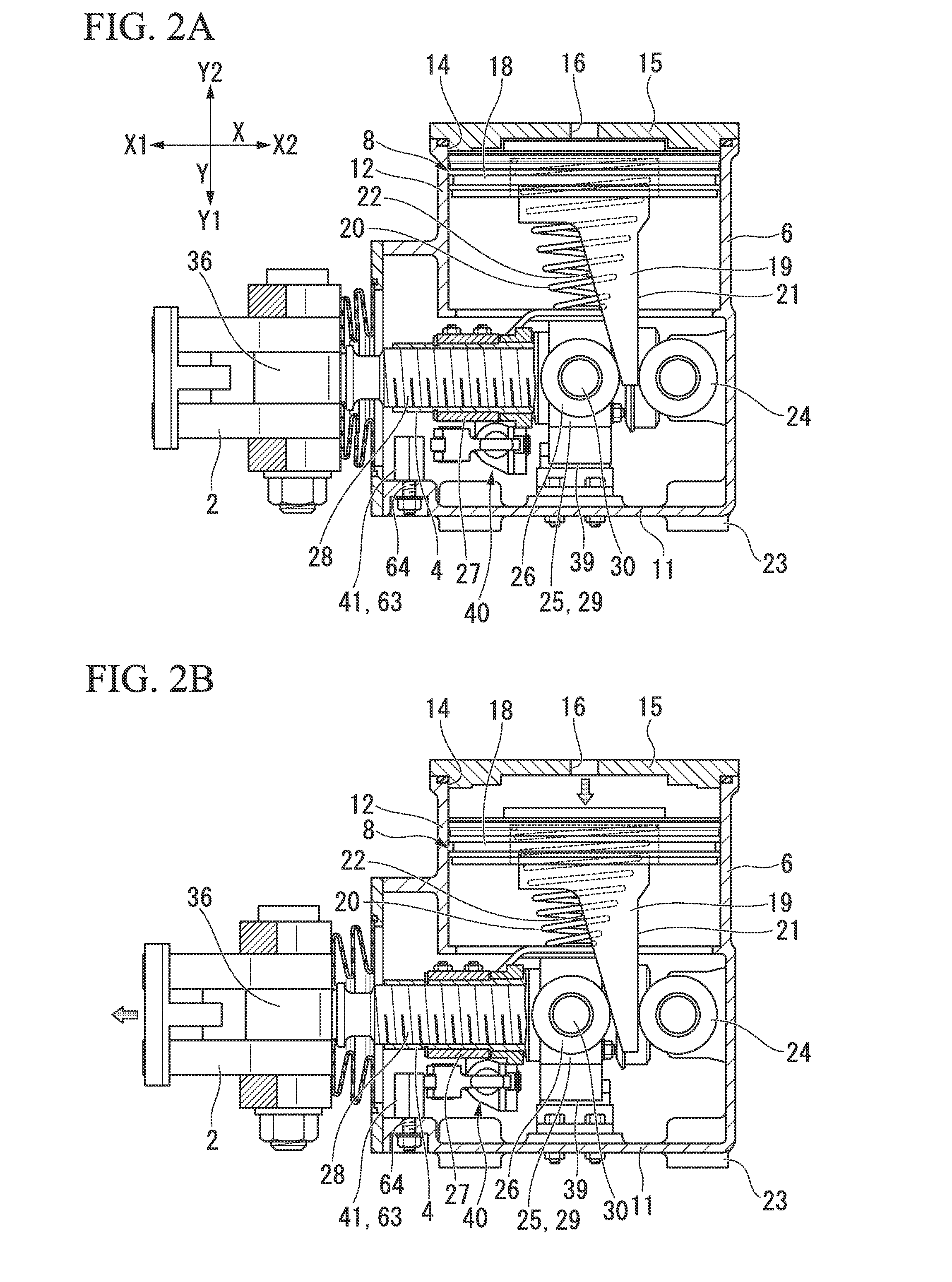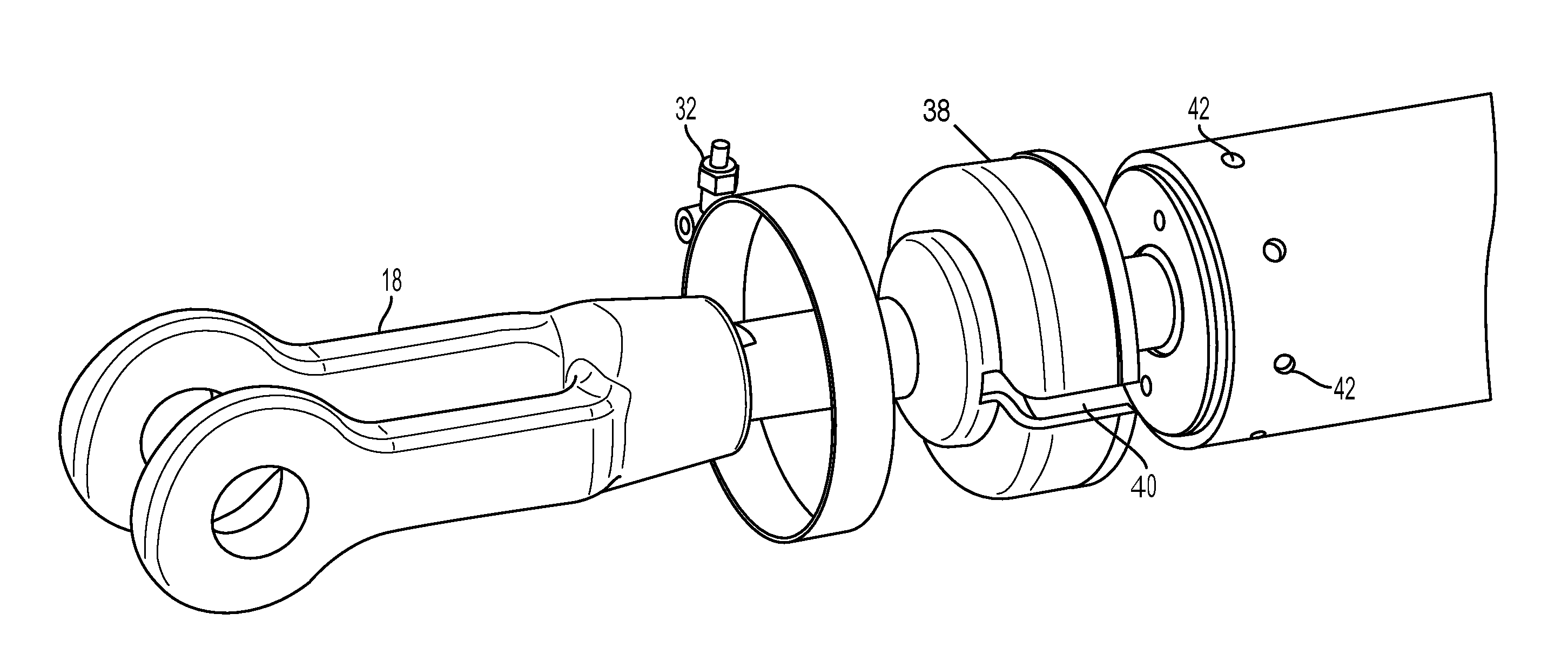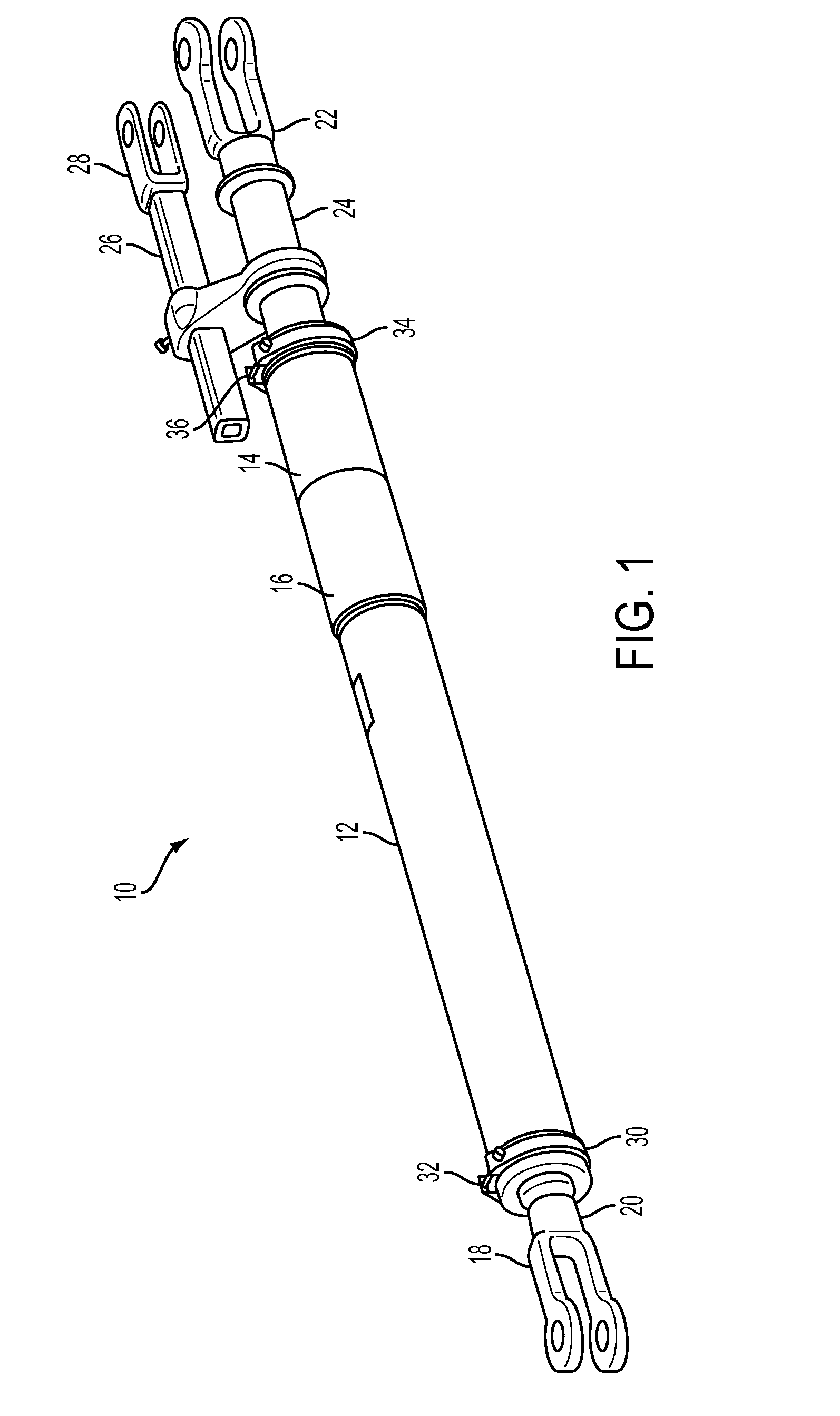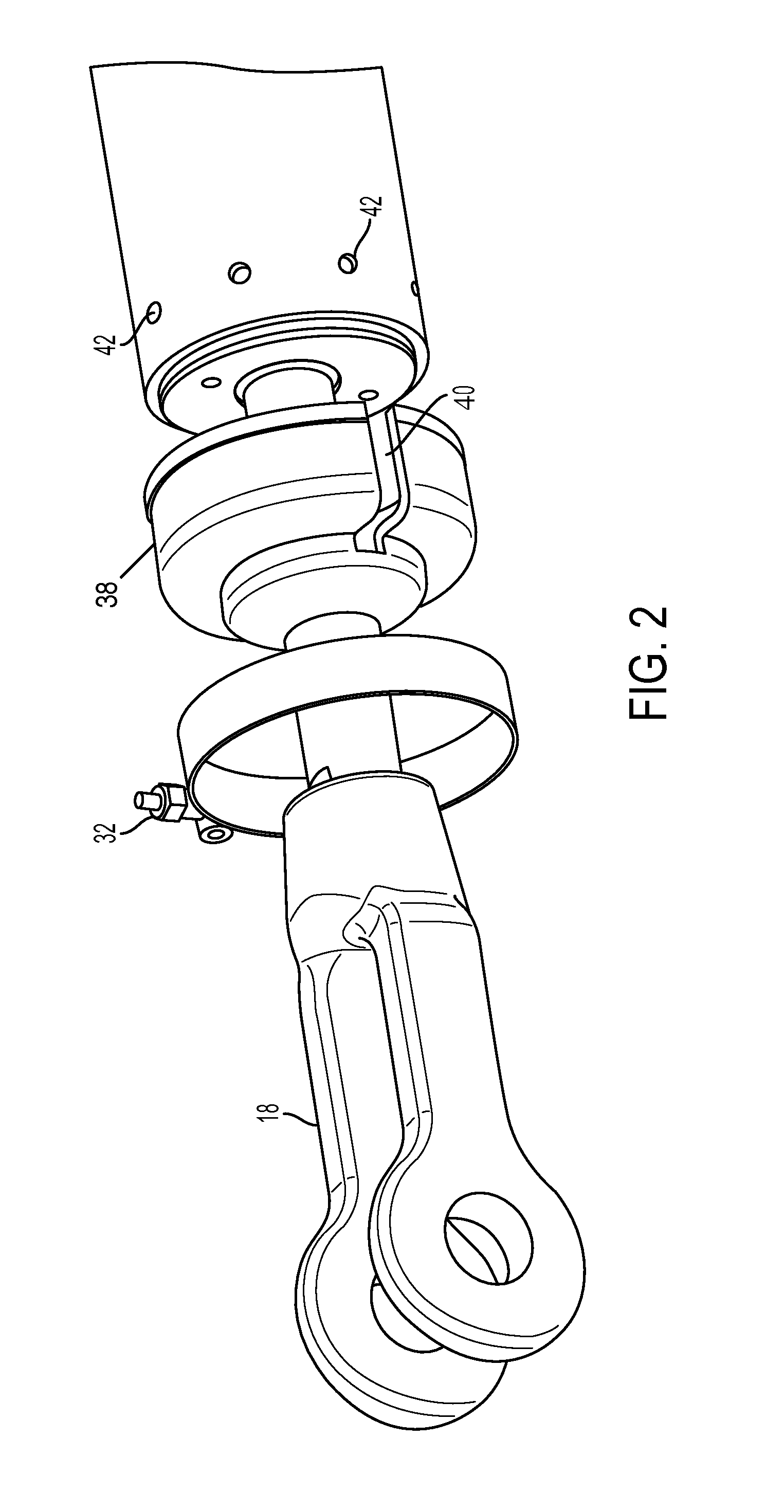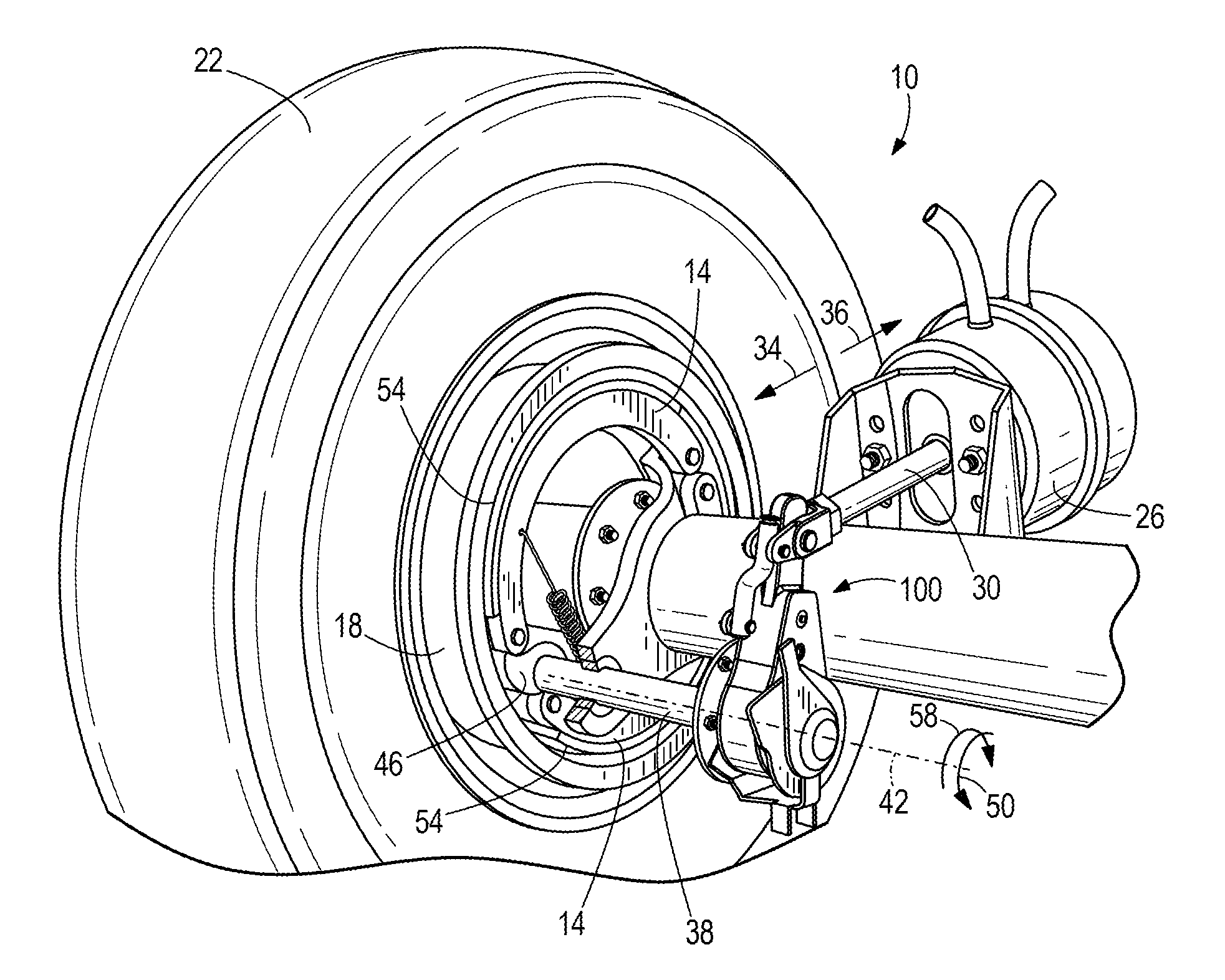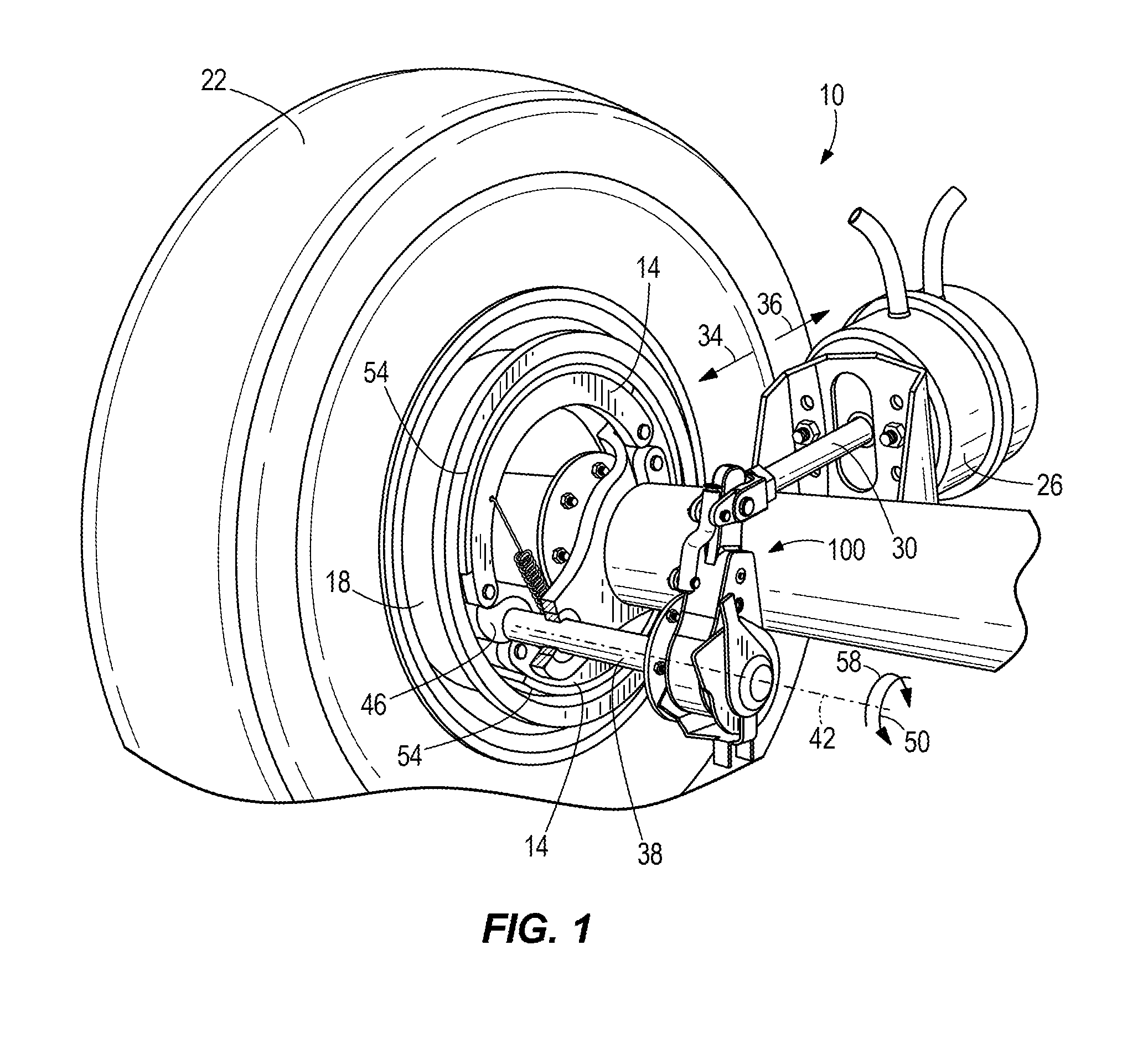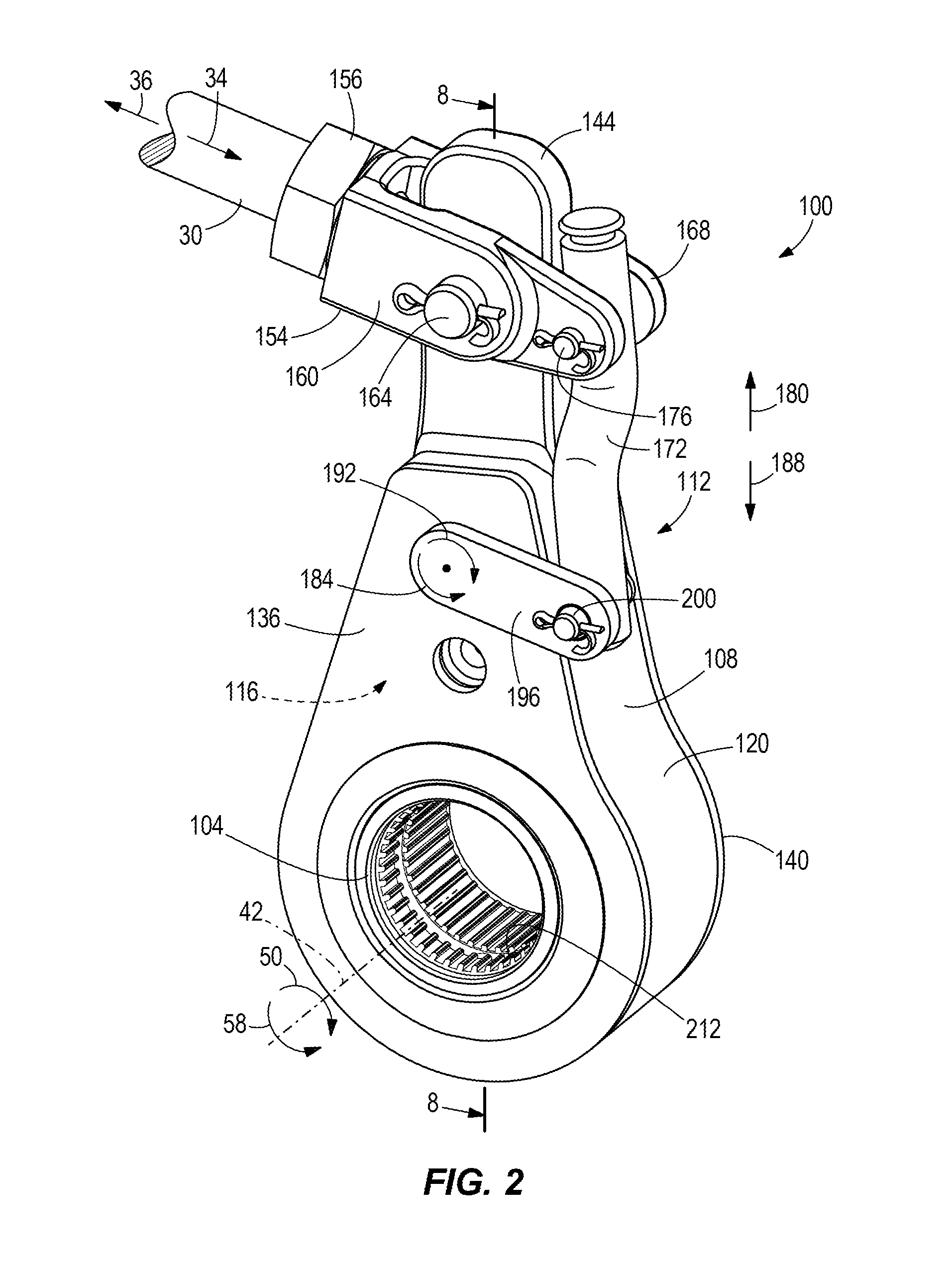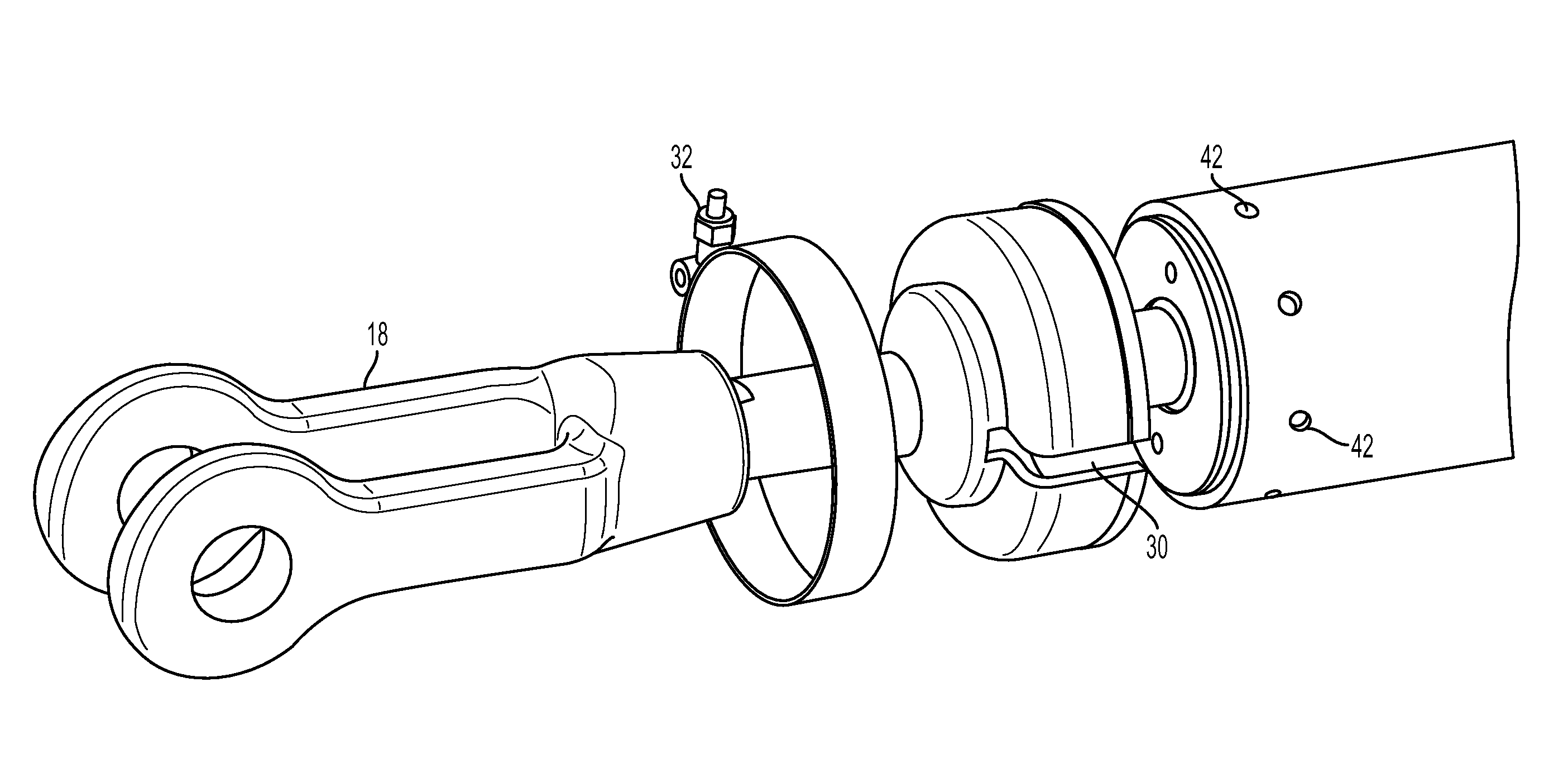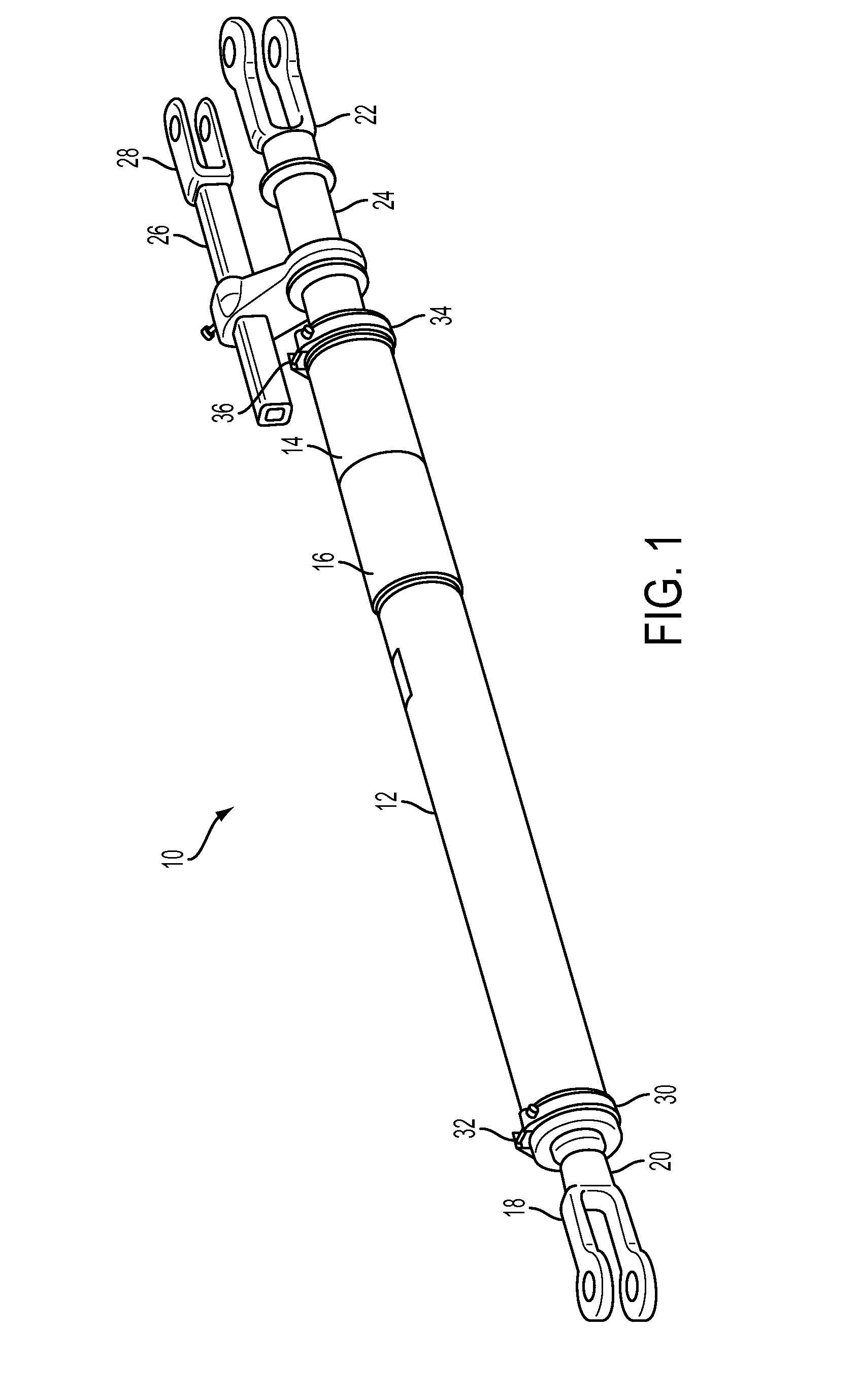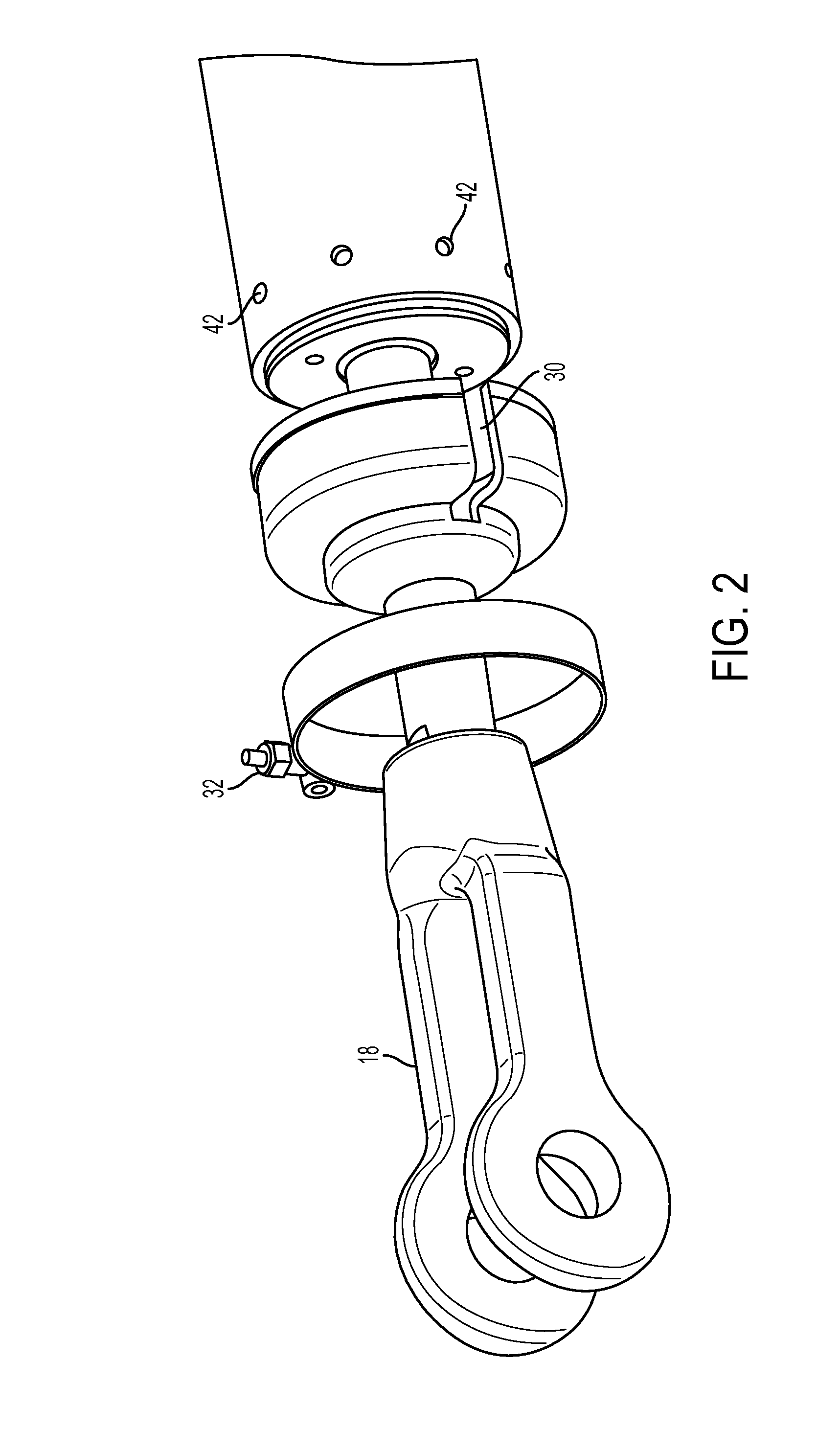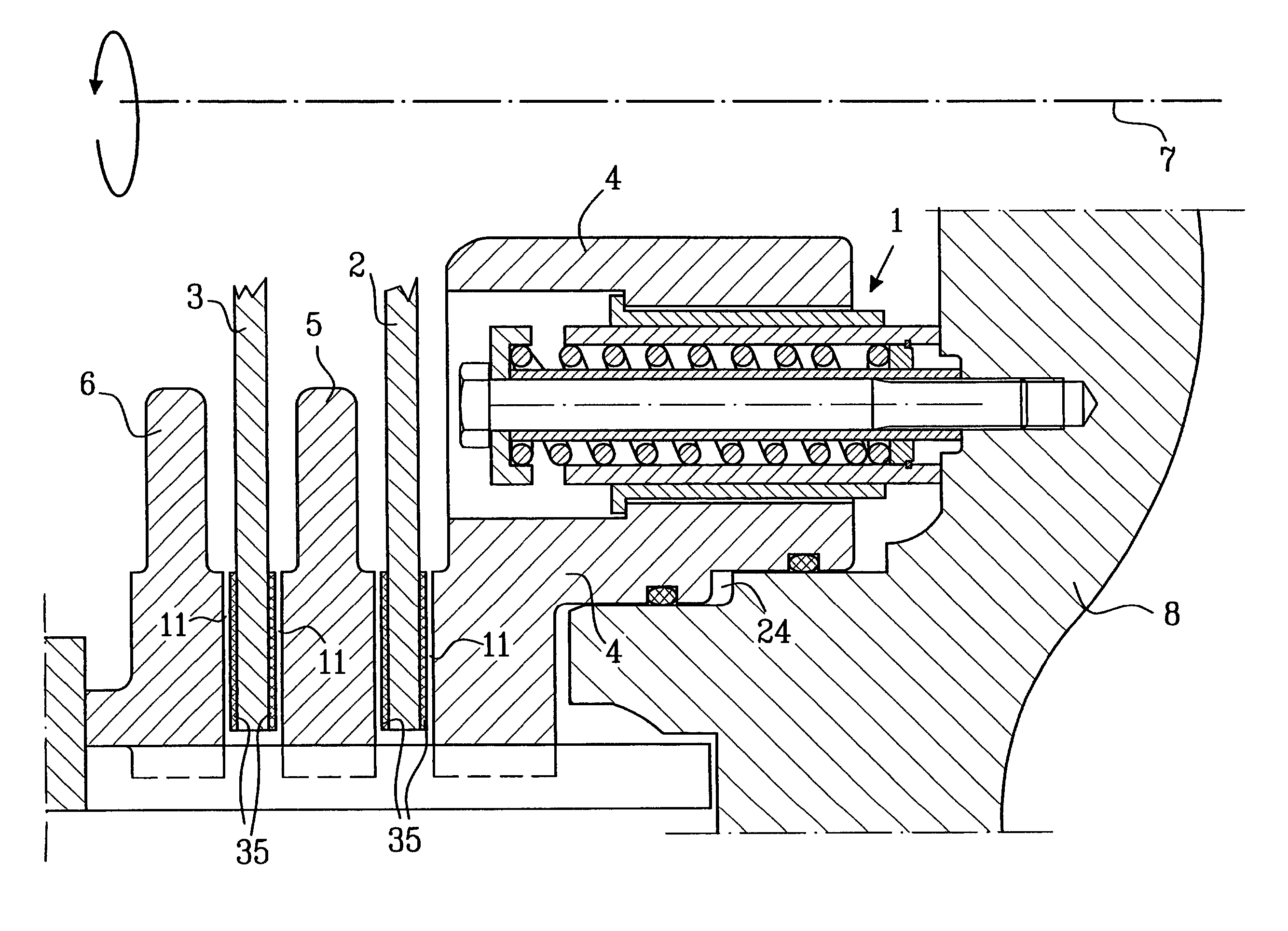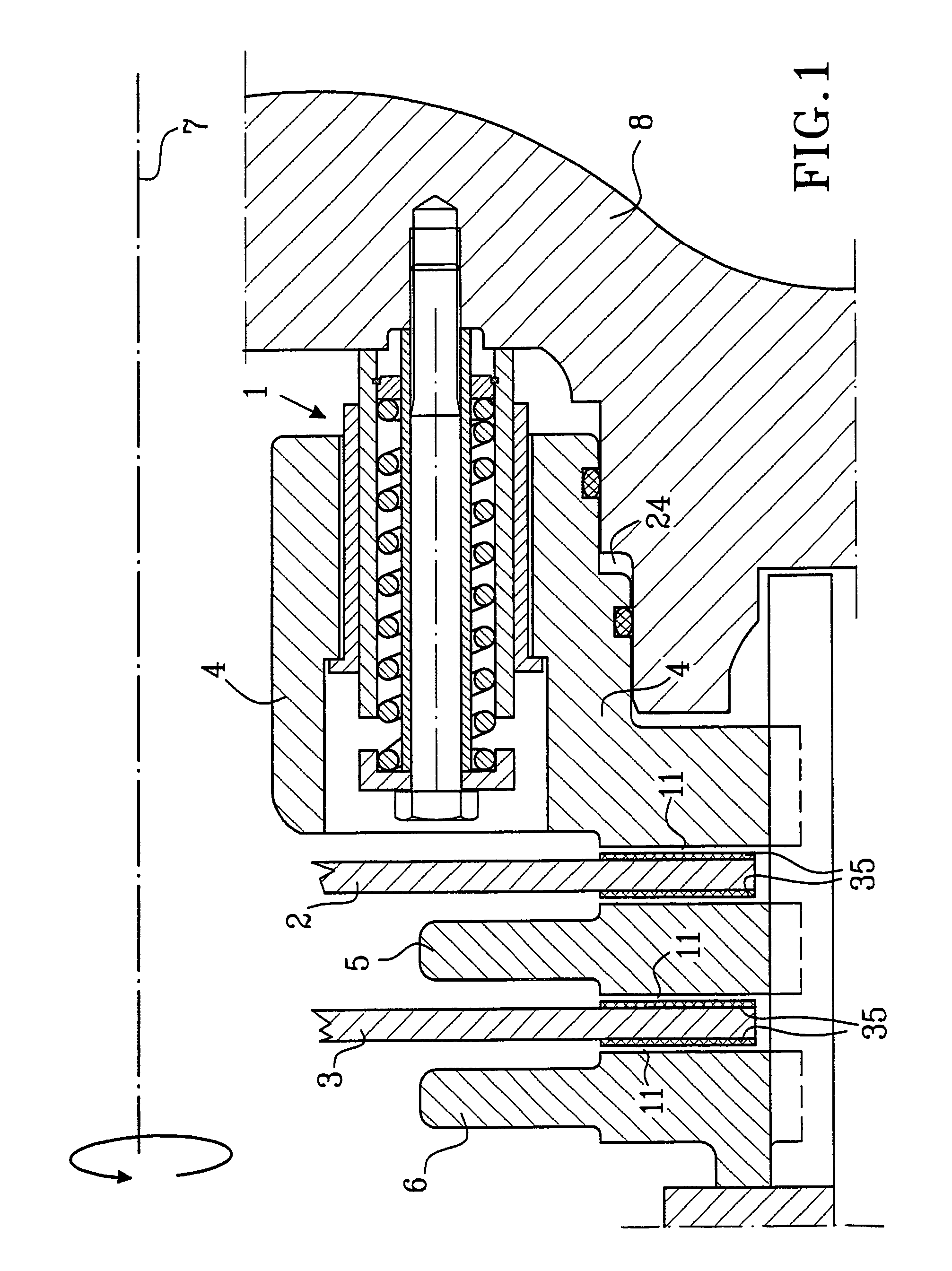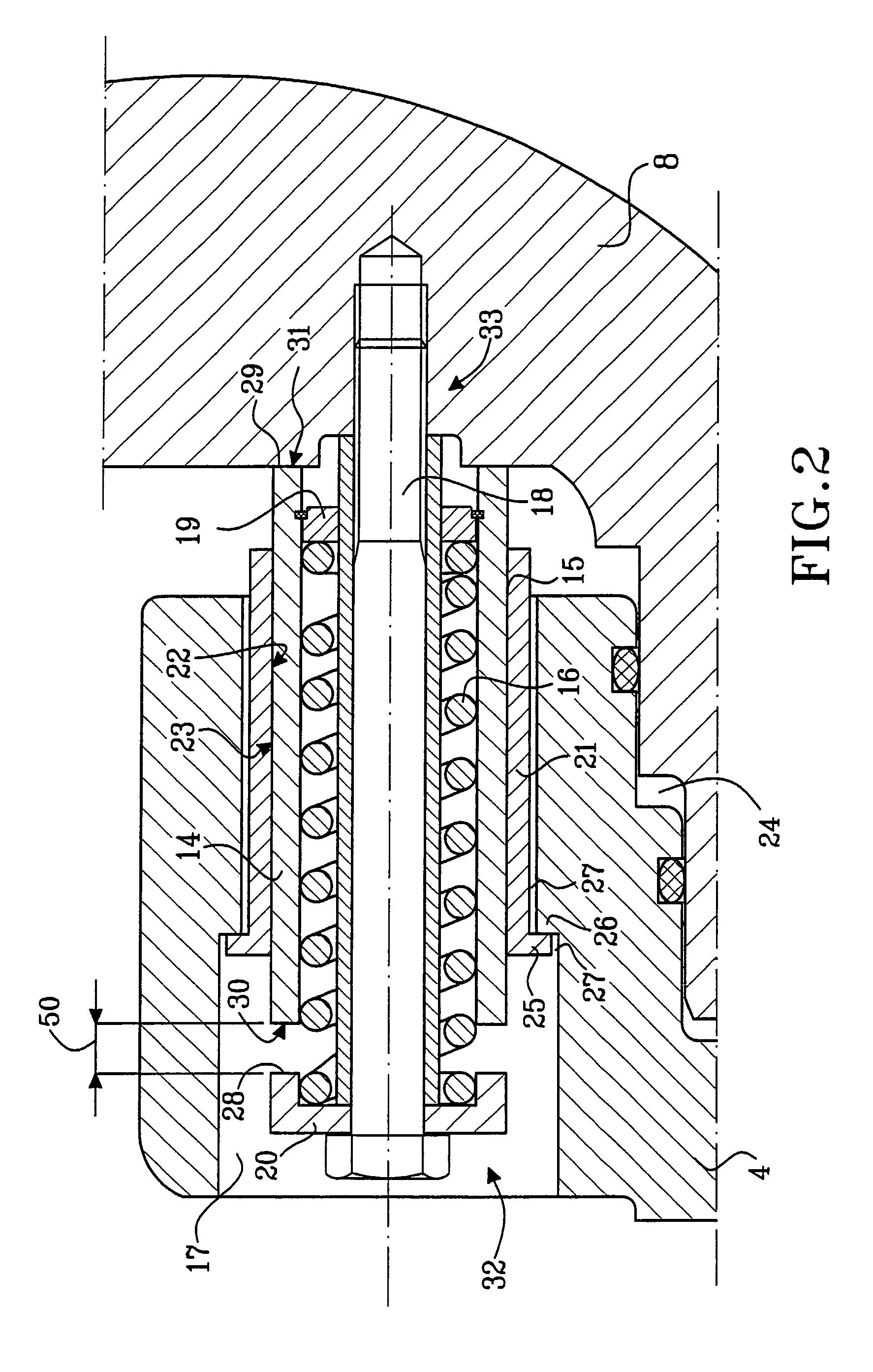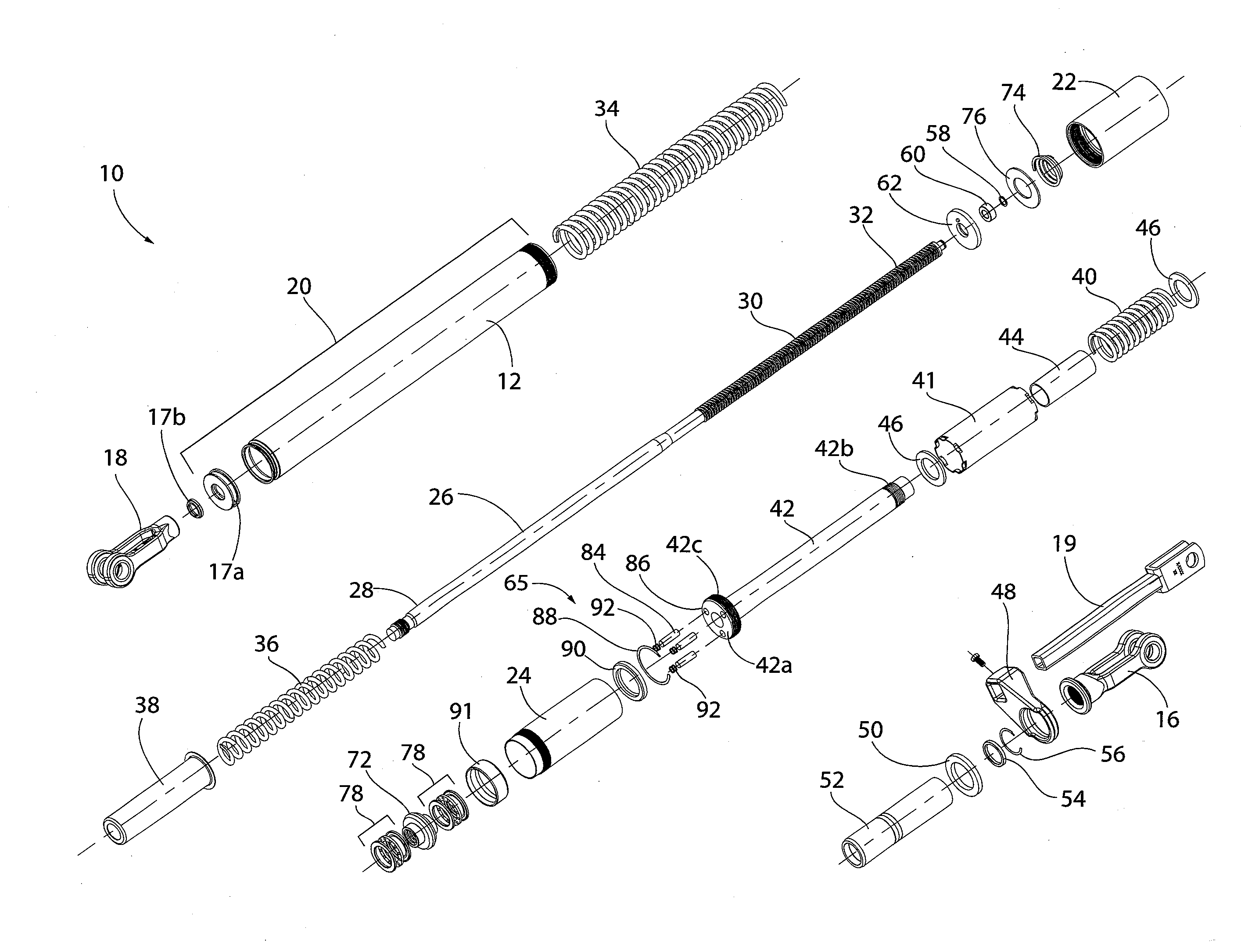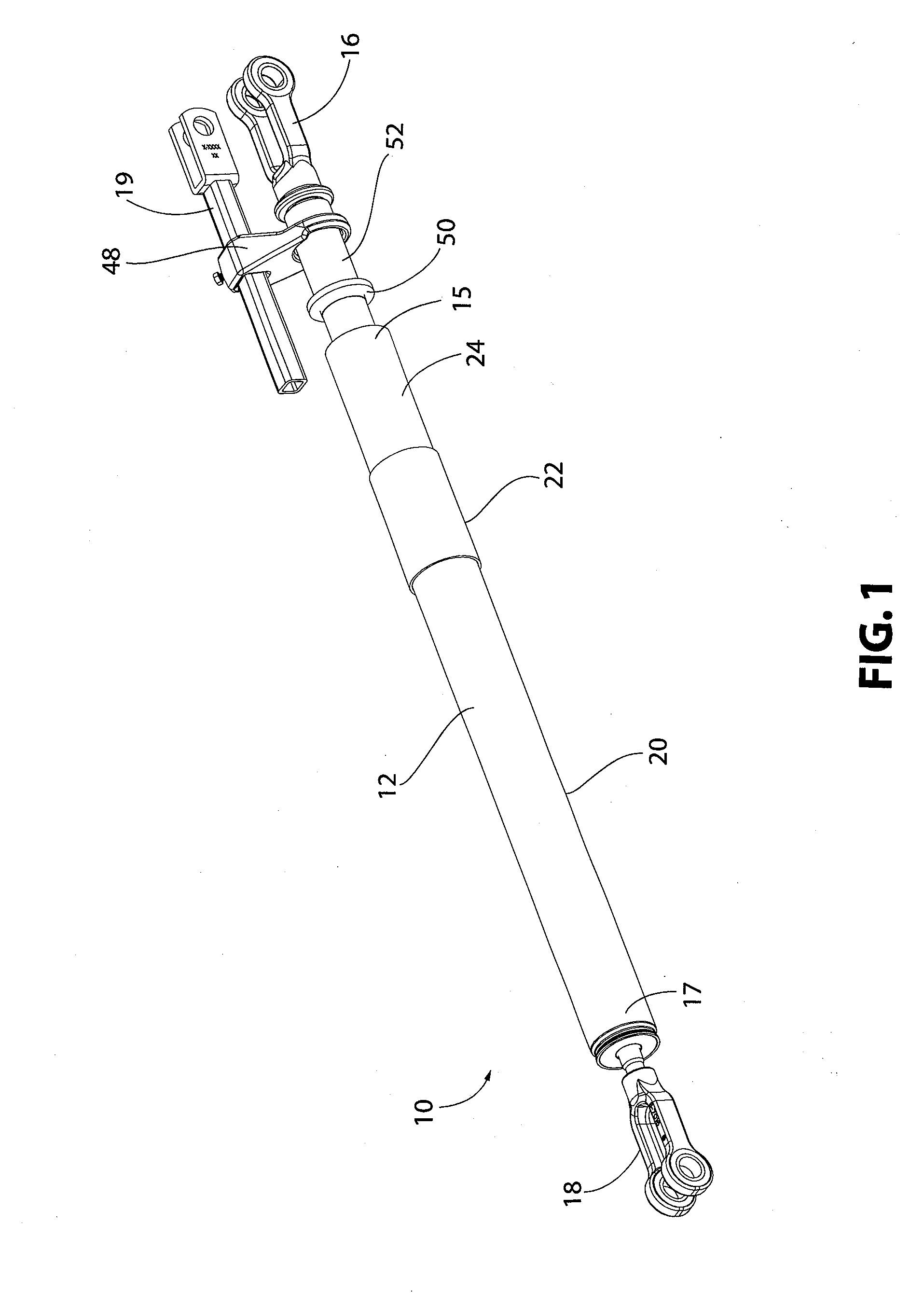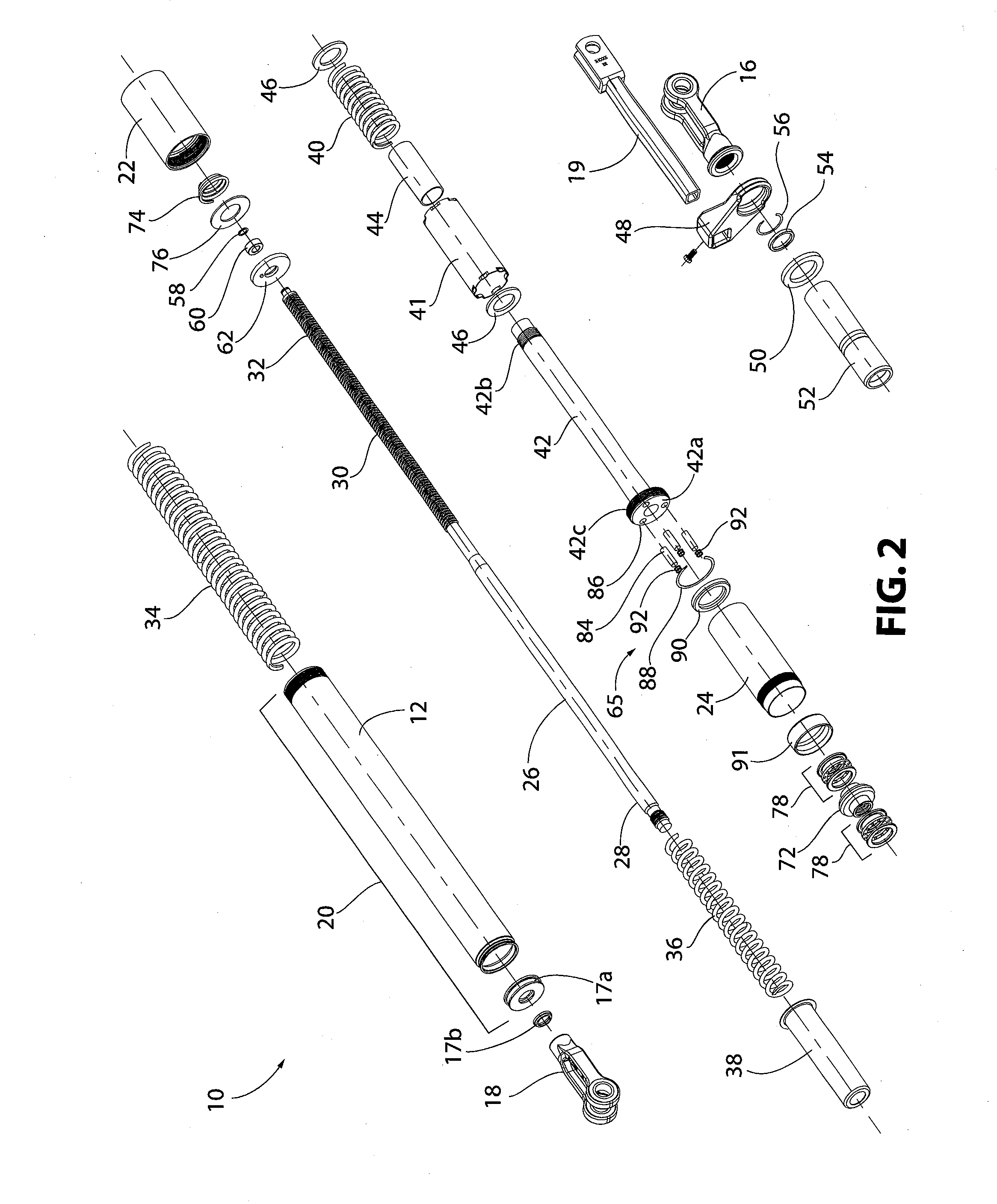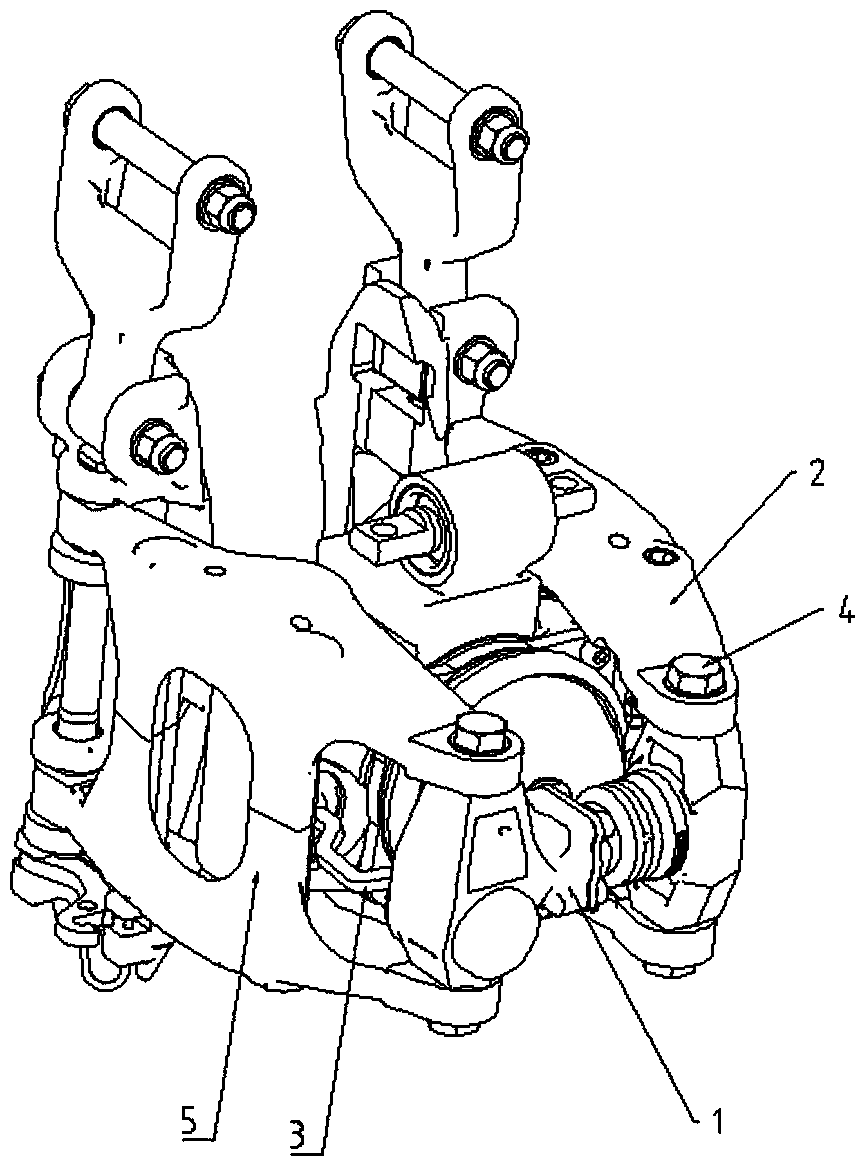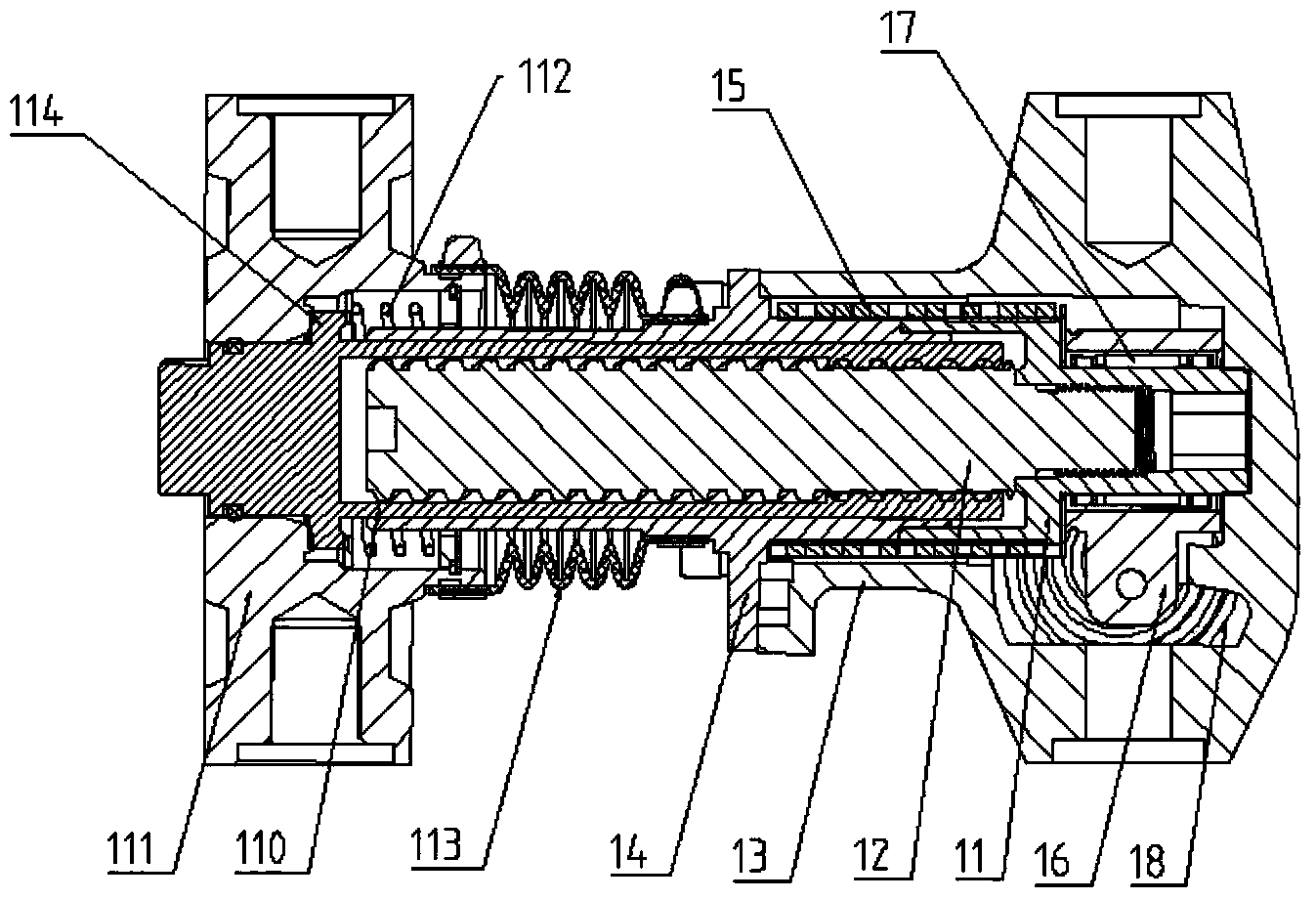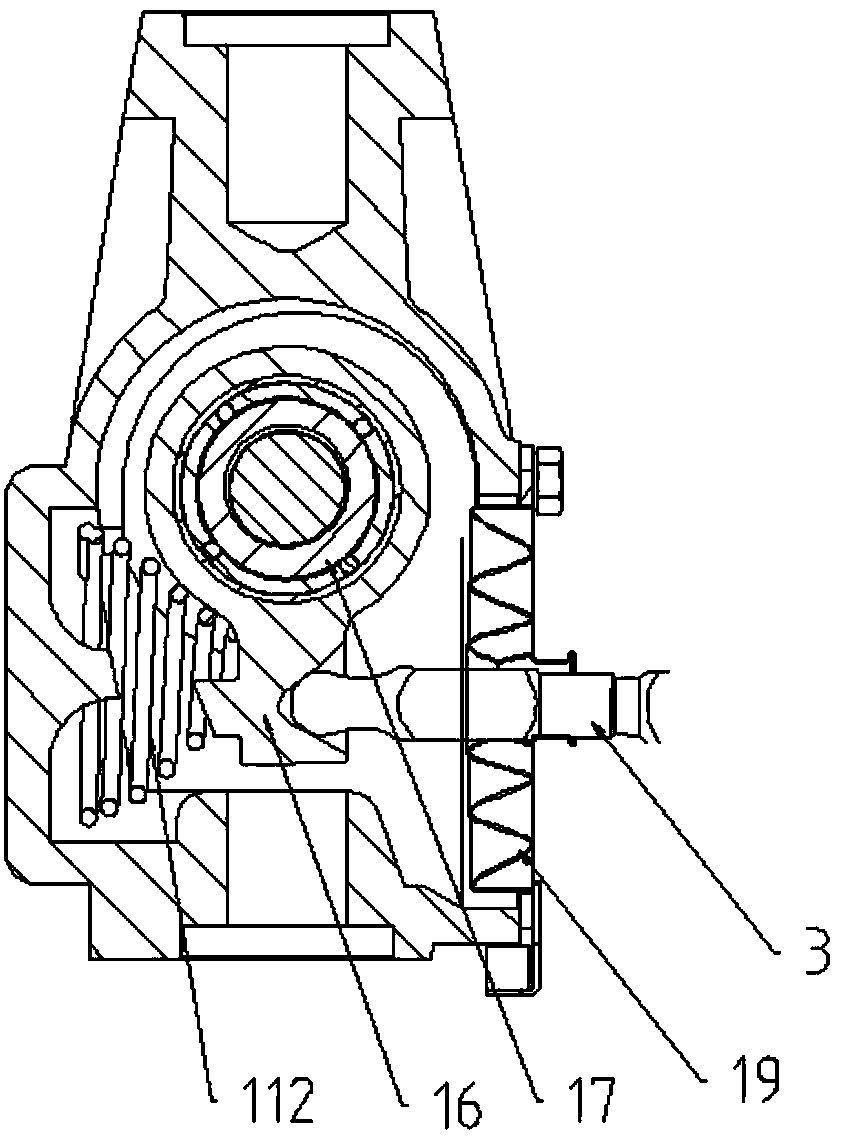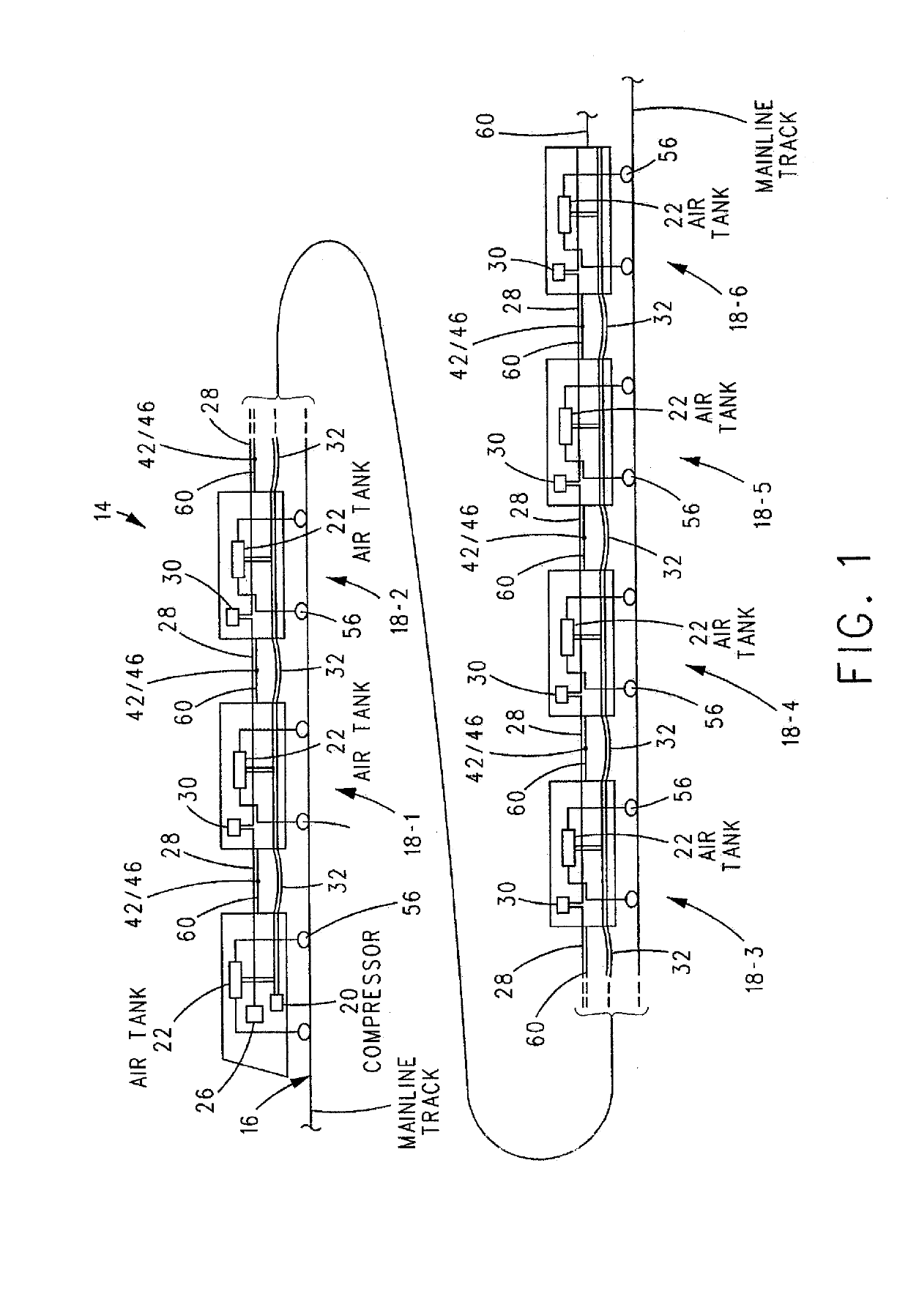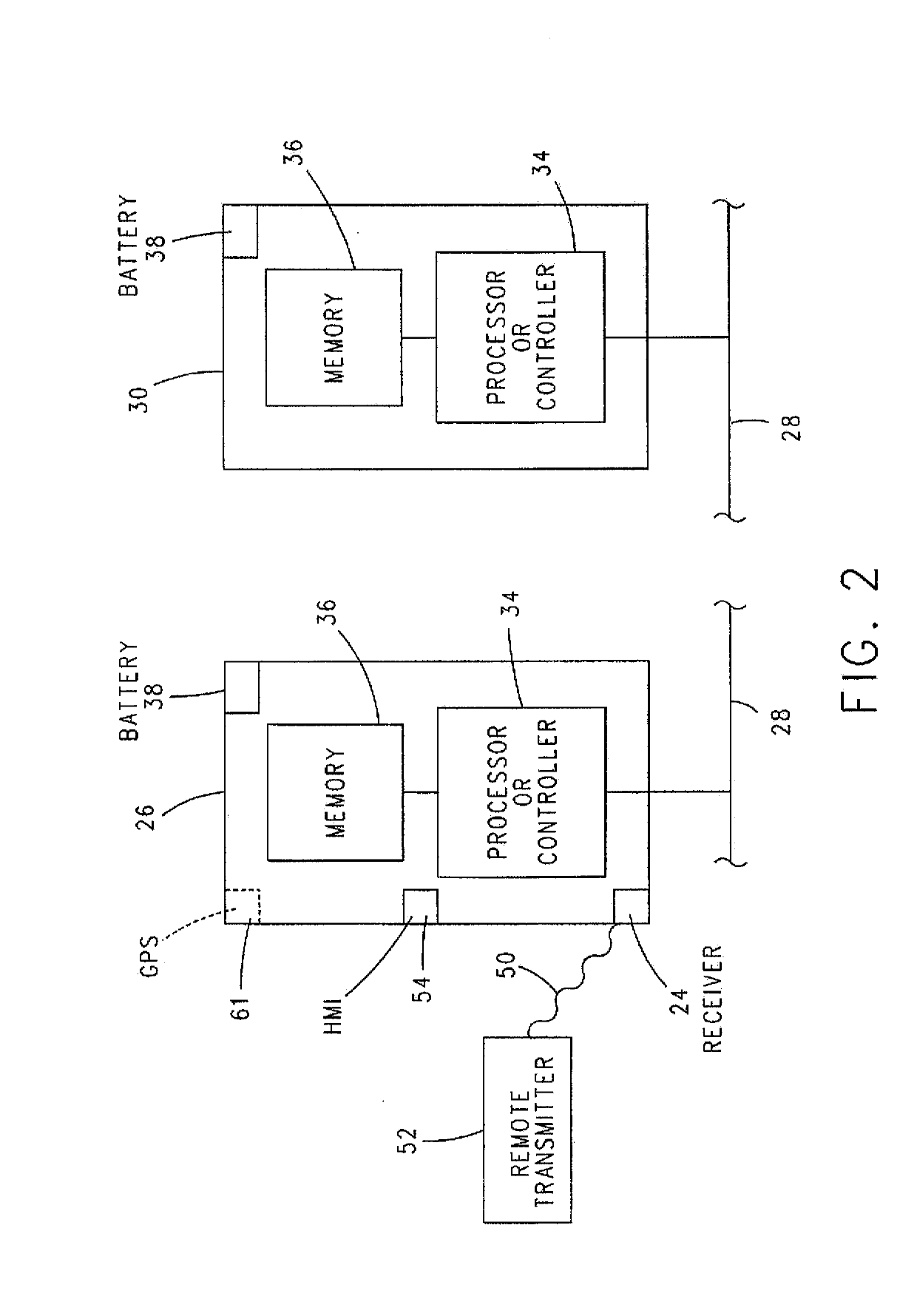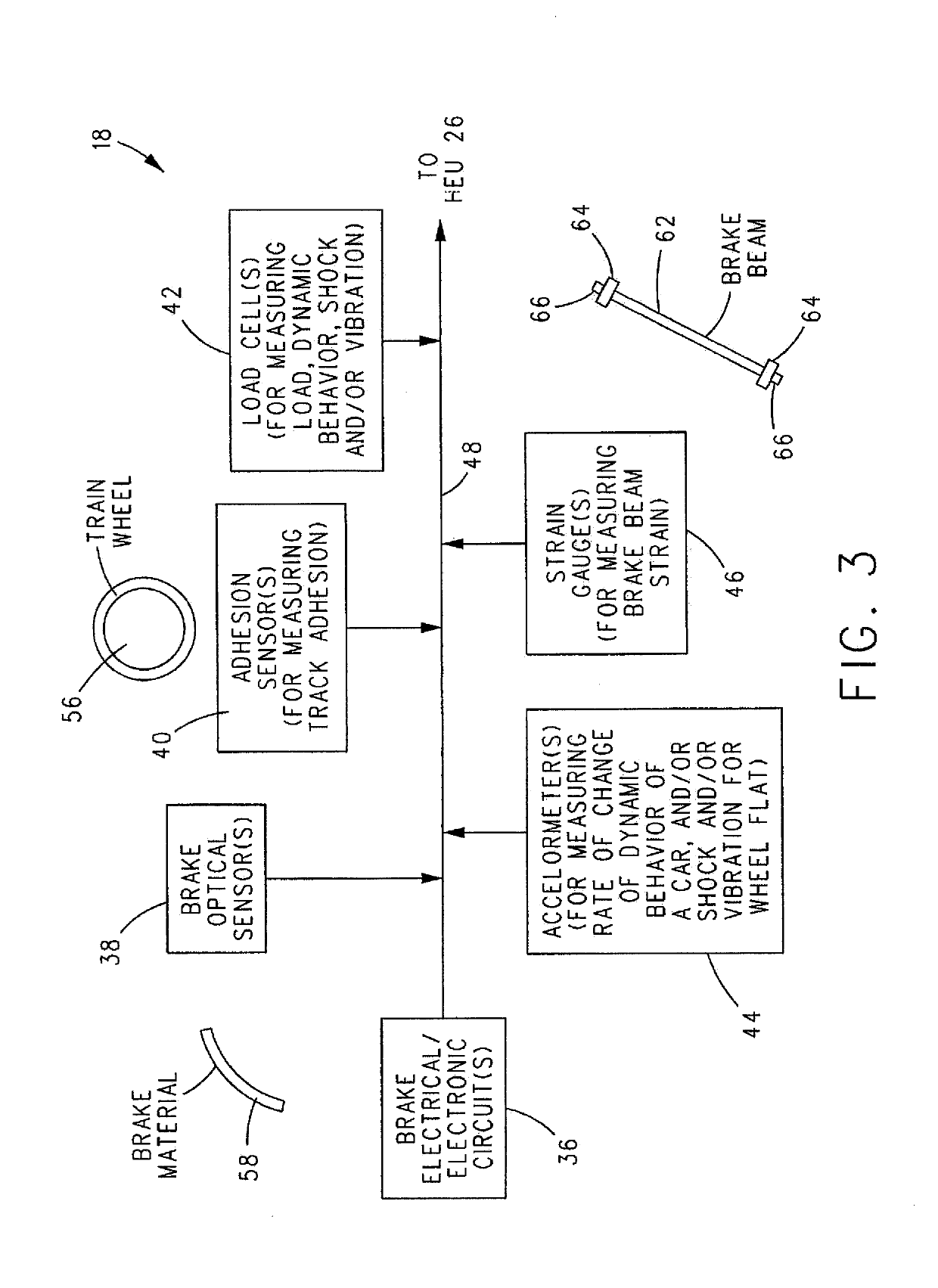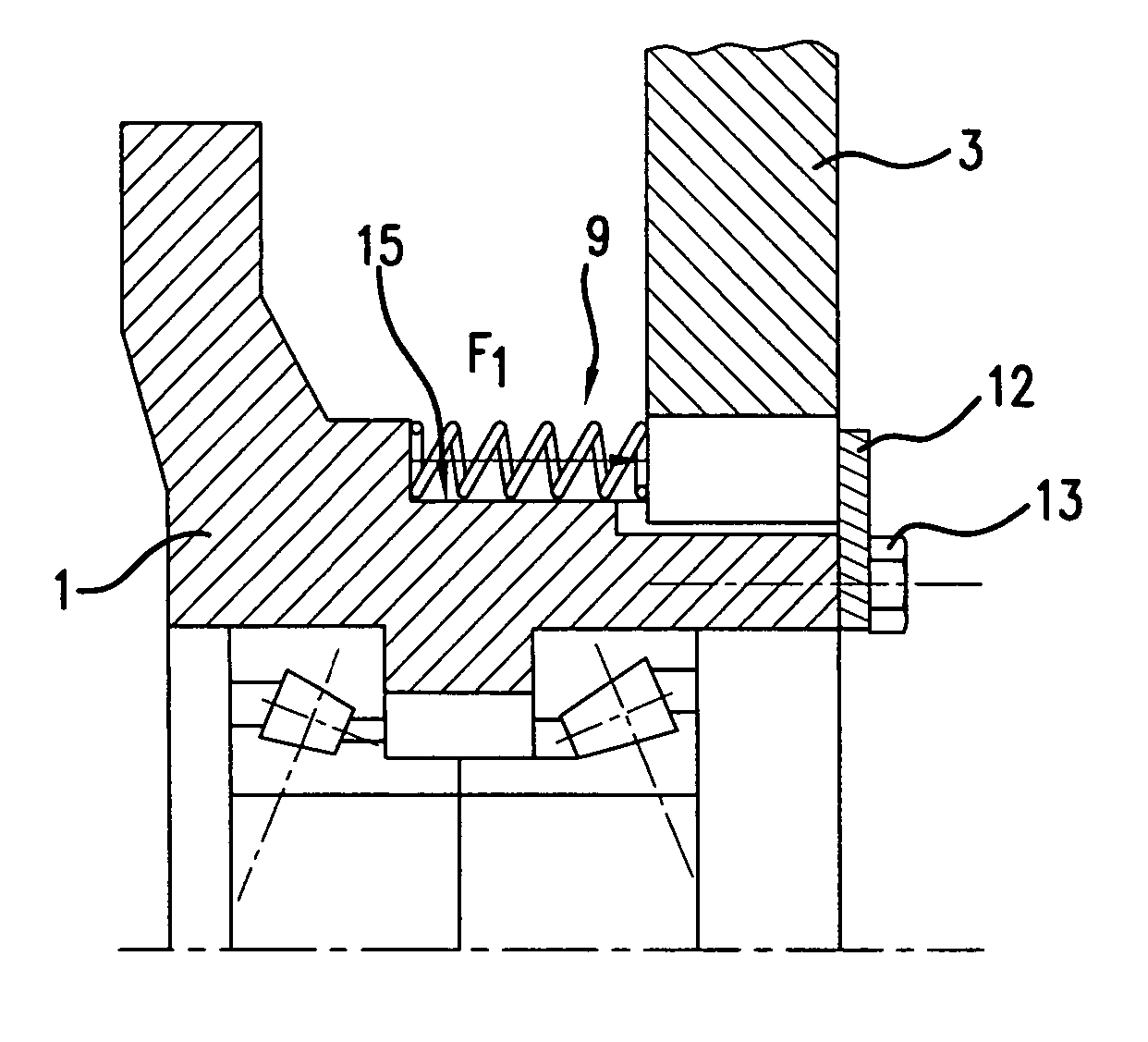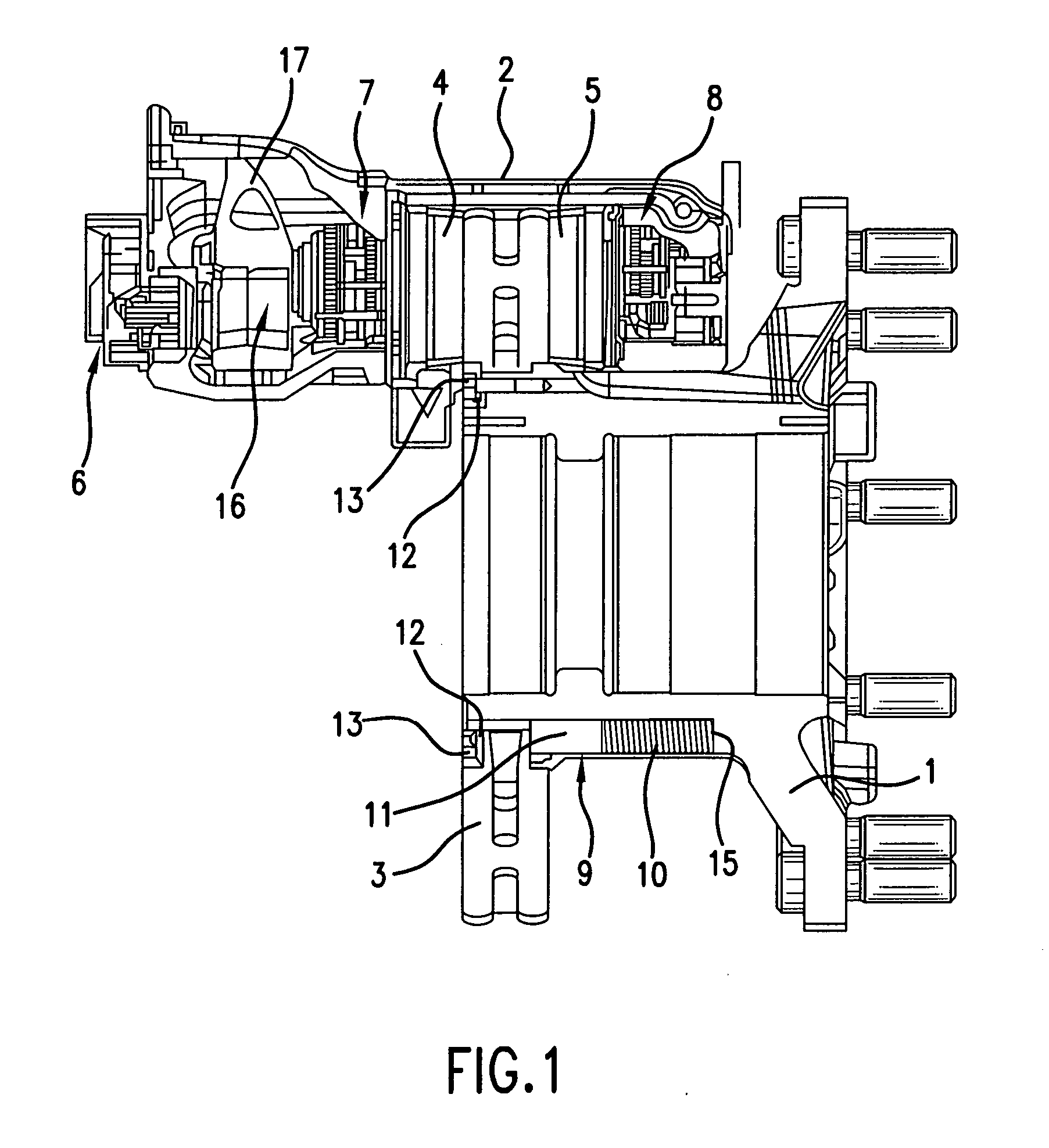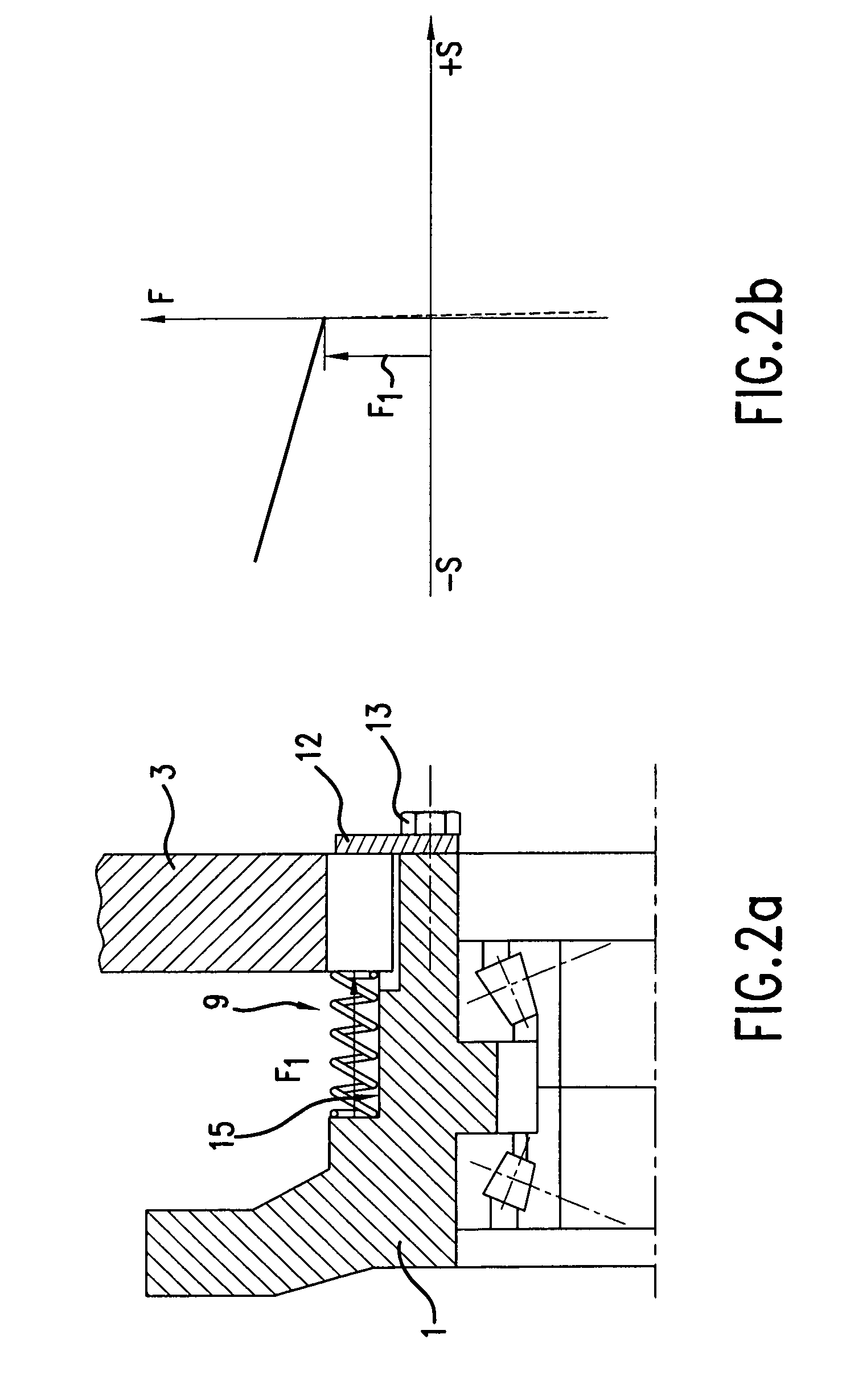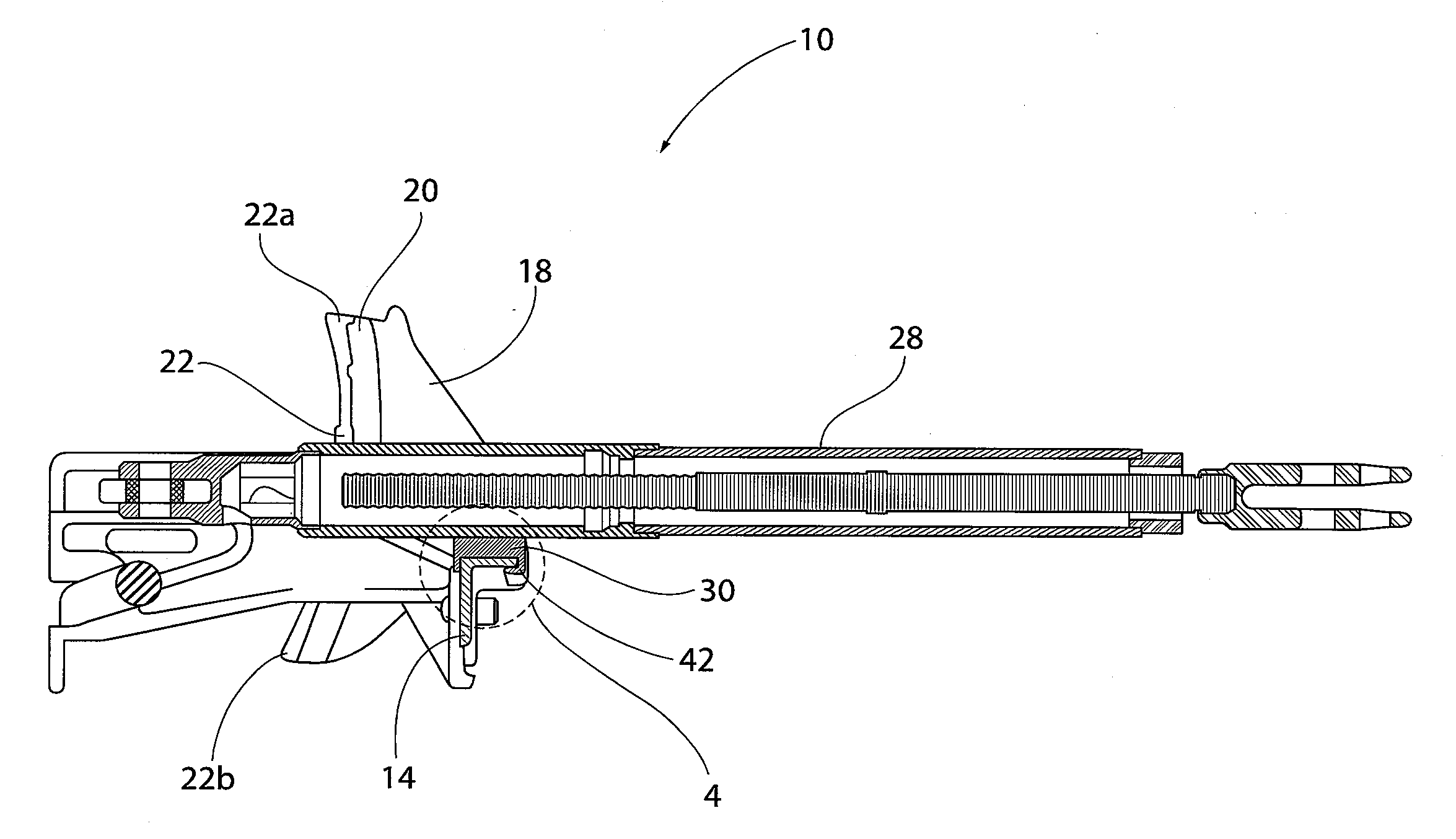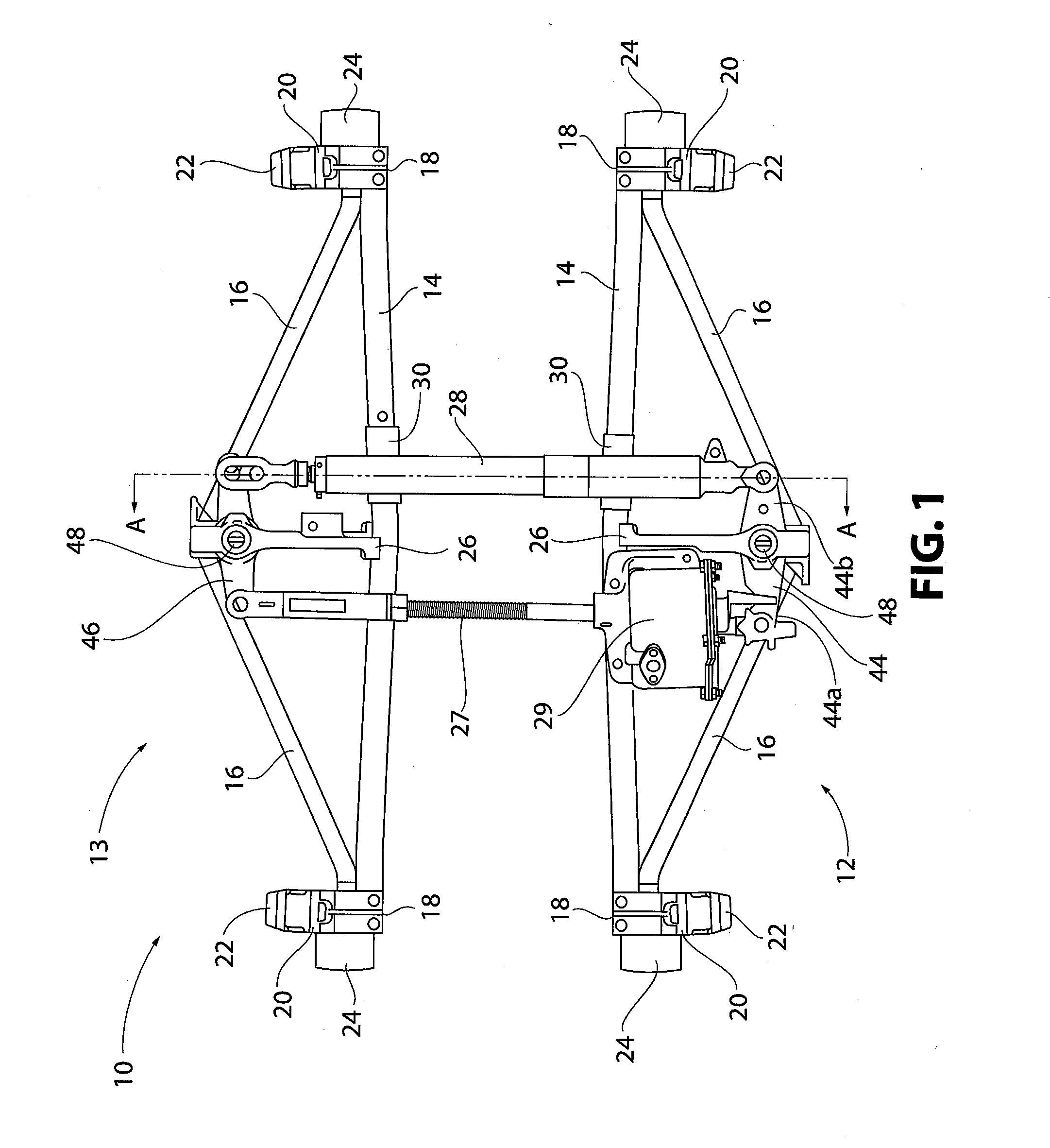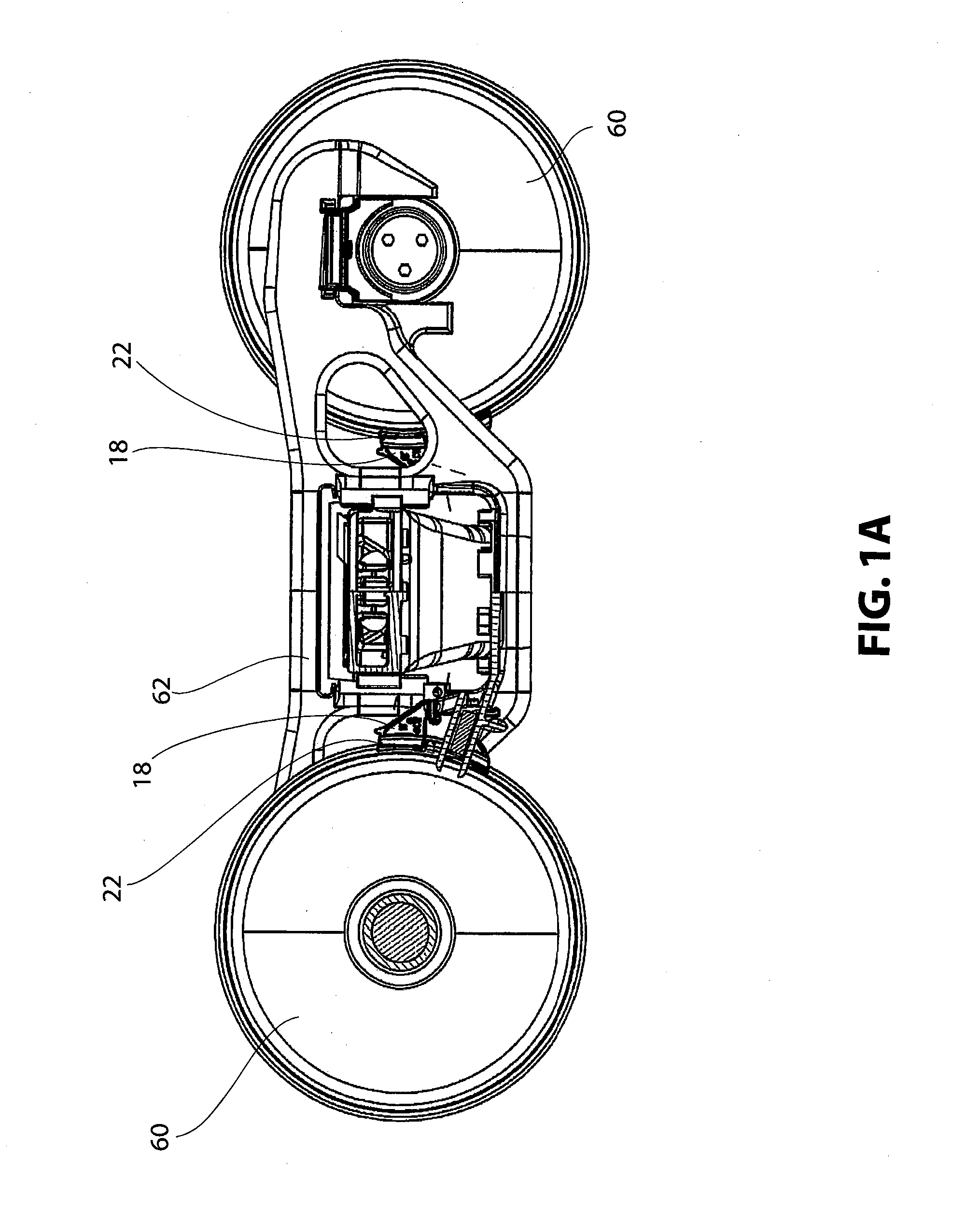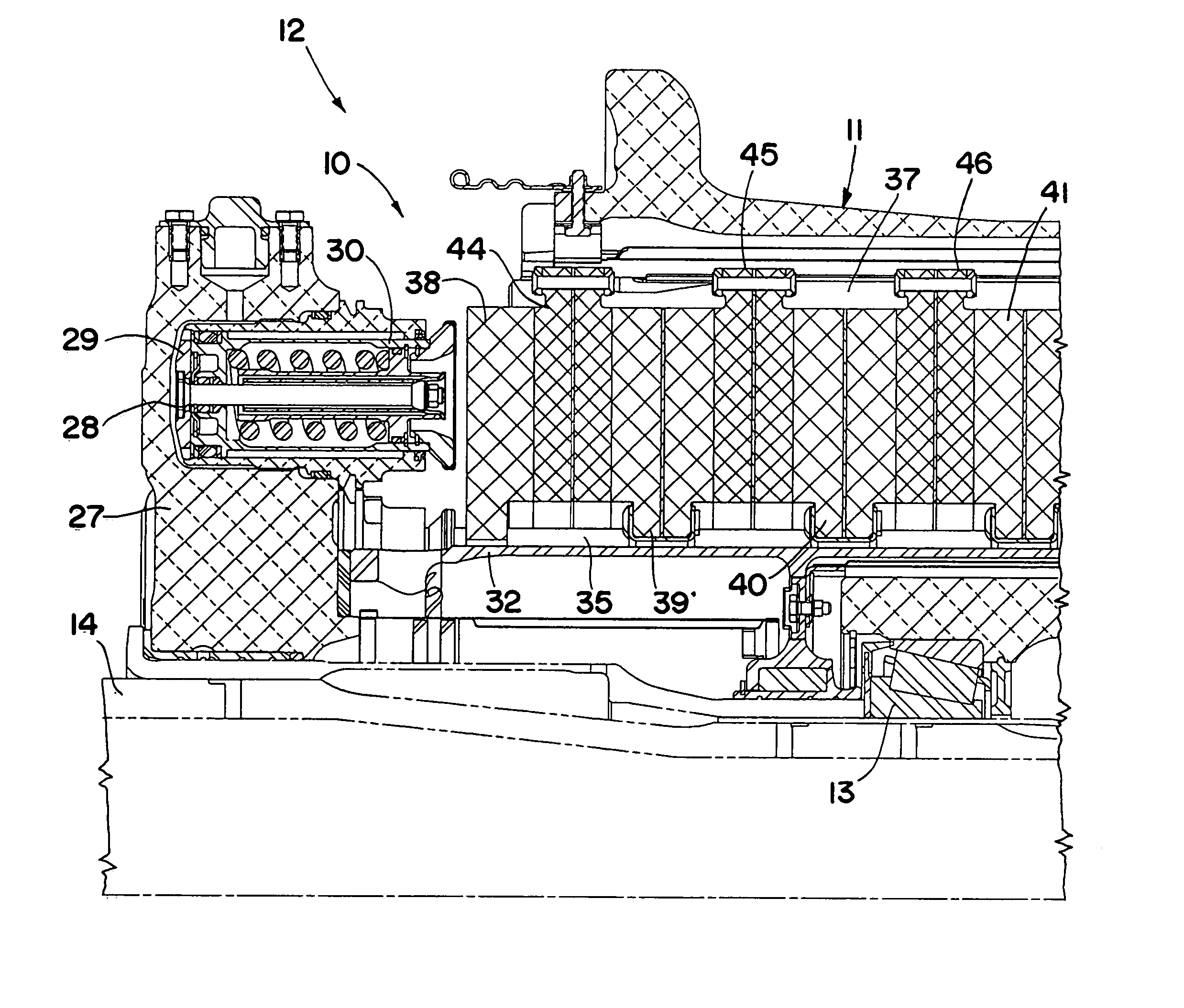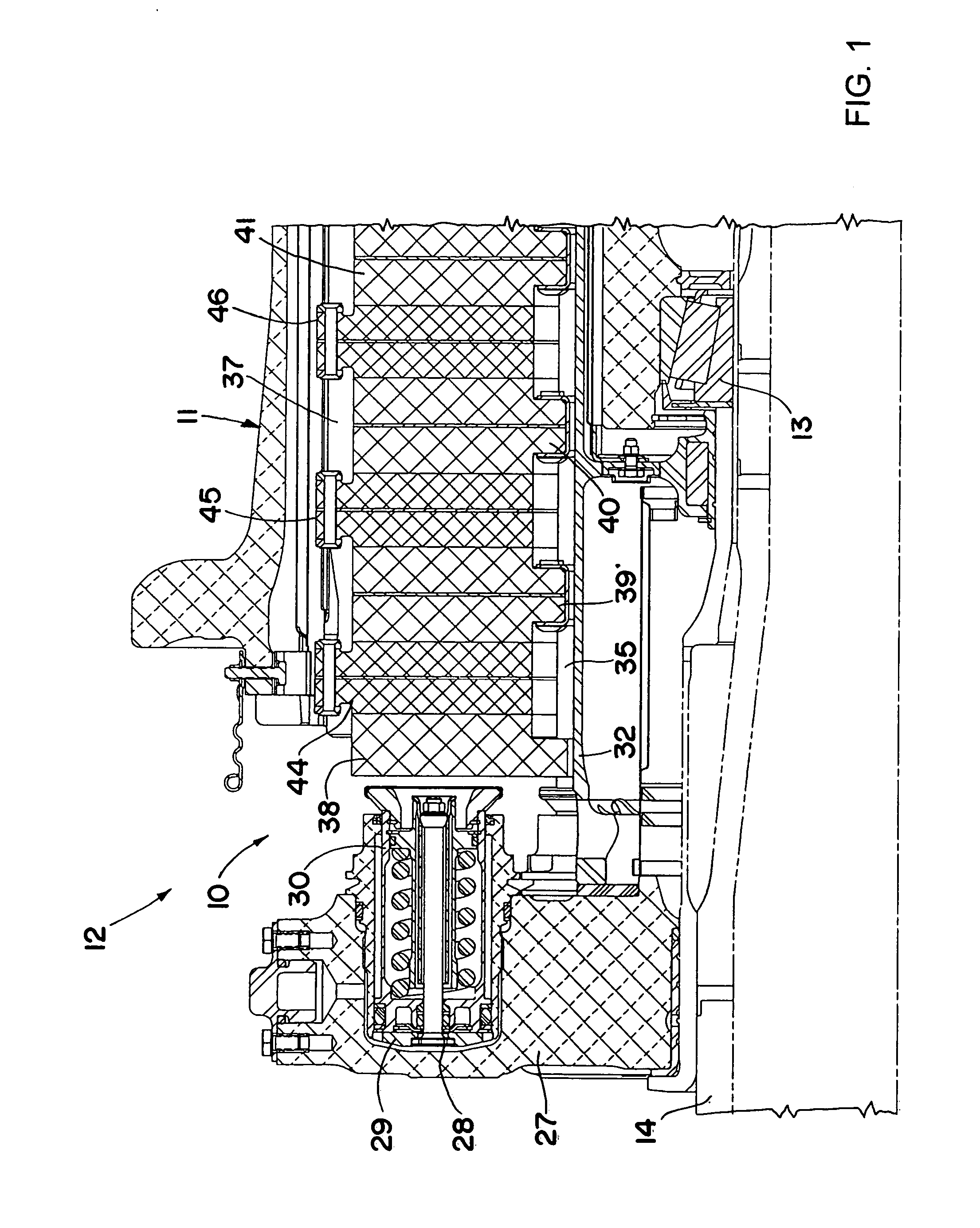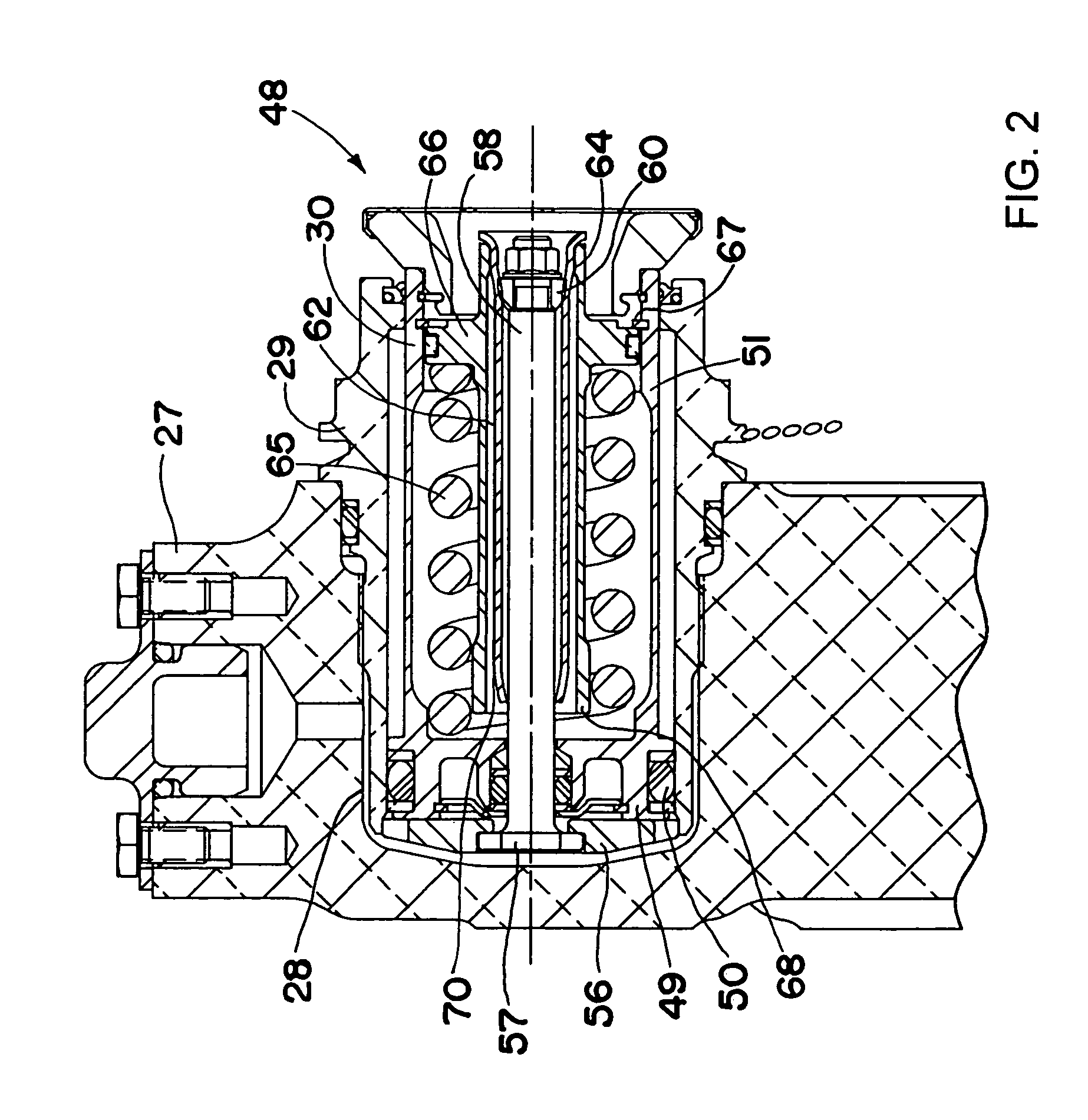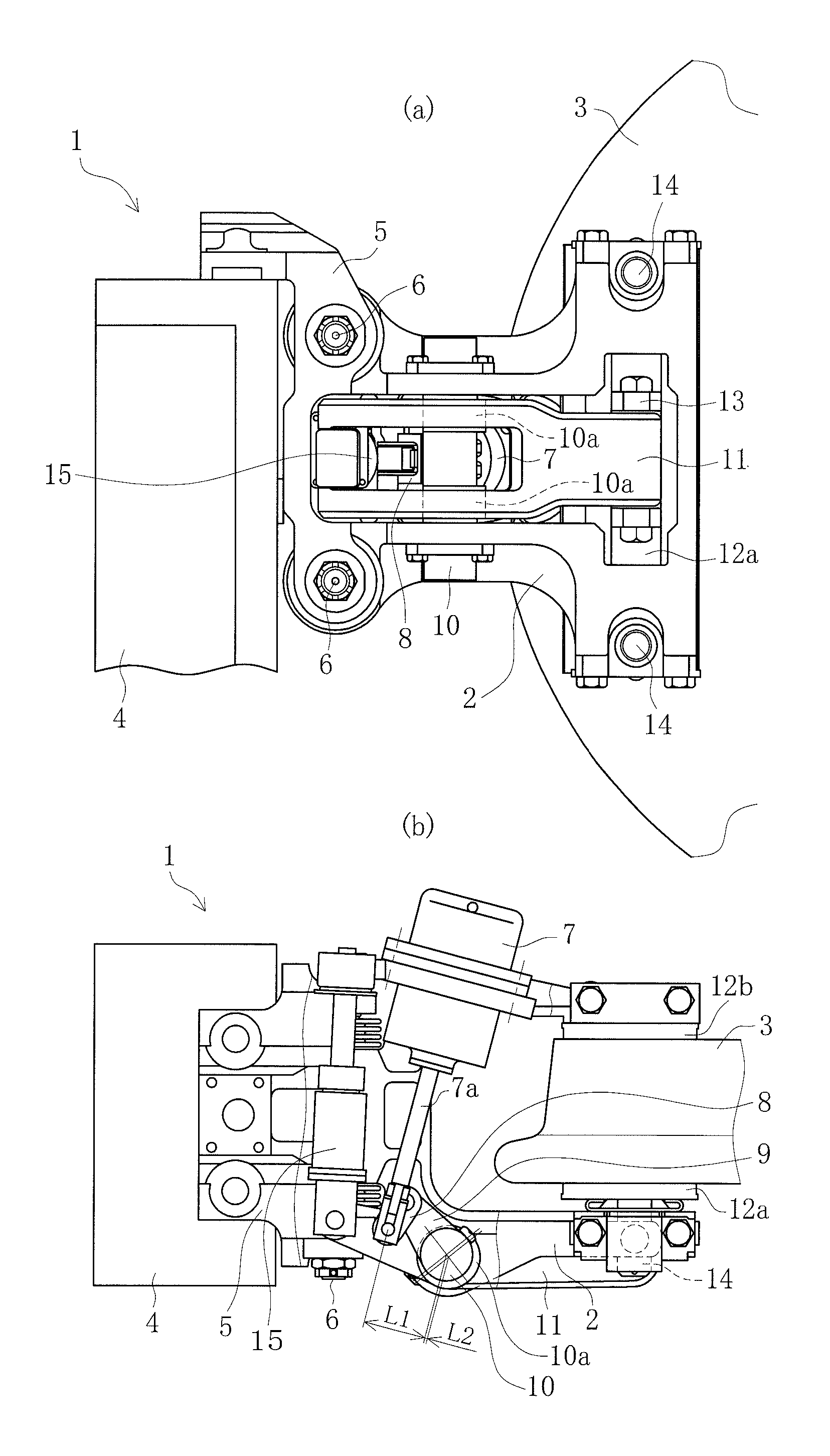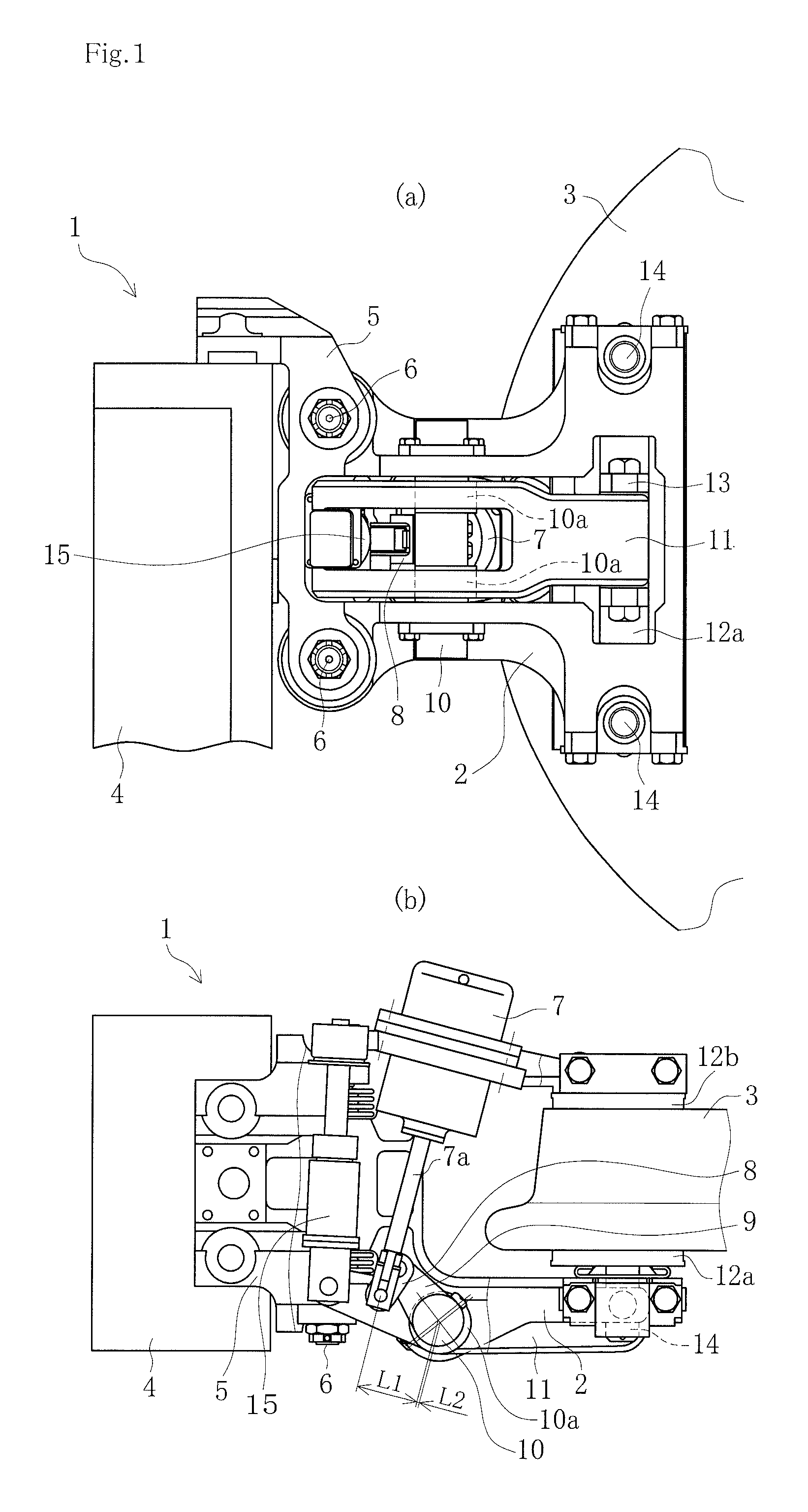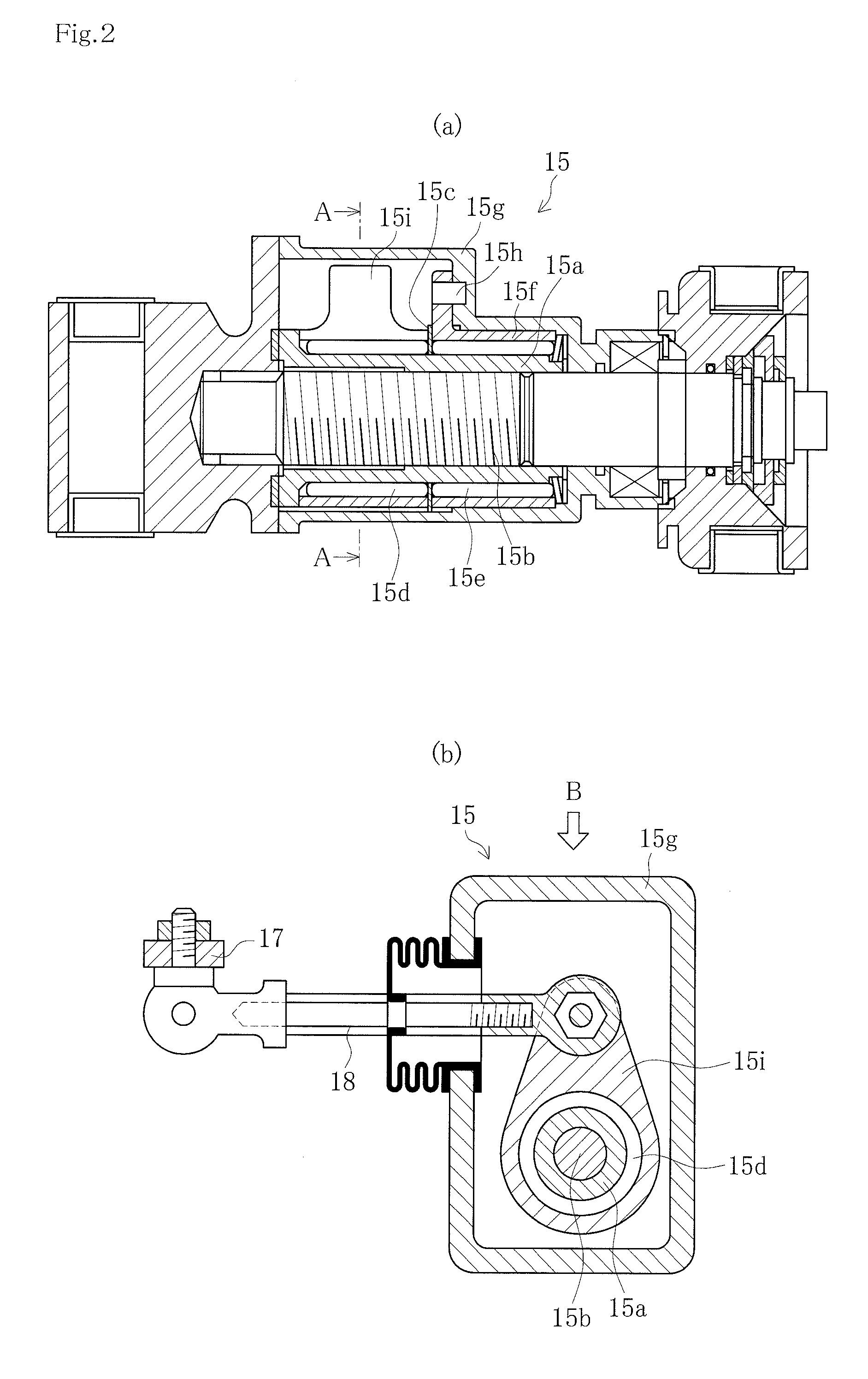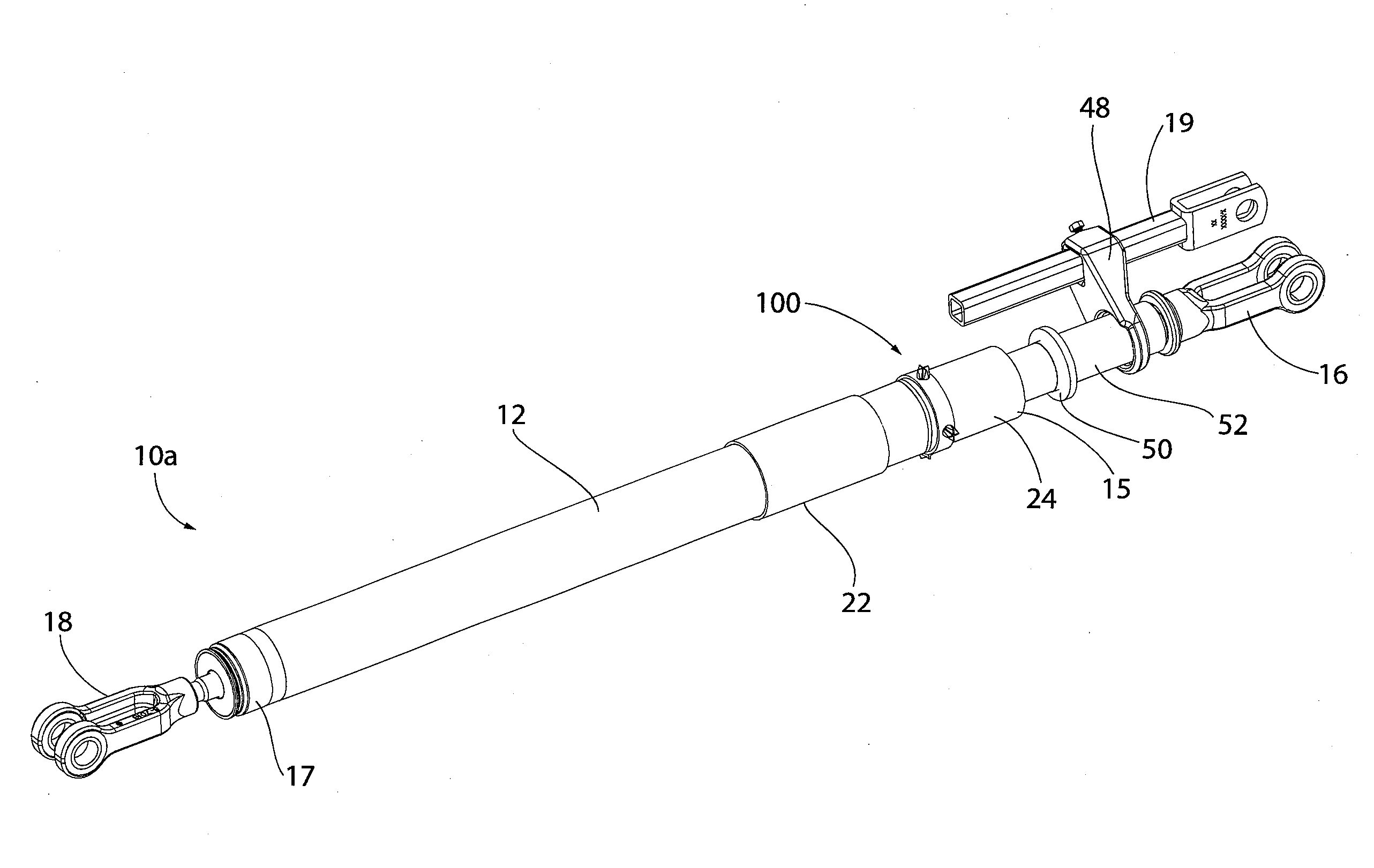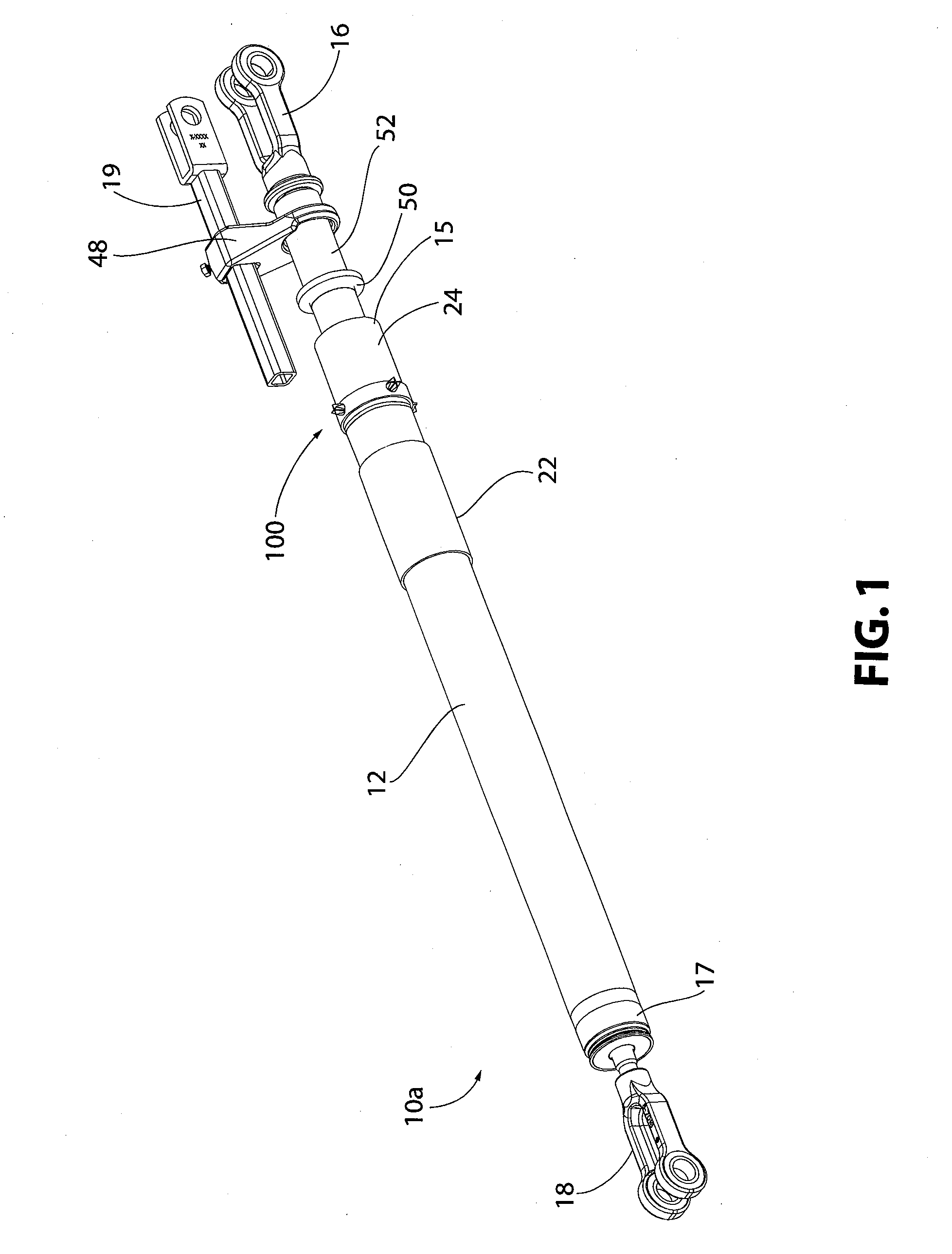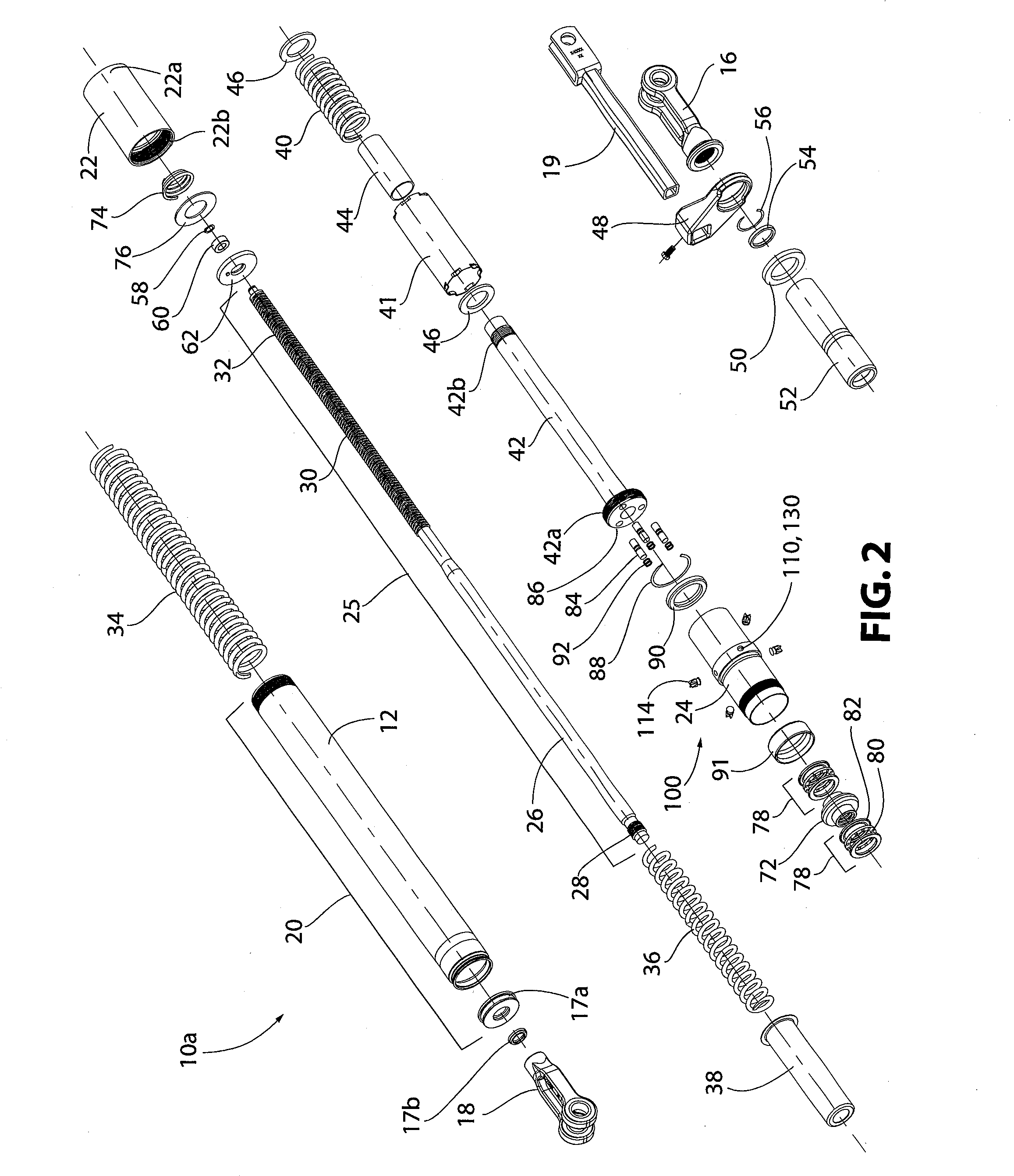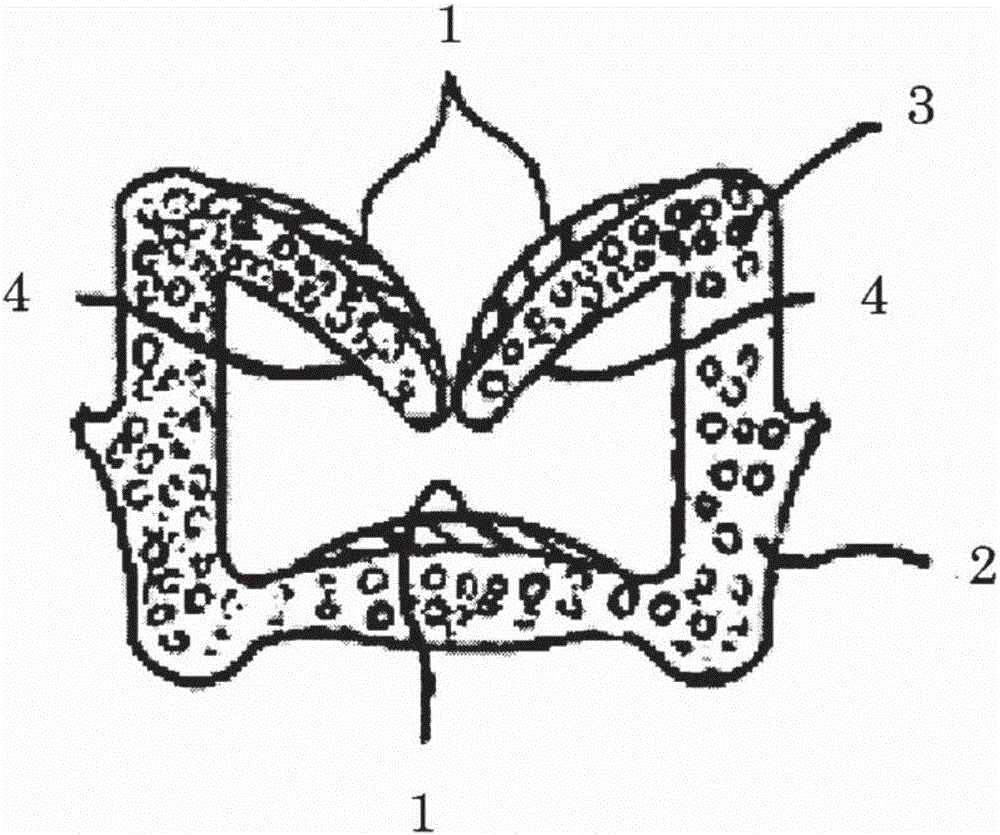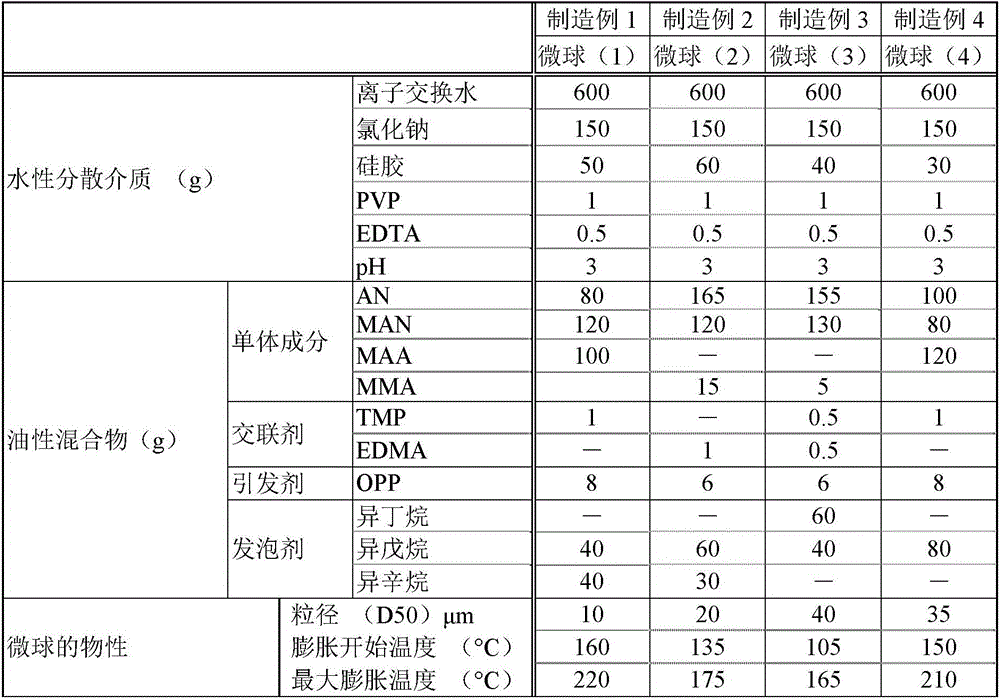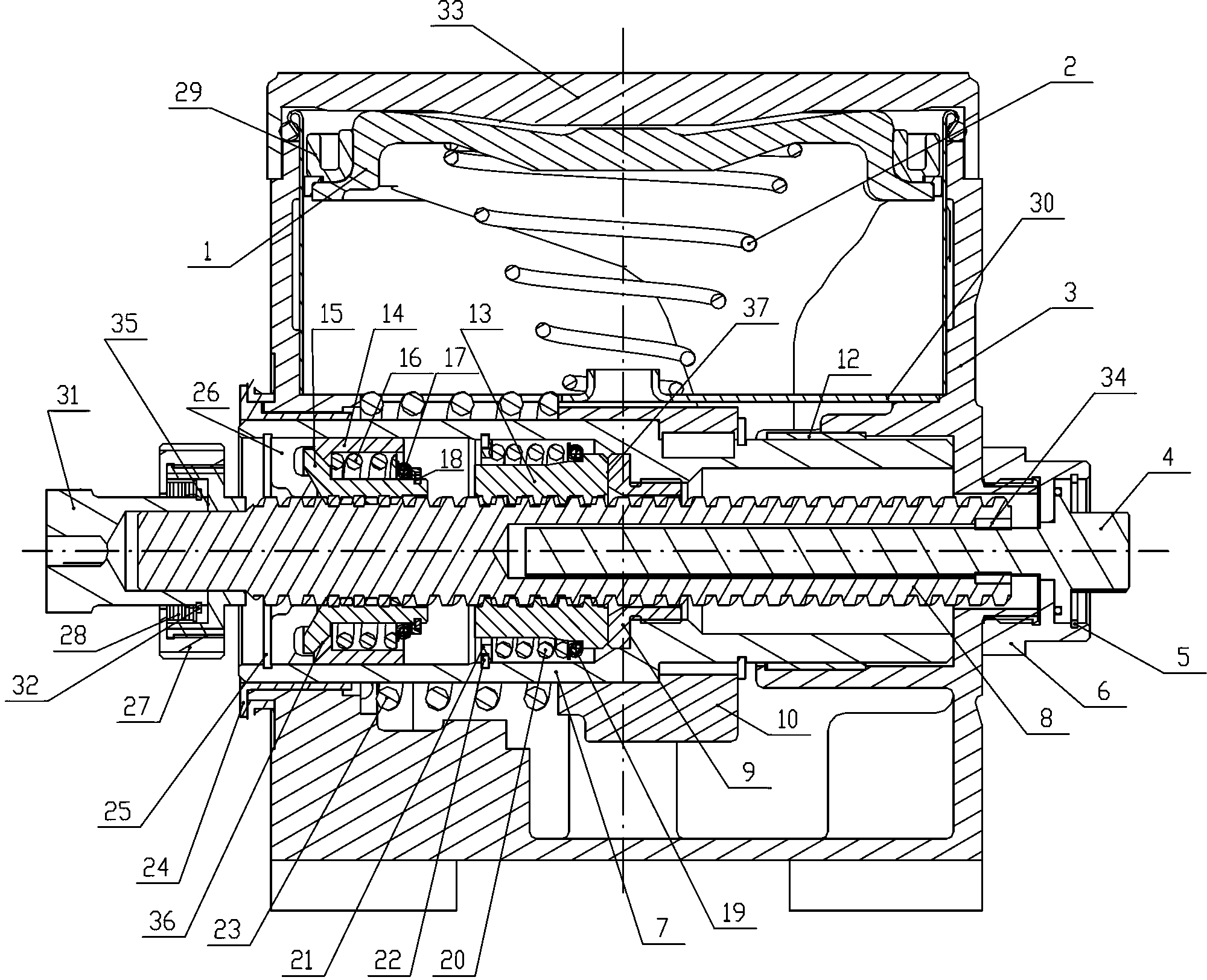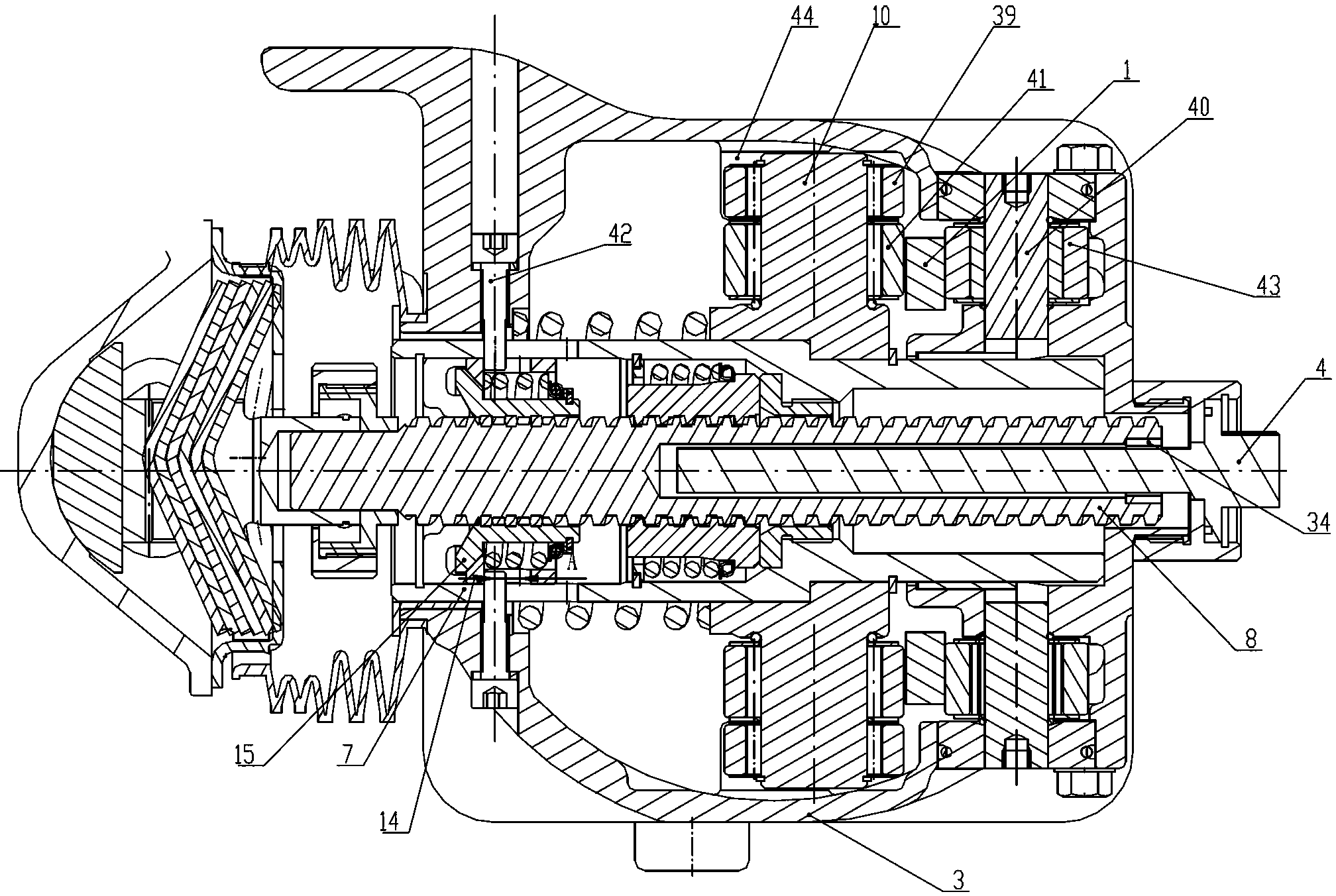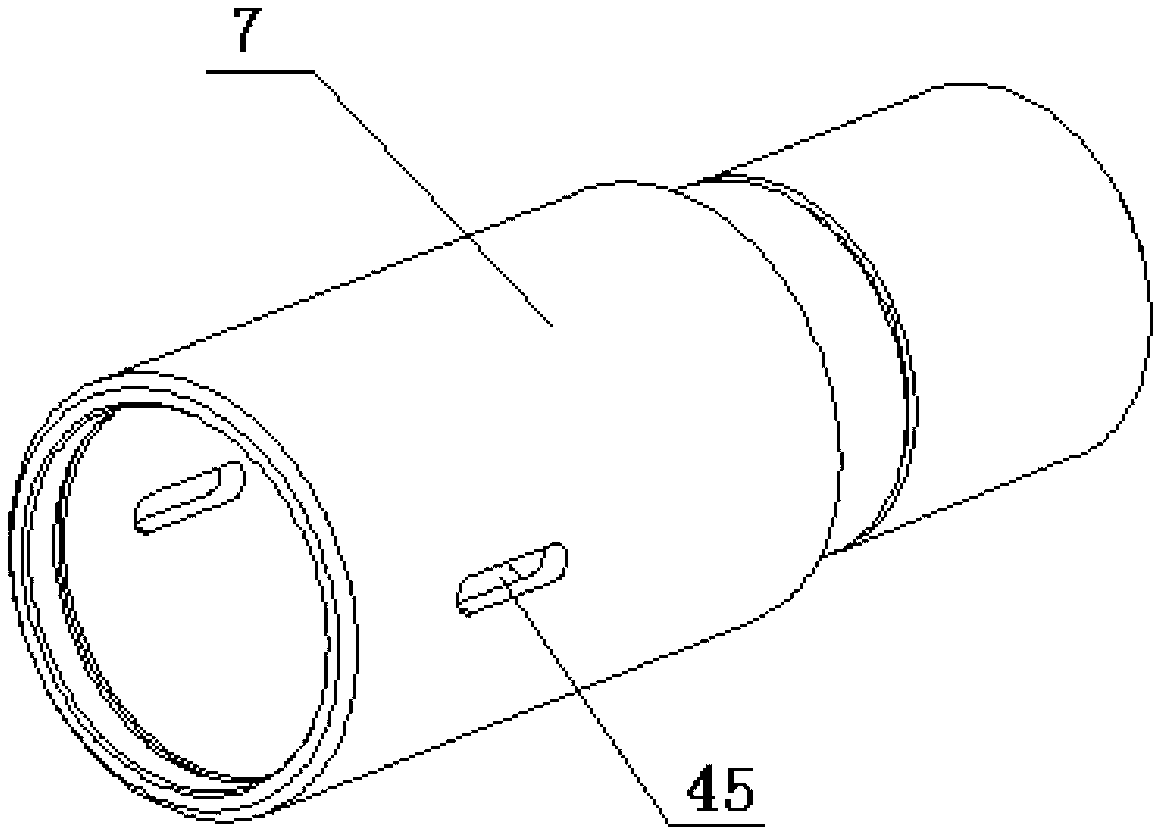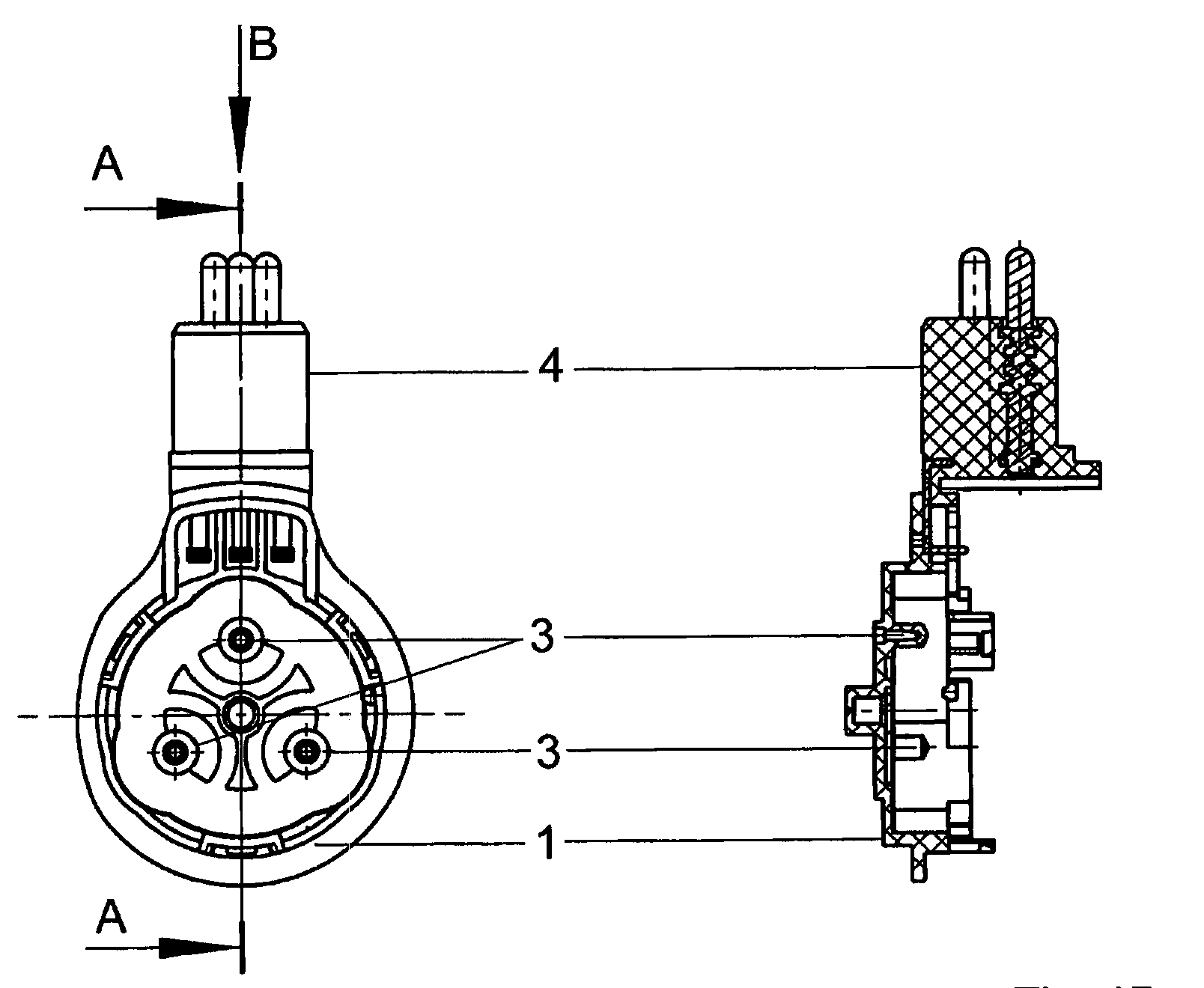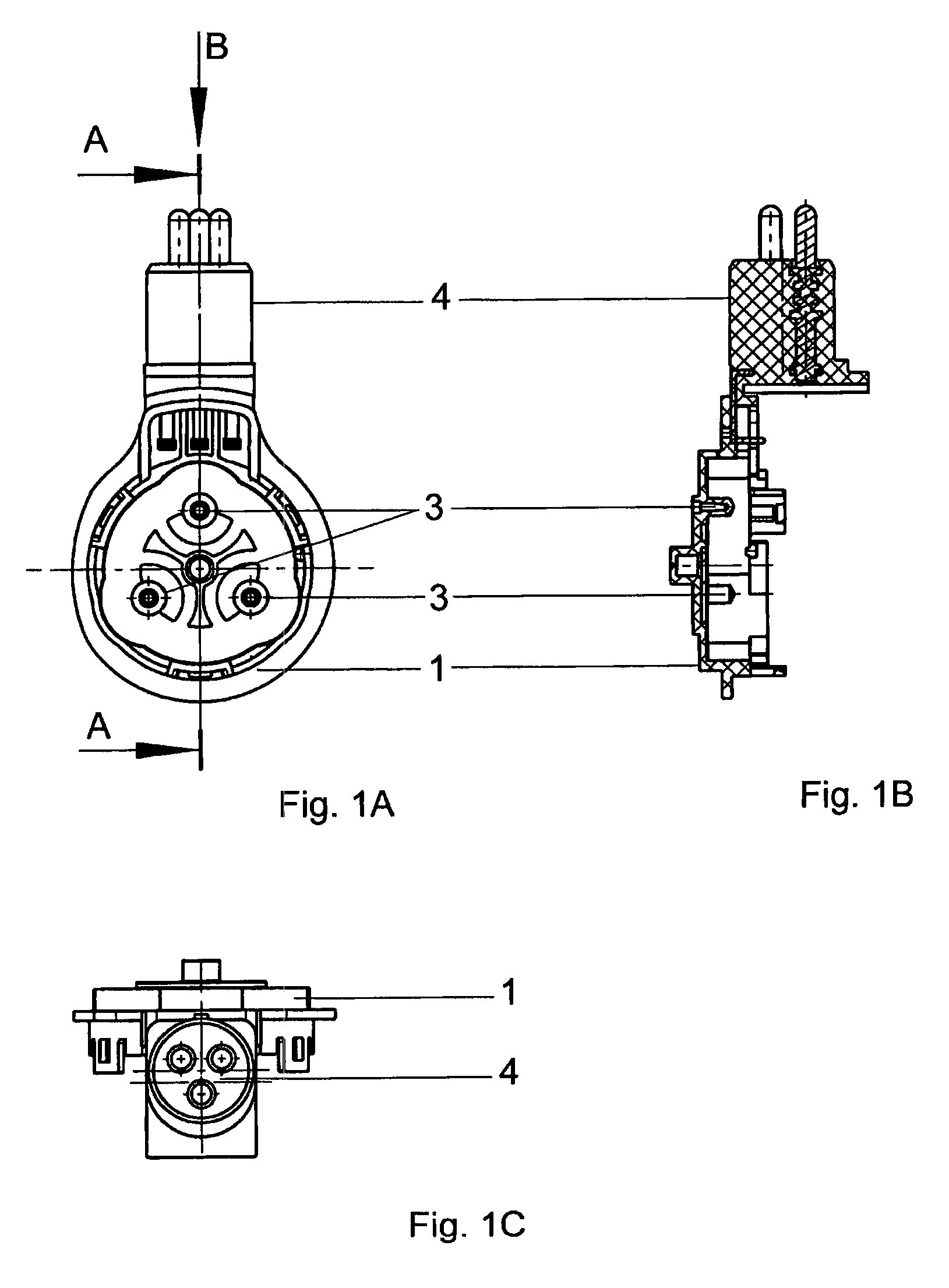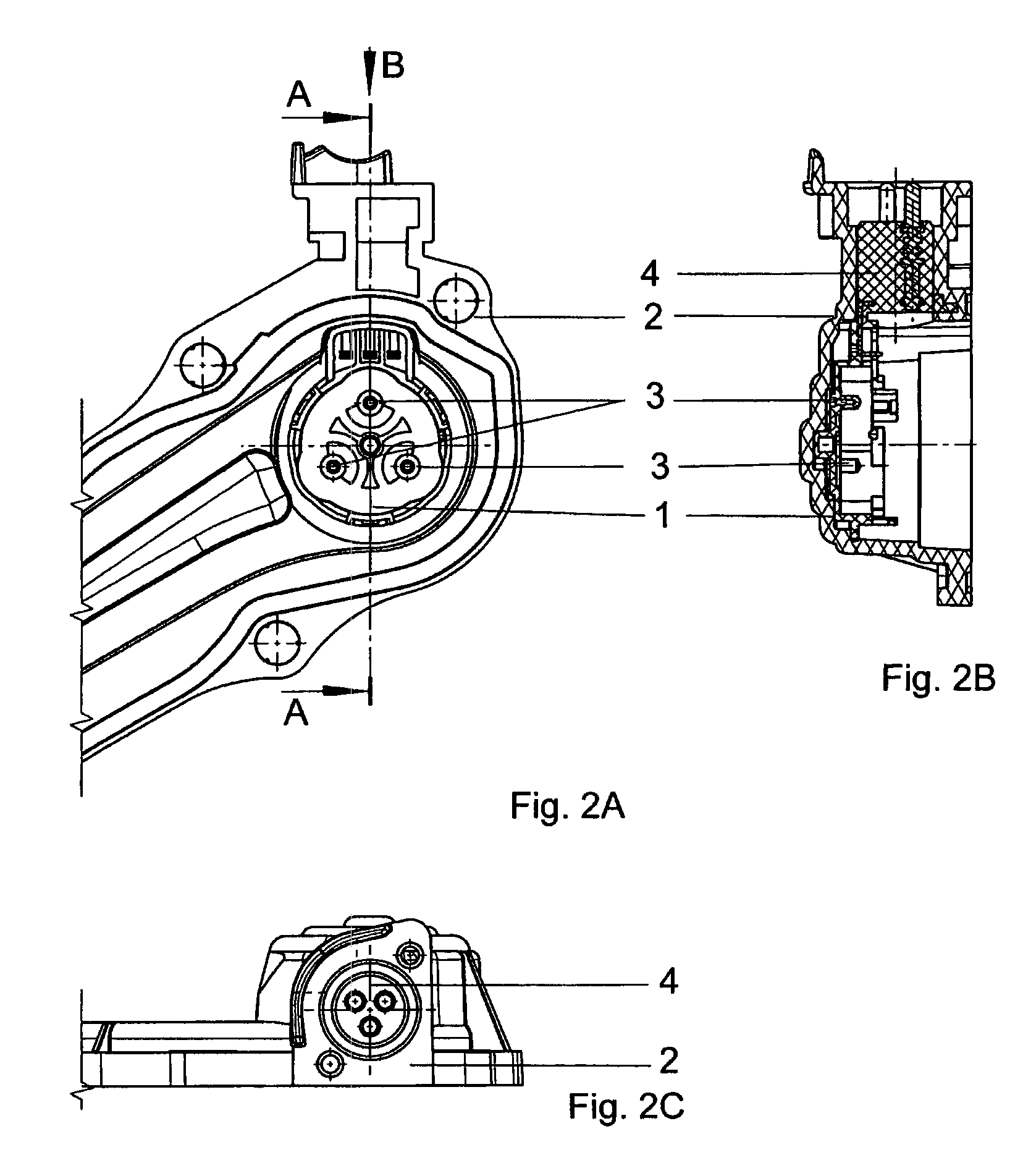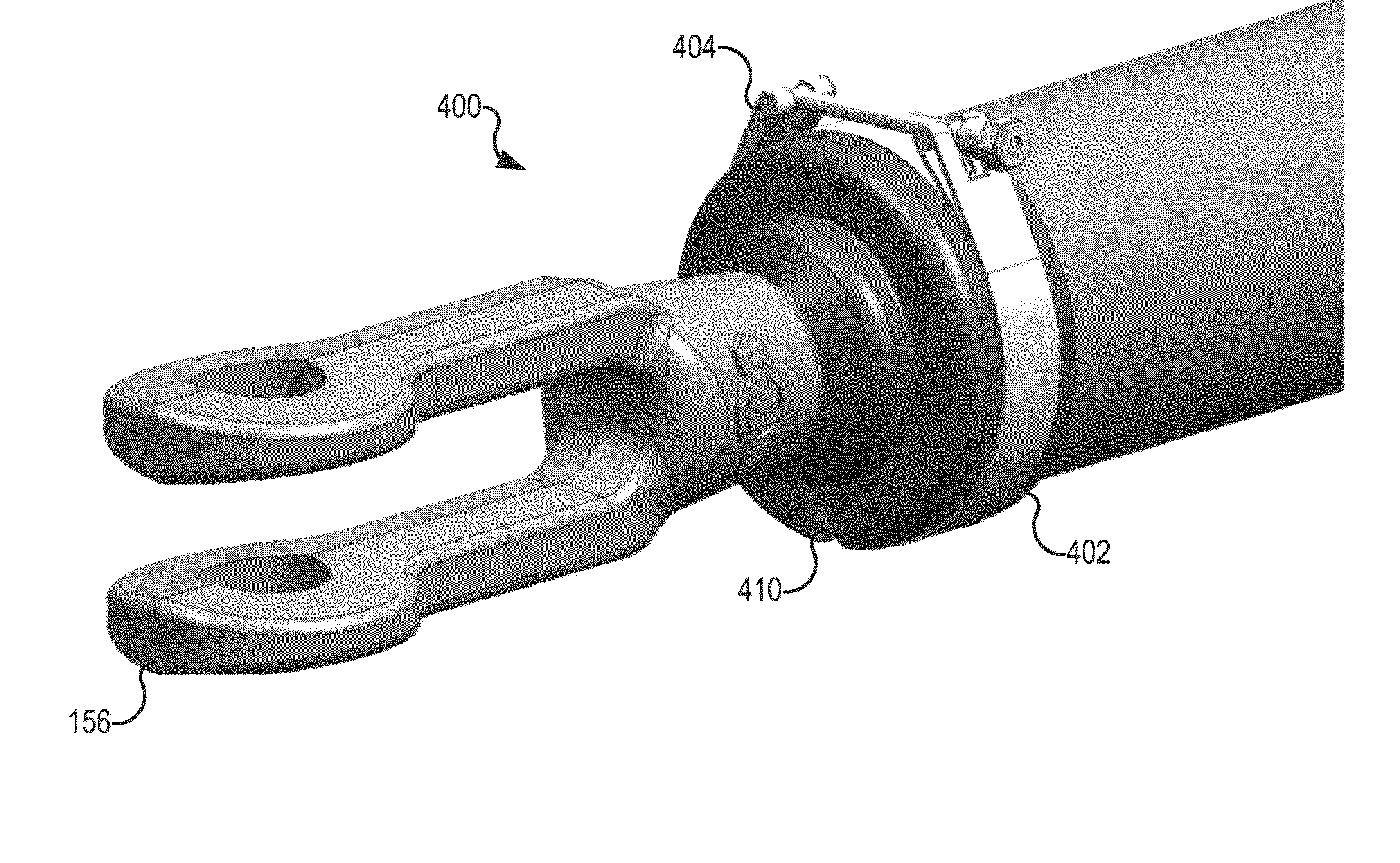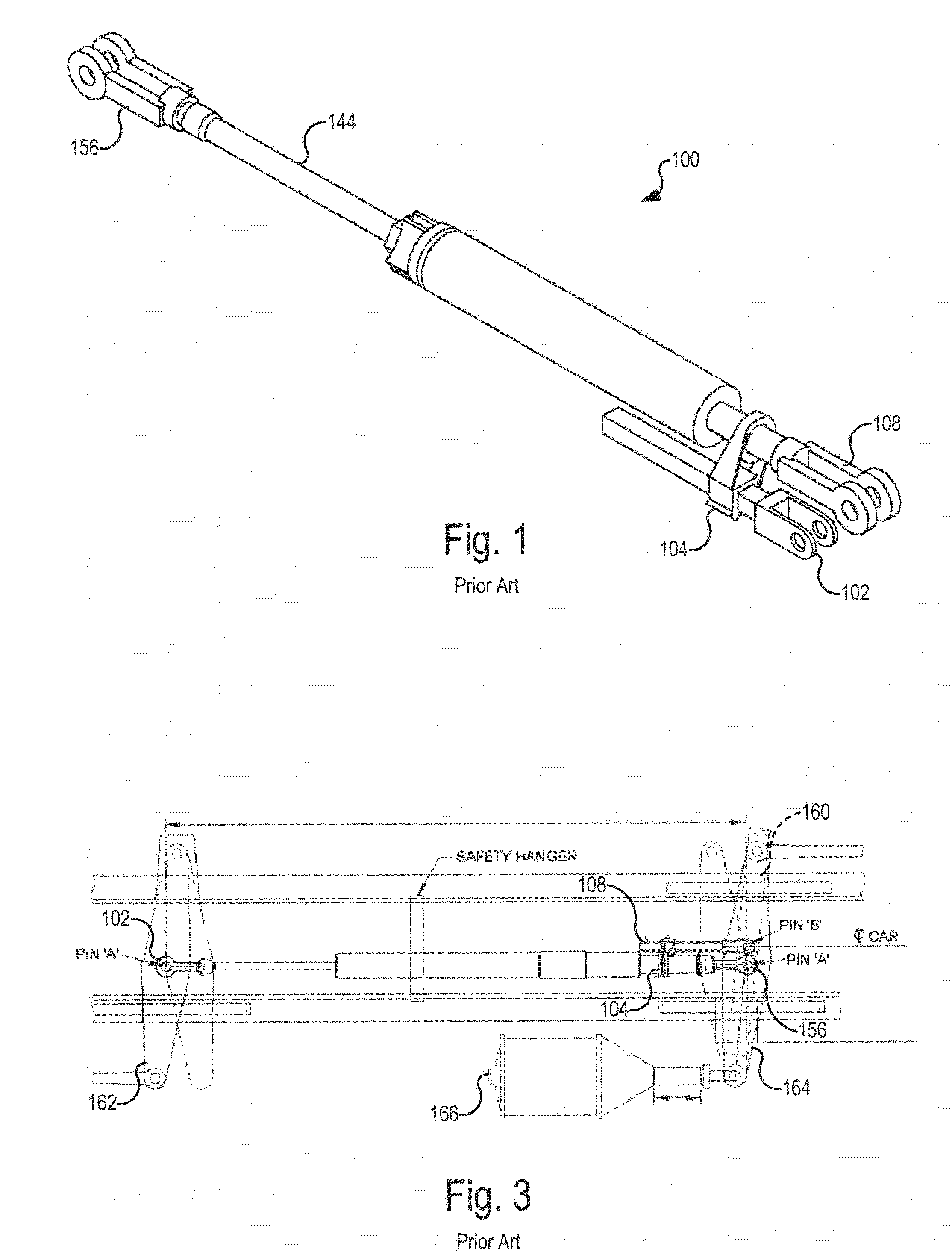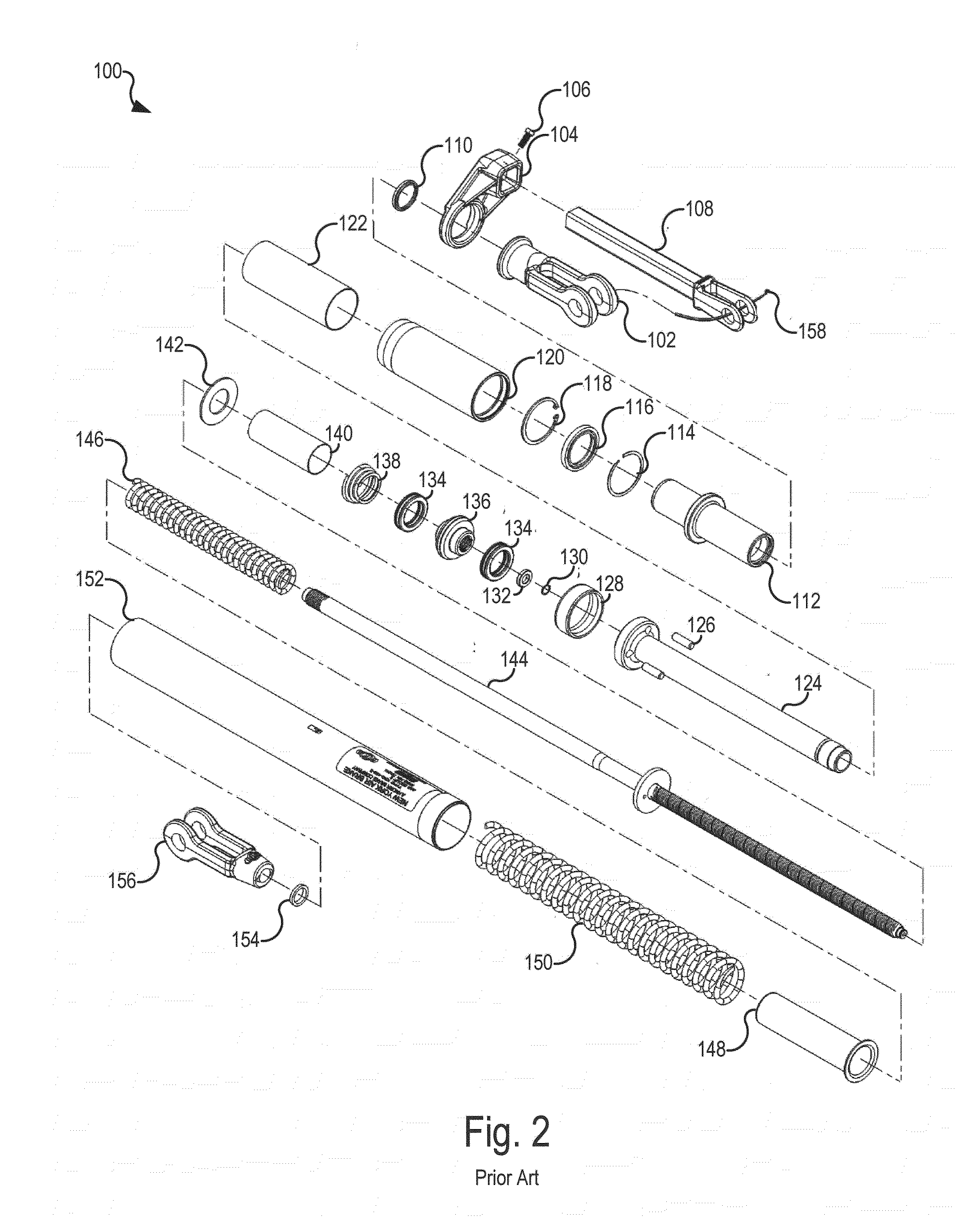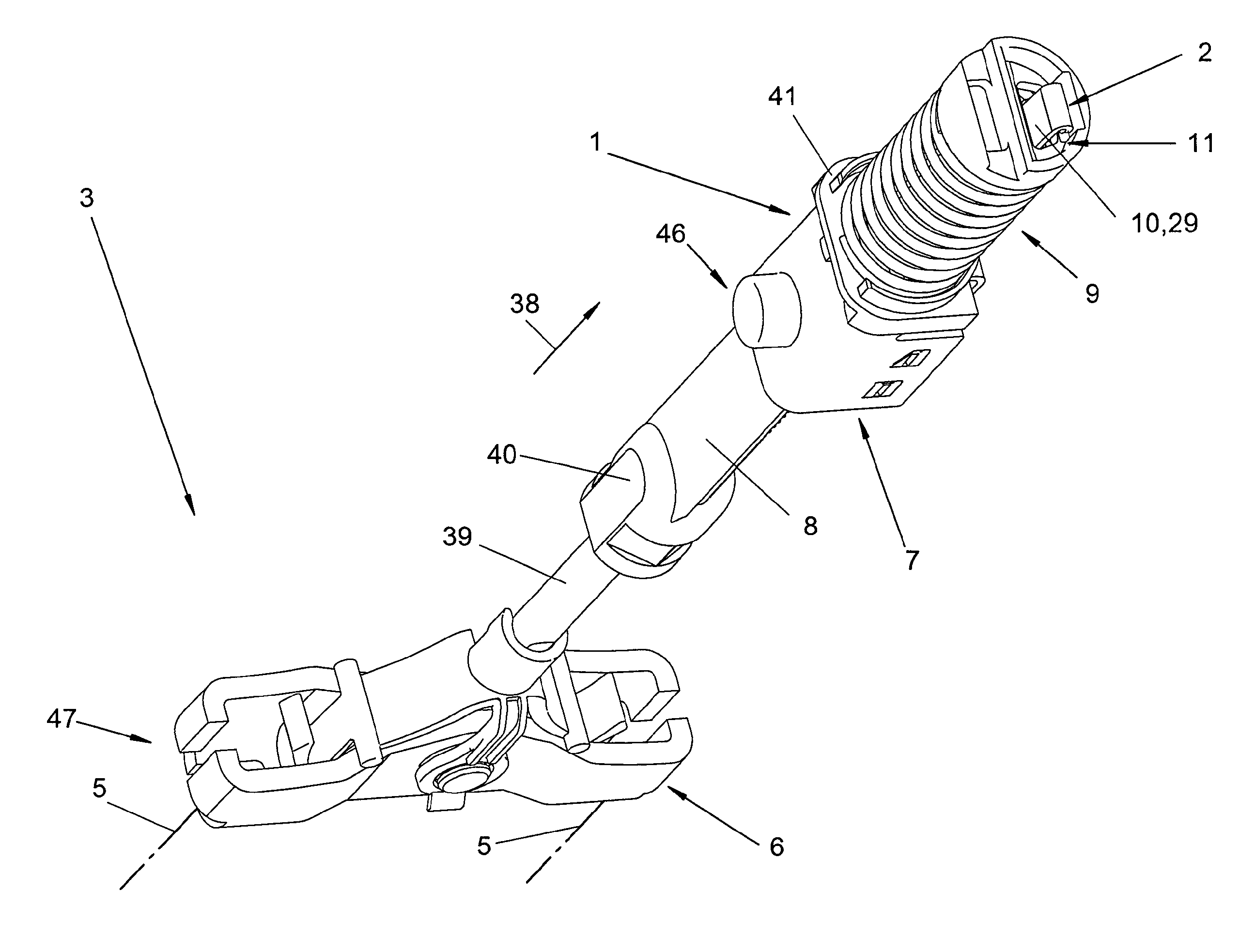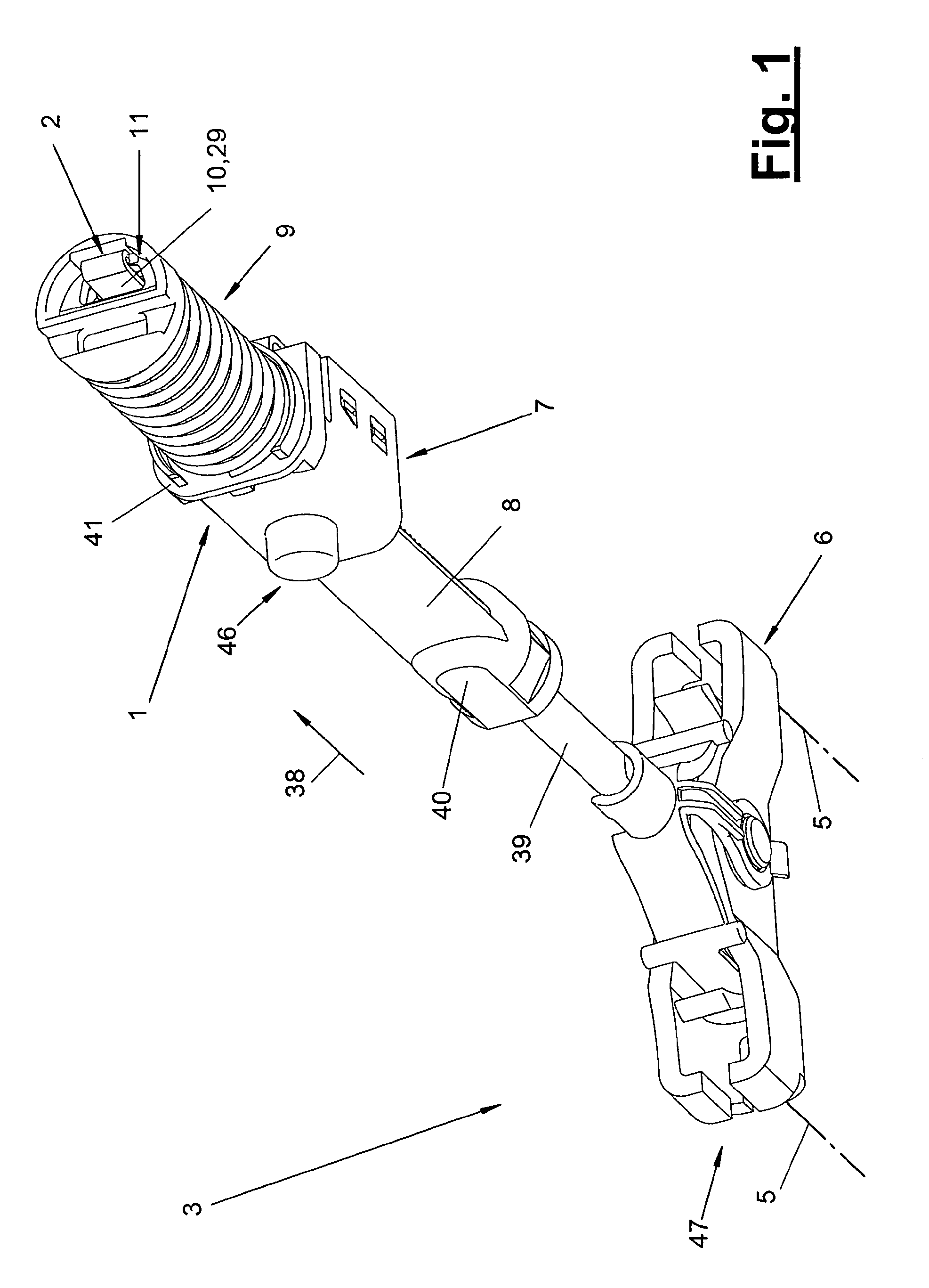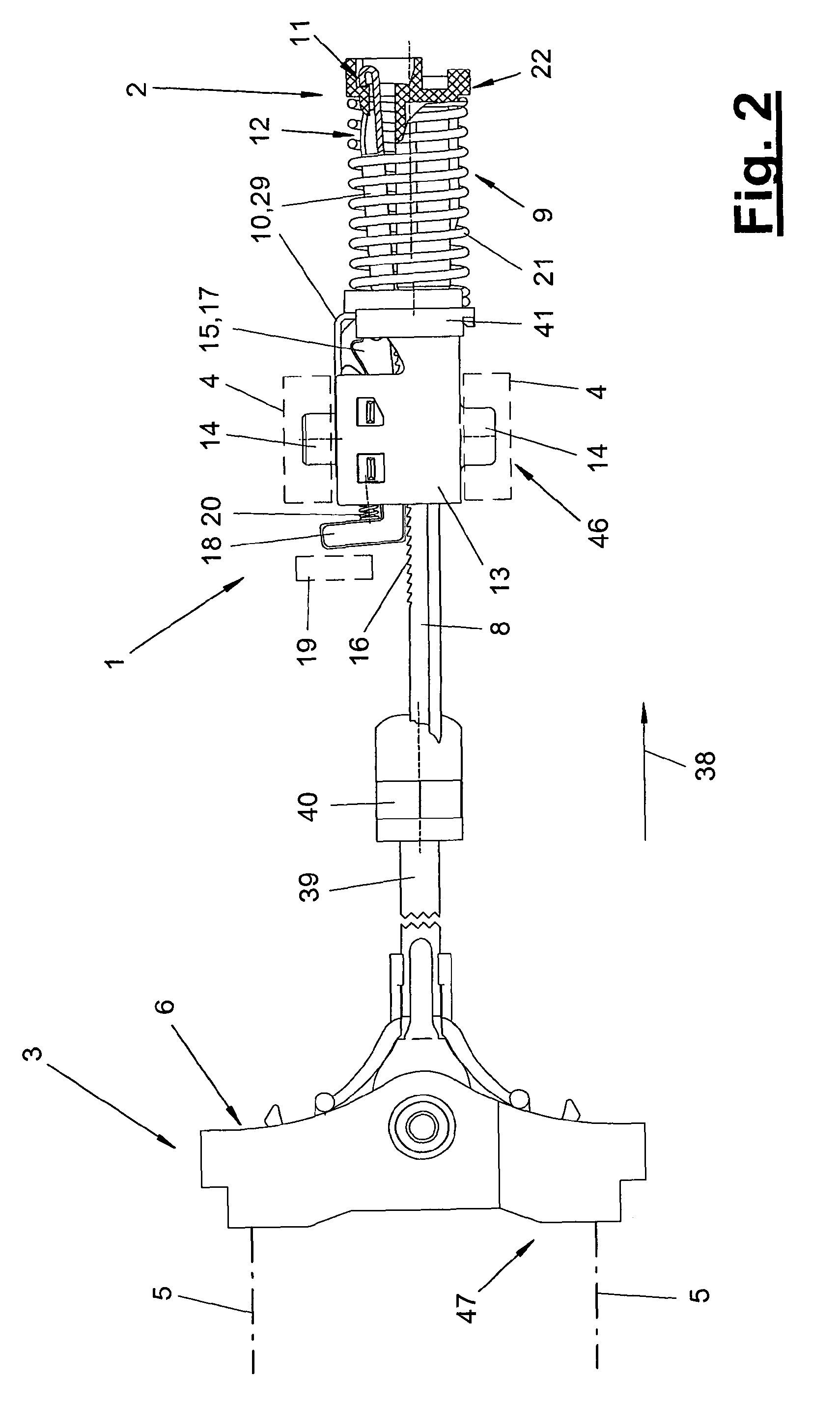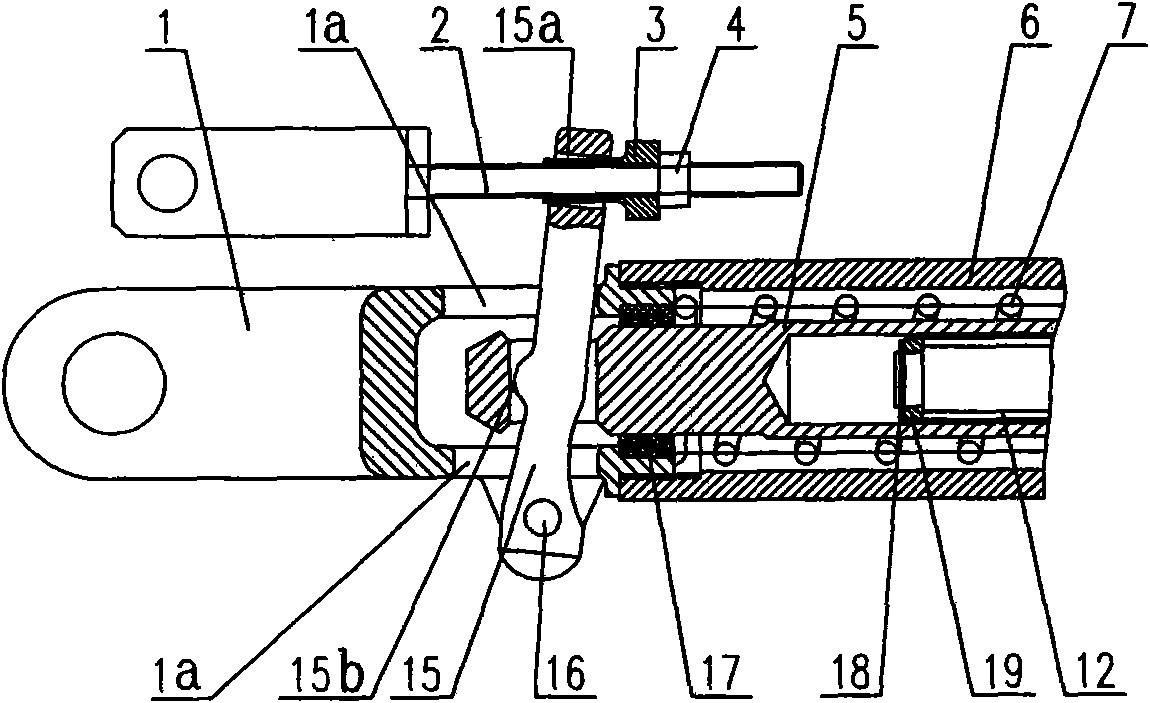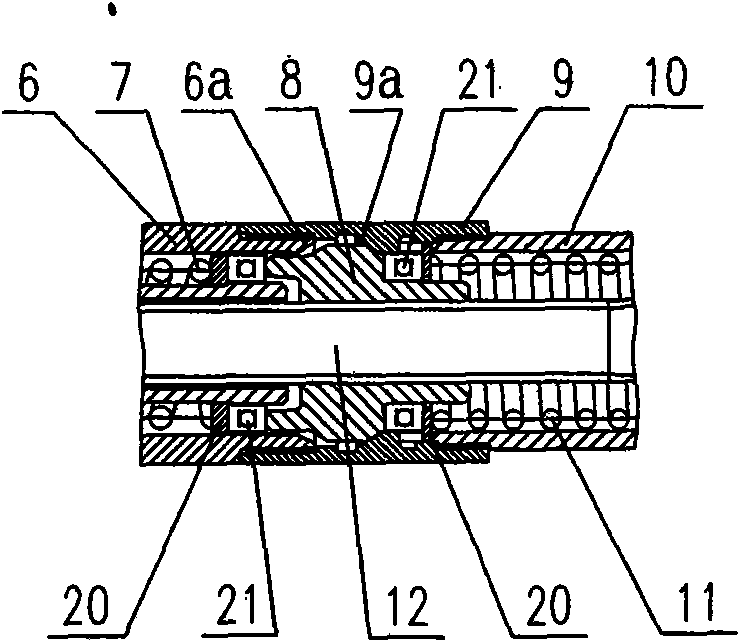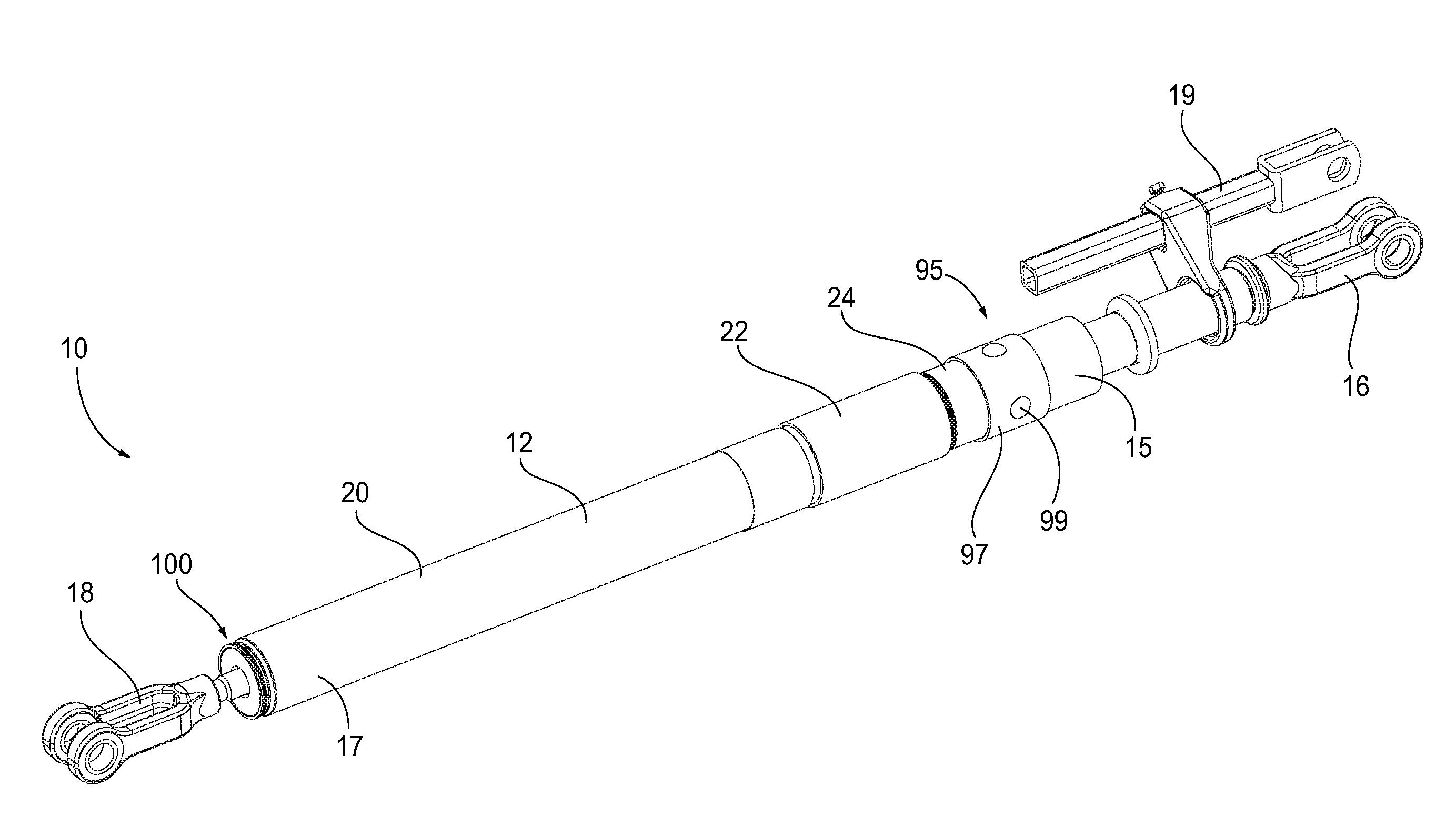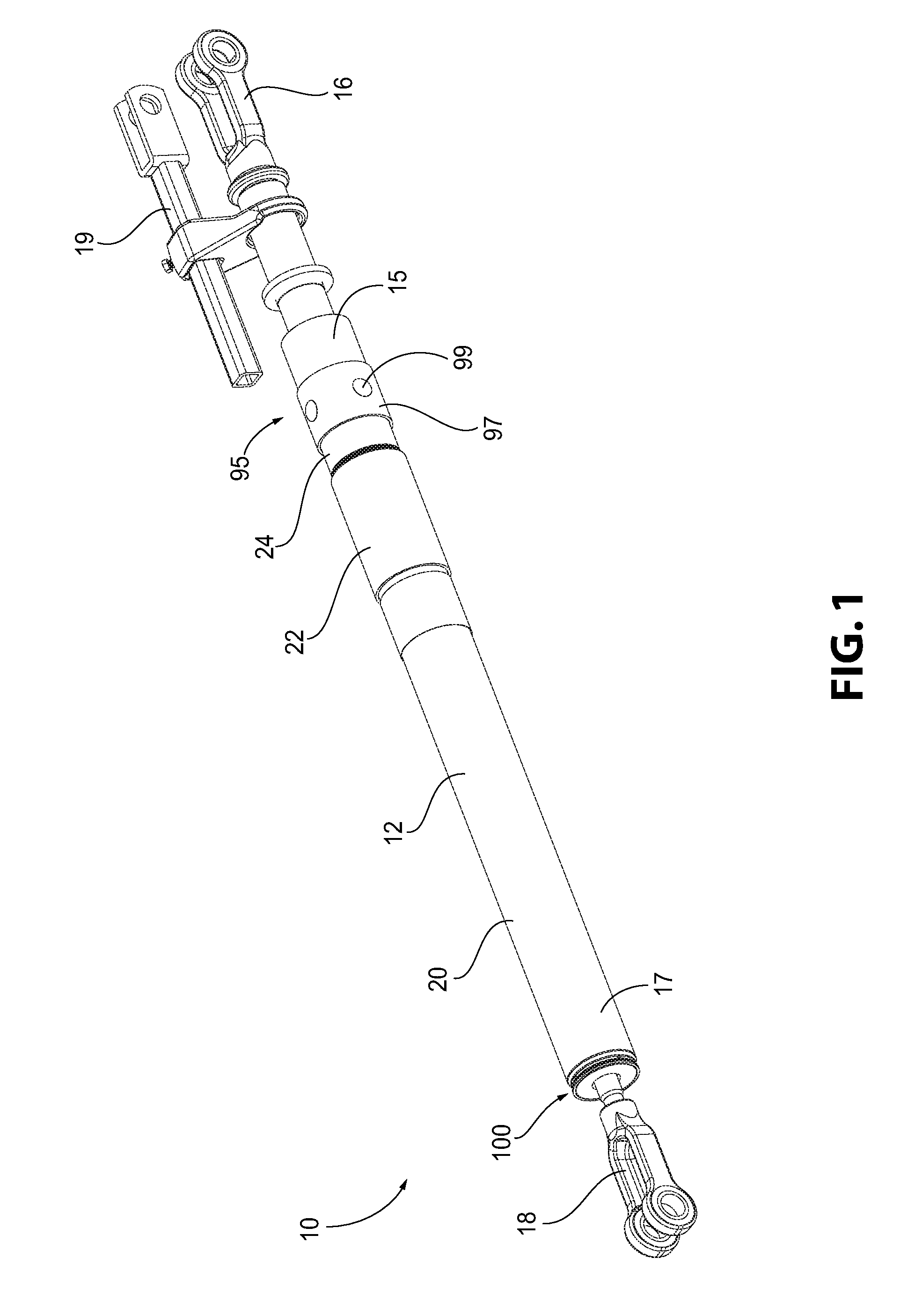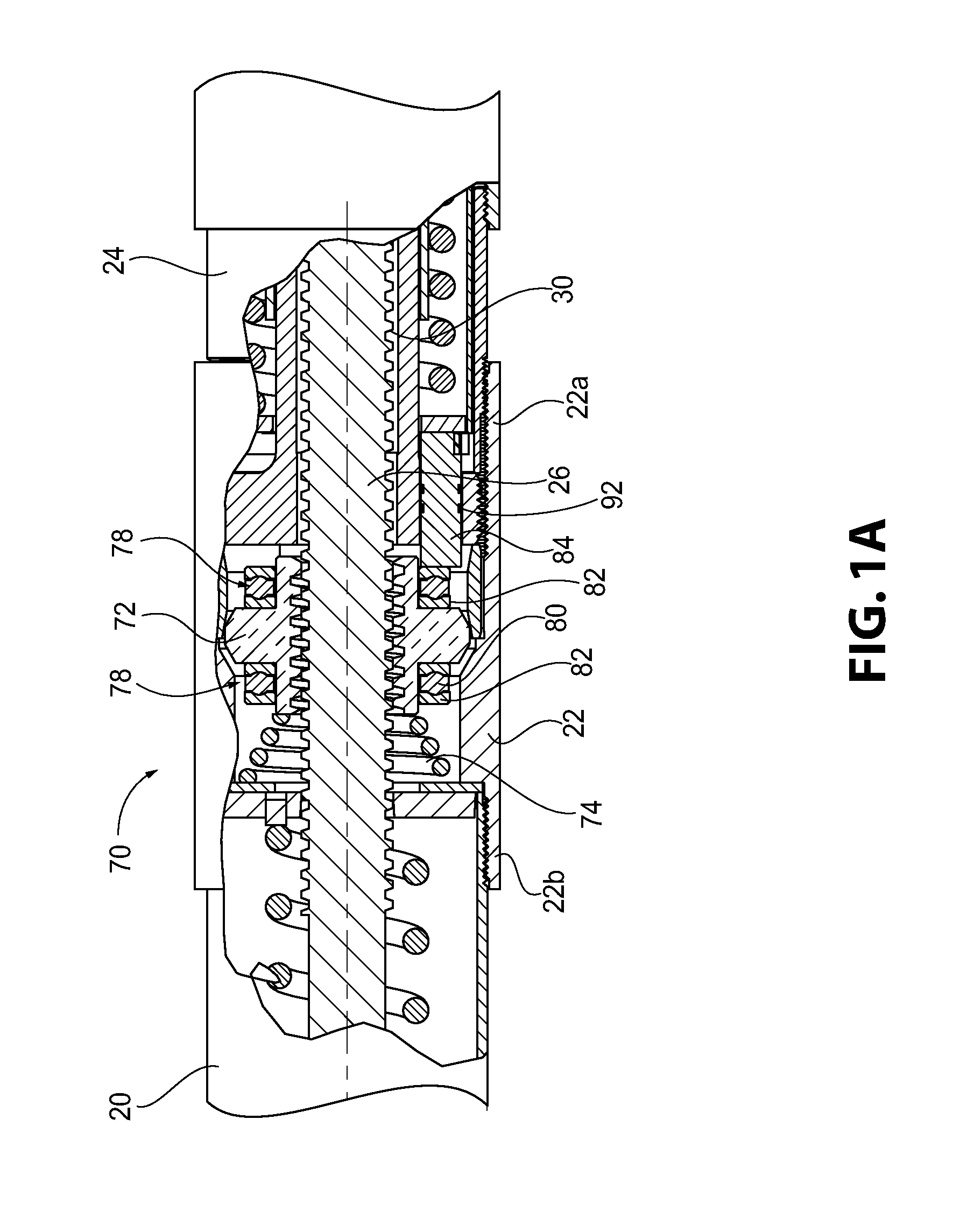Patents
Literature
137results about "Brake wear compensation mechanism" patented technology
Efficacy Topic
Property
Owner
Technical Advancement
Application Domain
Technology Topic
Technology Field Word
Patent Country/Region
Patent Type
Patent Status
Application Year
Inventor
Low power parking brake force adjustment apparatus and method for electrically actuated brake systems
InactiveUS6959794B2Minimize power consumptionLow power parking force adjustmentAxially engaging brakesBraking action transmissionControl systemParking brake
A parking brake monitor and adjustment control system controls parking brake operation of an electromechanically actuated brake system which applies a parking brake force to a wheel. The system includes a monitor circuit for producing an output signal which intermittently causes the brake system to readjust the parking brake force applied to the wheel.
Owner:THE BF GOODRICH CO
Slack adjuster for railway vehicle brake rigging
ActiveUS20090065312A1Slow changeAvoid interferenceBrake wear compensation mechanismRail brake actuationEngineeringMechanical engineering
The present invention teaches a double-acting compression actuatable slack adjuster to adjust the slack in the brake rigging of a railway vehicle which includes a pair of elongated members movable with respect to each other in a longitudinal direction. A positioning device carrying a pair of opposed abutting surfaces is threadedly engaged with a threaded portion of the elongated rod. Pair of opposite facing abutment surfaces are positioned within the hollow housing. A first urging device is positioned to urge the positioning device into a disengaged position. A second urging device overcomes the force of the first urging device and urges an abutting surface on the positioning device into engagement with an adjacent abutment surface. A first overtravel control device is provided which is activated by a trigger device. A second overtravel control device is provided to prevent jamming condition of the positioning device with one of the abutment surfaces when the elongated rod is fully extended.
Owner:WABTEC HLDG CORP
Slack adjuster for railway vehicle brake rigging
ActiveUS7802662B2Slow changeAvoid interferenceBrake wear compensation mechanismRail brake actuationEngineeringMechanical engineering
The present invention teaches a double-acting compression actuatable slack adjuster to adjust the slack in the brake rigging of a railway vehicle which includes a pair of elongated members movable with respect to each other in a longitudinal direction. A positioning device carrying a pair of opposed abutting surfaces is threadedly engaged with a threaded portion of the elongated rod. Pair of opposite facing abutment surfaces are positioned within the hollow housing. A first urging device is positioned to urge the positioning device into a disengaged position. A second urging device overcomes the force of the first urging device and urges an abutting surface on the positioning device into engagement with an adjacent abutment surface. A first overtravel control device is provided which is activated by a trigger device. A second overtravel control device is provided to prevent jamming condition of the positioning device with one of the abutment surfaces when the elongated rod is fully extended.
Owner:WABTEC HLDG CORP
Caliper brake device for vehicle
A brake caliper (10) includes a first caliper arm (12) that opposes a first frictional surface (6a) of a vehicle wheel (5) and a second caliper arm (14) that opposes a second frictional surface (6b) of the same. A movable brake pad (7) is supported by the first caliper arm (12) and applies a braking force to the first frictional surface (6a). A plurality of pistons (55) which drive the movable brake pad (7) in accordance with expansion of a diaphragm (75) provided in the brake caliper (10), and a guide member (65) that guides displacement of the plurality of pistons (55) in a right-angle direction relative to the first frictional surface (6a) are provided, and therefore the movable brake pad (7) applies an even braking force to the vehicle wheel (5) in cooperation with a fixed brake pad (700) fixed to the second caliper arm (14).
Owner:KYB CORP +1
Brake cylinder device and disk brake device
ActiveCN103958916ASuppression of upsizingLarge braking forceAxially engaging brakesBrake wear compensation mechanismEngineeringMechanical engineering
Provided is a compact brake cylinder device capable of increasing the brake force output from a brake output unit that moves along with a rod, without requiring the device to be made larger. A piston (24) sections off a pressure chamber (43) within a main cylinder (20a), surrounds the axial periphery of a rod (22), and moves in a direct line parallel with the direction of motion of the rod (22). With the supply of a pressure fluid to the pressure chamber (43) the piston (24) moves outward relative to the main cylinder (20a) in opposition to the biasing force of a rod-biasing spring (23). An oscillating member (46) of a force-multiplying mechanism (25) is biased by the piston (24) moving in the outward direction, oscillates, and biases the rod (22), causing the rod (22) to move in the forward direction. In this way, the force-multiplying mechanism (25) multiplies the drive force from the piston (24) so as to act on the rod (22). The brake output unit (21) moves in the forward direction along with the rod (22) and outputs brake force.
Owner:NABLESCO CORP
Braking system for a railway car
The present invention includes a braking system for a railway car generally including a brake cylinder having a cylinder rod. The cylinder rod is in mechanical communication with a lever transfer assembly and is configured to articulate said lever transfer assembly. The lever transfer assembly may be rotatably connected to a first brake assembly and connected to a rear brake assembly through respective connection rods. Actuating the lever transfer assembly with the cylinder rod generates a divergent braking force between the first and second brake assemblies for slowing and / or stopping the railway car.
Owner:AMSTED RAIL CO INC
Brake for railway vehicle unit
ActiveCN102060032ATake advantage ofReduce excess spaceBrake wear compensation mechanismRail brake actuationEngineeringStops device
The invention relates to a brake for a railway vehicle unit, which is provided with a brake box body, a brake release device (1) located on the brake box body, a spring stopping device (2) and a brake-shoe abrasion backlash compensation adjuster (3). A brake-shoe assembly (4) is located at the end part of the brake-shoe abrasion backlash compensation adjuster (3). The invention has the advantagesof simple integral structure, reasonable design, space saving, small volume, convenience for installation, uniform force and firm and wearable force propagation path segment. The brake release deviceis used for adjusting the brake-shoe directly via the brake-shoe abrasion backlash compensation adjuster and the spring stopping device can directly control the brake-shoe assembly via a spring stopping lever and the brake-shoe abrasion backlash compensation adjuster.
Owner:CRRC QINGDAO SIFANG ROLLING STOCK RES INST
Method and device for adjusting or altering the play between brake linings and friction surfaces of motor vehicle brakes
InactiveUS6193021B1Play is reducedReduce playBraking element arrangementsBraking action transmissionActuatorBrake lining
A method for adjusting or altering the play between brake linings and friction surfaces of motor vehicle brakes by means of controllable and adjustable lifting and return movements of the brake linings is disclosed. In this case, the play is altered as a function of the actuation of the gas pedal, such that the play is reduced if the pressure exerted on the gas pedal is reduced and / or if the gas pedal is released. The device for adjusting or altering the play between brake linings and friction surfaces of motor vehicle brakes contains a brake control / brake regulator (4) for acquiring and processing electronic signals delivered by a brake pedal sensor (2) and, if so required, other sensors, and for actuating electromechanical brake actuators (5). The brake control / brake regulator (4) of the device also processes data or signals pertaining to the status of the gas pedal actuation in such a way that the brake actuators (5) reduce the play if the pressure exerted on the gas pedal is reduced and / or if the gas pedal is released.
Owner:CONTINENTAL AG
Pneumatic brake cylinder
ActiveCN102187112AAchieve stabilityEasy to replaceBrake wear compensation mechanismBrake actuating mechanismsBrake liningPneumatic cylinder
The invention relates to a pneumatic brake cylinder comprising a housing (19), a piston (1) that can be moved in the housing (19) and is used to transfer the pneumatic pressure to a brake, and a device for automatic adjustment in the event of wear of the brake linings, said device comprising a spindle (24), an adjusting nut (25), and a piston tube (23) that can be engaged with the adjusting nut (25). According to the invention, a torque applied to the piston tube (23) by the adjusting nut (25) is introduced by the piston tube (23) directly into elements (8) connected to the housing (19) in a fixed manner.
Owner:KNORR BREMSE SYST FUR SCHIENENFAHRZEUGE GMBH
Rail vehicle brake slack adjuster
InactiveUS20100320044A1Reduce decreaseEasy to relaxBrake wear compensation mechanismSlack adjustersSelf lockingEngineering
A rail vehicle brake slack adjuster comprises an axially movable, sleeve-shaped driver element (22) adapted to receive an axially applied braking force in a brake application direction, a spindle (16) axially movable within the driver element, an adjuster nut (34) in non-self-locking thread engagement with the spindle, clutch means between the driver element and the adjuster nut, and a barrel spring (30) biasing the spindle in the brake application direction. The adjuster has a combination of a first clutch (36) comprising a clutch surface on the driver element (22) directed in the brake application direction and a corresponding clutch surface on the adjuster nut (34) and a second clutch (38) comprising a clutch surface on the driver element (22) directed in the direction opposite to the brake application direction and a corresponding clutch surface on an adjuster nut sleeve (37). The adjuster nut sleeve (37) is axially movable on the adjuster nut (34).
Owner:FAIVELEY TRANSPORT NORDIC AB
Brake device
ActiveUS20130098719A1Easy to changeAdjust in timeBraking element arrangementsBrake wear compensation mechanismMechanical engineeringEngineering
A brake device includes: a damper; an advancing and retreating member; and a gap adjustment mechanism. The gap adjustment mechanism has: a control section having a control surface facing an opposite side to a braking direction; an operation member whose movement is controlled by contacting the control surface as the advancing and retreating member advances towards the braking side in the braking direction, thereby enabling relative movement with respect to the advancing and retreating member towards the opposite side to the braking direction; and a position adjustment section which, when the advancing and retreating member advances towards the braking side in the braking direction, and the operation member relatively moves with respect to the advancing and retreating member, changes an initial position of the advancing and retreating member according to the relative movement amount of the operation member.
Owner:MITSUBISHI HEAVY IND ENG LTD
Slack adjuster environmental improvements
Owner:NEW YORK AIR BRAKE CORP
Automatic slack adjuster
ActiveUS20160010711A1Reduce slackBrake wear compensation mechanismDrum brakesEngineeringBraking system
A slack adjuster for rotating an input shaft of a braking system includes a housing having an aperture defining a first axis. The slack adjuster also includes an output member positioned within the aperture. The output member is engageable with the input shaft for rotation therewith about a second axis parallel with and offset from the first axis. The slack adjuster also includes an incremental adjustment mechanism operable to impart cycloidal motion to the output member relative to the housing.
Owner:ROYAL BANK OF CANADA
Slack Adjuster Environmental Improvements
ActiveUS20140353095A1Brake wear compensation mechanismSlack adjustersEngineeringEnvironmental improvement
Owner:NEW YORK AIR BRAKE CORP
Device for displacing an object a certain distance
InactiveUS7448477B2Less sensitiveHigh dimensional accuracyFluid actuated brakesBrake wear compensation mechanismAuto regulationEngineering
A device for displacing an object a certain distance is disclosed. In one particular context, the device may be used in a brake piston. The device features a driving member and an interconnecting member located between the driving member and the object being driven (e.g., the brake piston). The driving member and the interconnecting member form a friction joint between them. The friction joint is strong enough that the driving member can push the object back to a retracted position when it is no longer being actuated, but weak enough that the interconnecting member, and hence the object, can be pushed forward relative to the driving member when the driving member reaches a maximum forward position. This lets the object (e.g., the piston) automatically adjust its non-actuated position so the same amount of fluid is required to move the piston forward as associated brake pads get thinner.
Owner:VOLVO CONSTR EQUIP HLDG SWEDEN AB
Slack adjuster contaminant mitigation device
ActiveUS20150001016A1Reduce exposureAvoid enteringEngine sealsBrake wear compensation mechanismEngineeringRailway brake
A contaminant mitigation device for use with a slack adjuster for a railway brake rigging to protect the critical operating area of the slack adjuster. The critical operating area of a slack adjuster includes the components that are configured to operate together to adjust the brake rigging. The slack adjuster includes at least a main housing portion, a cone nut housing portion enclosing the critical operating area of the slack adjuster, and an overtravel housing portion. The contaminant mitigation device includes a sealing system configured for cooperating with at least one of the main housing portion, cone nut housing portion, and overtravel housing portion to seal the critical operating area against entrance of fluid and / or contaminants therein and / or to at least reduce the exposure of this area to fluid and / or contaminants. The contaminant mitigation device can also include a drainage system associated therewith.
Owner:WABTEC HLDG CORP
Track locomotive braking clamp unit brake block gap adjuster
ActiveCN104260748AReasonable designSimple structureBrake wear compensation mechanismDrive shaftEngineering
The invention belongs to the technical field of brake gap adjusters and relates to a track locomotive braking clamp unit brake block gap adjuster. The track locomotive braking clamp unit brake block gap adjuster comprises a left box and a right box; a one-way torsional spring type friction clutch is arranged inside the left box; a frictional shaft is fixedly connected with a screw through threads; a connecting pipe is fastened on the left box; a frictional torsional spring tightly holds the connecting pipe and the frictional shaft always; a rotary arm sleeve is arranged on a driving shaft; a one-way bearing is arranged between the rotary arm sleeve and the frictional shaft; a bevel gear clutch is arranged inside the right box; a bevel gear pair is arranged between a limit gear of a manual adjustment nut and the right box; a compression spring is arranged on the right box and the limit gear; the manual adjustment nut and the right box are in engaged states always; the manual adjustment nut sleeves the external side of the screw and is in threaded connection with the screw. The track locomotive braking clamp unit brake block gap adjuster is reasonable in design, simple in structure, high in adjustment efficiency, small in occupied space, installed outside a brake cylinder and hinged to a braking clamp arm during utilization and convenient to assemble, disassemble and maintain and accurately achieves functions of self-compensating and manual adjusting of brake block gaps.
Owner:CRRC QINGDAO SIFANG ROLLING STOCK RES INST +1
System and Method for Adaptive Braking
InactiveUS20190168728A1A large amountImprove efficiencyBraking action transmissionBrake control systemsSelf adaptiveAutomotive engineering
In a method of braking a number of rail cars of a train travelling on a mainline track, in response to a unique braking command provided to each rail car of a first subset of rail cars, wherein each braking command includes a level or percentage of braking the brakes of the rail car are to assume, the brakes of the rail car are set to level or percentage of braking included in the unique braking command provided to the rail car. Thereafter, in response to a unique braking command provided to each rail car of a second, different subset of rail cars, the brakes of the rail car are set to level or percentage of braking included in the unique braking command provided to the rail car.
Owner:WESTINGHOUSE AIR BRAKE TECH CORP
Pneumatically actuated disk brake with electromotive adjusting devices and method for controlling the disk brake
InactiveUS20070062766A1Fuel consumption is minimizedIncrease fuel consumptionAxially engaging brakesBrake wear compensation mechanismCalipersBrake lining
An electro mechanical or pneumatically actuated disk brake, in particular for a utility vehicle, includes a brake caliper or saddle and a brake disk. The brake saddle overlaps the brake disk at least in sections of the outer periphery thereof. The disk brake also includes a tensioning device which is entirely or partially inserted into the brake saddle. The tensioning device is used to produce a tensioning movement between the brake linings and the brake disk. The disk brake further includes at least one, and preferably several, adjusting devices. The brake disk and / or the brake saddle are arranged on a stop with elastic pre-tension when the brake is in a release state. Braking is determined by a control method in a sensor-free manner during adjustment.
Owner:KNORR-BREMSE SYST FUER NUTZFAHRZEUGE GMBH
Corrective device for uneven brake shoe wear
ActiveUS20150014102A1Prevent uneven brake shoe wearAvoid componentsBrake wear compensation mechanismRail brake actuationBrake shoeBrake pad
A corrective device for correcting uneven brake shoe wear on a brake mechanism for a railway vehicle, wherein the railway vehicle includes a brake beam having a tension beam coupled to a compression beam, a brake head with brake shoes provided at each end of the brake beams, and a slack adjuster. The corrective device is configured to cooperate with at least one of the compression beam and the slack adjuster to minimize or prevent the compression beam and the tension beam from rotating relative to the wheels and side frames of the railway vehicle. A braking system including the corrective device and a method for correcting uneven brake shoe wear on a brake mechanism for a railway vehicle is also provided.
Owner:WABTEC HLDG CORP
Brake adjusting mechanism
InactiveUS20060272904A1Uniform strokeExtended service lifeFluid actuated brakesBrake wear compensation mechanismEngineeringMechanical engineering
An adjuster assembly (48) for automatically maintaining a uniform release clearance (and therefore a uniform stroke) for brakes and similar equipment. The adjuster assembly (48) comprises a continuous tube (62) and an expansion member (58) together having a combined length controlling the release clearance of selectively engageable friction parts. The expansion member (58) has an expansion device frictionally engaging the interior of the continuous tube (62) to effect progressive circumferential expansion of the continuous tube (62) when the expansion device is axially drawn through the continuous tube to compensate for wear of the friction parts during actuation and release of said selectively engageable parts. Unlike prior art adjuster assemblies, the continuous tube (62) advantageously has an end portion (70) processed differently from the balance of the continuous tube (62) for extending the usable portion of the continuous tube.
Owner:THE BF GOODRICH CO
Caliper brake device for railway vehicles
ActiveUS9371078B2Abolition can be inexpensivelyBraking action transmissionMechanically actuated brakesCalipersTruck
A caliper body is slidably attached to a truck in the axial direction of a wheel. The body has a tip end portion branched off into two parts. One part is close to an outside of one side of the wheel with another part close to an outside of the other side of the wheel. An operating lever is arranged that rotates, via a protruding-retreating motion of a pneumatic actuator rod, one end side via a connecting link around an eccentric axis, which is rotatably supported by one of branched-off parts of the caliper body, as a center. One brake shoe is slidably installed to an anchor pin of the caliper body to freely rotate on a tip side inner surface of a caliper lever installed in an eccentric part. Another brake shoe is installed on a tip side inner surface of the other branched-off part of the caliper body.
Owner:NIPPON STEEL CORP
Slack adjuster contaminant sump, drain, and overload relief
ActiveUS20150075924A1Reduce exposureAvoid accumulationBrake wear compensation mechanismSlack adjustersEngineeringRailway brake
A drainage system for use with a slack adjuster for a railway brake rigging. The drainage system allows fluid and other contaminants to drain from the slack adjuster to prevent the fluid and contaminants from accumulating within the slack adjuster, contacting an operating area of the slack adjuster, and interfering with the operation of the slack adjuster. The slack adjuster includes a main housing portion, a cone nut housing portion enclosing a critical operating area of the slack adjuster, and an overtravel housing portion. The drainage system includes at least one aperture extending through a sidewall portion of the overtravel housing portion. The at least one aperture is configured to allow fluid and / or contaminants to drain there through to reduce exposure of the critical operating area to fluid and / or contaminants. A plug and / or patch can be provided to sealingly and / or removably engage the at least one aperture.
Owner:WABTEC HLDG CORP
Master batch and use thereof
ActiveCN105980453AImprove the effect of treatmentLightweightAxially engaging brakesBrake wear compensation mechanismMasterbatchFoaming agent
Provided is a master batch having excellent handleability during production, the master batch making it possible to mold a lighter weight expansion molded article, and the use thereof. A master batch containing heat-expandable microspheres configured from an outer shell comprising thermoplastic resin and a foaming agent that is vaporized by heating contained in the outer shell, and an organic base material component, wherein the melting point of the organic base material component is lower than the expansion start temperature of the heat-expandable microspheres, the melt flow rate (MFR, unit: g / 10 min) of the organic base material component satisfies the equation 50 < MFR <= 2200, and the weight ratio of the heat-expandable microspheres is 30-80 wt% of the total weight of the heat-expandable microspheres and the organic base material component.
Owner:MATSUMOTO YUSHI SEIYAKU
Shoe gap regulator for railway vehicle
ActiveCN103318221AReduce frictionImprove efficiencyBrake wear compensation mechanismEngineeringBrake shoe
The invention relates to a shoe gap regulator for a railway vehicle. The shoe gap regulator comprises a box, a wedge-shaped block, a cross shaft, a regulating sleeve, a screw, a limiting sleeve and limiting plugs, wherein the regulating sleeve and the limiting sleeve are provided with first inserting grooves and second inserting grooves respectively in the axial direction, the limiting plugs are correspondingly inserted into the first inserting grooves and the second inserting grooves, and the contacting surface of the limiting sleeve is matched with the contacting surface a first nut in a gear meshed mode to form a first tooth-shaped clutch mechanism. When a first reset compression spring is compressed, the first nut and the limiting sleeve are separated. The contacting surface of the rear end of a second nut is matched with the contacting surface a brake supporting block in a gear meshed mode to form a second tooth-shaped clutch mechanism, the brake supporting block is fixed inside the regulating sleeve, and when a second reset compression spring is compressed, the second nut and the brake supporting block are separated. According to the shoe gap regulator, a traditional gap regulating mechanism is changed, various functions of the shoe gap regulator are achieved through the simple and reliable mechanisms, and reliability is high.
Owner:NANJING CRRC PUZHEN HAITAI BRAKE EQUIP CO LTD
Method for producing a plastic housing comprising an incorporated guide and/or bearing for mechanical components
ActiveUS20100108450A1High measurement accuracyNarrow manufacturing toleranceContact member assembly/disassemblyBrake wear compensation mechanismMechanical componentsEngineering
Owner:PREH GMBH
Integrated slack adjuster with improved environmental protection
Embodiments of the invention provide one or more of the following features or combinations of such features to slack adjusters: rubber boots or bellows on either end of the slack adjuster to shed water away from the slack adjuster; a center vent and wasp excluder to vent any water build up in the slack adjuster clutch area; an added seal and wear ring at the slack adjuster end cap; and increased corrosion and wear protection for the rod.
Owner:NEW YORK AIR BRAKE CORP
Mounting aid and mounting method
ActiveUS8607661B2Released easily and simplyEasy to operateControlling membersBraking action transmissionEngineeringMechanical engineering
Owner:AL KO ACTUATION SYST
Bidirectional compression type shoe gap adjuster
InactiveCN101628587AImplement adjustment actionsSimple structureBrake wear compensation mechanismSlack adjustersCouplingEngineering
The invention discloses a bidirectional compression type shoe gap adjuster, comprising a coupling head, a first cylinder, a second cylinder, a third cylinder and a hollow end cover which are connected in sequence; an adjusting nut is arranged inside the second cylinder, and a pull rod is arranged inside the first cylinder; a screw rod penetrates through the first cylinder, the second cylinder and the third cylinder; a first spring is sheathed on the pull rod, and a second spring is sheathed on the screw rod; one end of a operating lever is hinged on the coupling head, the lever body thereof penetrates through a lateral through hole of the coupling head and a transverse through hole of the pull rod simultaneously, and the other end of the operating lever is connected with a control lever through a control lever mounting hole. Besides, the control lever is used for adjusting the magnitude of force applied by first spring and the second spring on the adjusting nut; acted by the bidirectional force applied by the two springs, the adjusting nut moves between the first cylinder and the second cylinder and engages with or disengages from the two springs. The bidirectional compression type shoe gap adjuster is suitable for rail wagon brake devices, has a simple structure, and can adjust shoe gap automatically and precisely so as to provide even brake force for rail vehicles.
Owner:CRRC YANGTZE CO LTD +1
"Vented Draining Slack Adjuster End Cap"
ActiveUS20160229430A1Reduce exposureAvoid accumulationBrake wear compensation mechanismRail brake actuationEngineering
Owner:WESTINGHOUSE AIR BRAKE TECH CORP
Features
- R&D
- Intellectual Property
- Life Sciences
- Materials
- Tech Scout
Why Patsnap Eureka
- Unparalleled Data Quality
- Higher Quality Content
- 60% Fewer Hallucinations
Social media
Patsnap Eureka Blog
Learn More Browse by: Latest US Patents, China's latest patents, Technical Efficacy Thesaurus, Application Domain, Technology Topic, Popular Technical Reports.
© 2025 PatSnap. All rights reserved.Legal|Privacy policy|Modern Slavery Act Transparency Statement|Sitemap|About US| Contact US: help@patsnap.com
